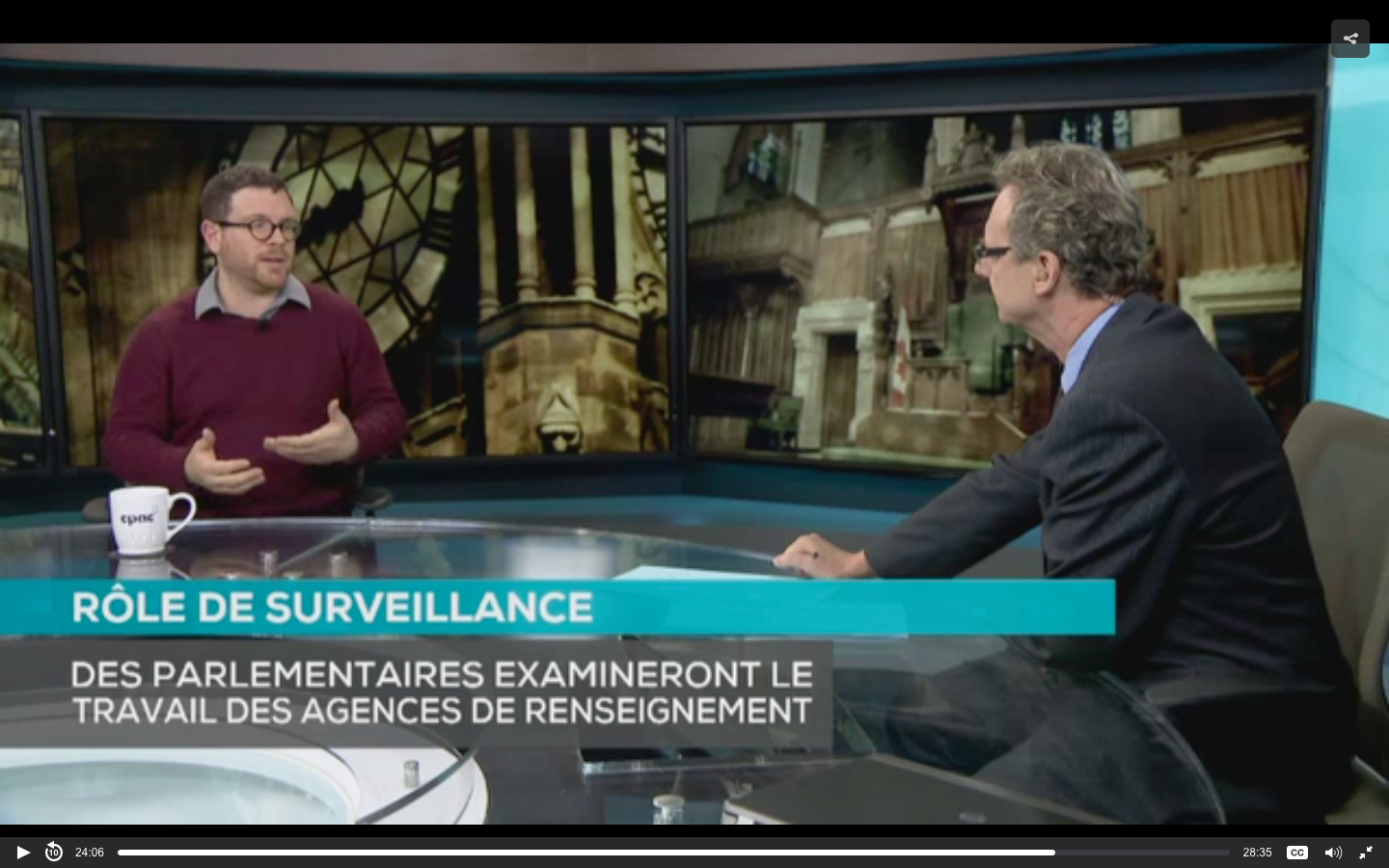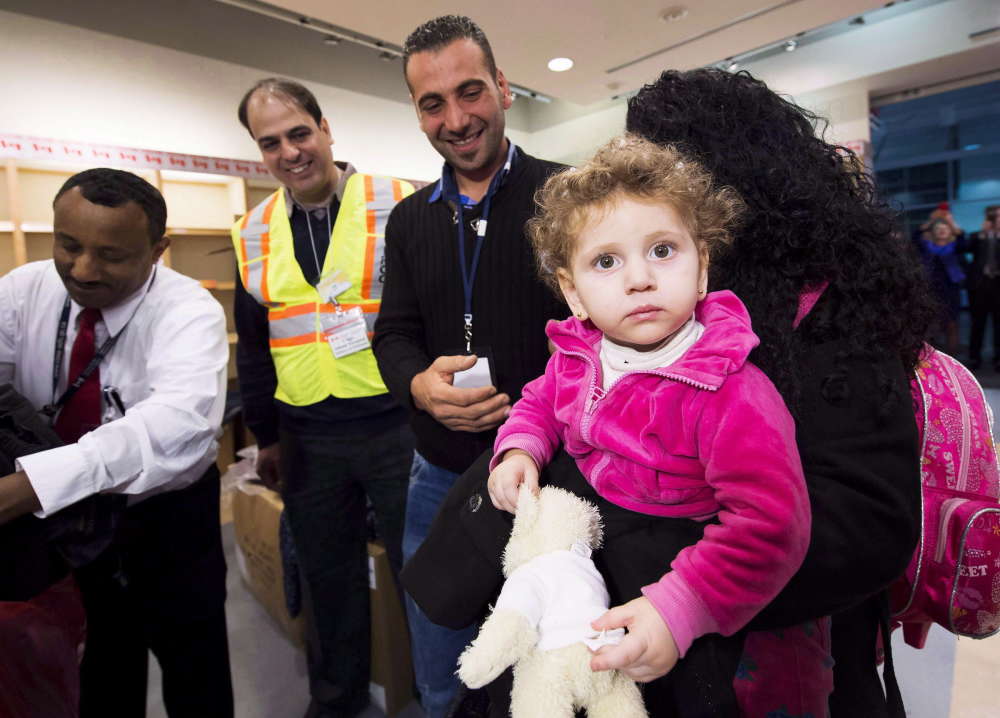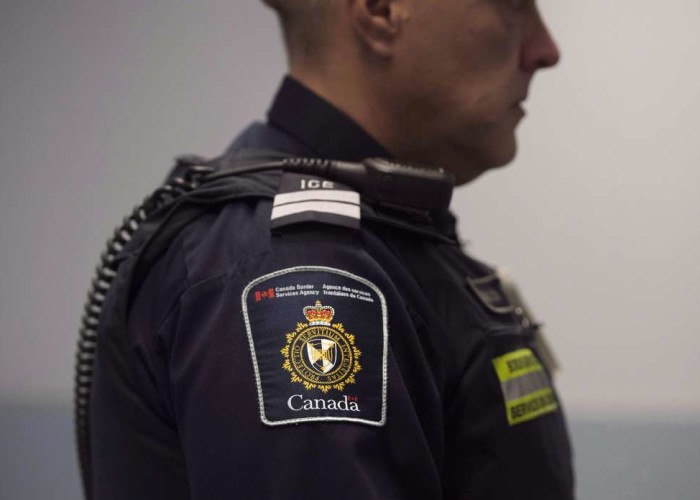Senators approve bill to fight foreign interference after voting down amendment, Jim Bronskill, The Canadian Press, 20 June 2024
Bill C-70: Trudeau’s latest assault on free speech, Dimitri Lascaris, Blog, 17 June 2024
Civil society groups argue ‘mad dash’ leaves no time for proper study of foreign influence registry bill, Jesse Cnockaert, The Hill Times, 17 June 2024
Civil liberties groups raise alarm as Ottawa votes on foreign-interference bill, Marieke Walsk & Kristy Kirkup, The Globe and Mail, 13 June 2024
Opposition to stampeding Bill C-70 through Parliament grows, John price, Canadian Dimension, 10 June 2024
Civil society groups urge to not rush the committee study of C-70, radio interview with Shaye Ganam on 630 CHED in Edmonton and QR Calgary – 770 AM, 7 June 2024
Don’t rush committee study of foreign interference bill, civil society groups urge, The Canadian Press, 6 June 2024
Liberal foreign interference bill includes some ‘good tools’ for RCMP: commissioner, Jim Bronskill, The Canadian Press, 7 May 2024
Data privacy as a human right must be recognized by privacy and AI bill, say advocates, Jesse Cnockaert, The Hill Times, 6 May 2024
Foreign influence registry among proposed tools in bill to counter interference, Jim Bronskill, The Canadian Press, 6 May 2024
Feds advance ideas to fight foreign interference, prompting support and concern, Jim Bronskill, The Canadian Press, 29 April 2024
Border agency eyes smartphone facial recognition system amid privacy concerns, The Canadian Press, 24 April 2024
AI bill ‘democratically illegitimate’ and litigation ‘likely’ without proper consultations, say AFN, civil society orgs, Stuart Benson, The Hill Times, 21 February 2024
Allow CSIS to share intelligence on security threats, business council asks Ottawa, Jim Bronskill, The Canadian Press, 19 January 2024
Civil liberties groups give C-27 failing grade, call for AIDA to be ‘reset and reworked’ separately
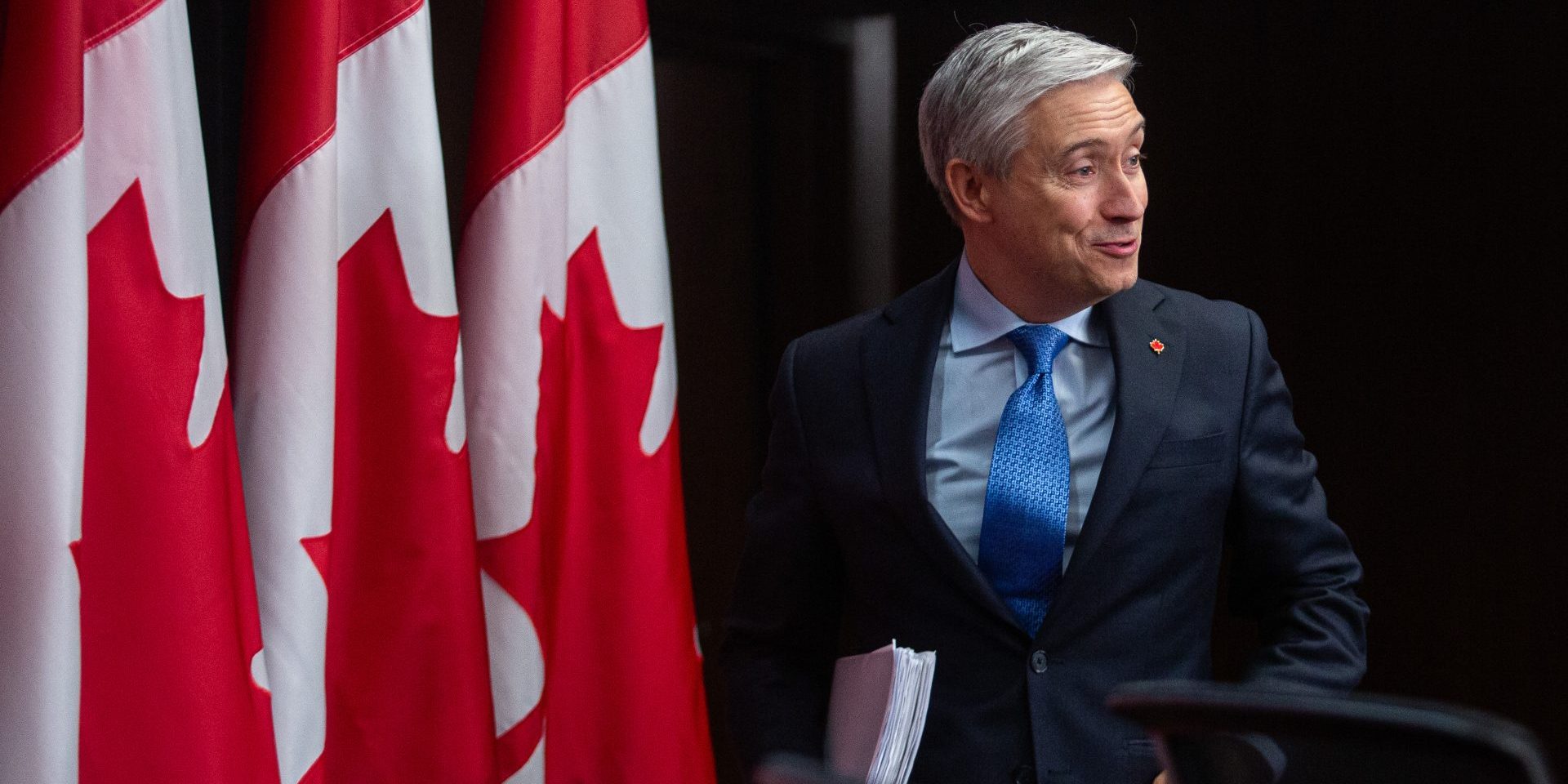 The Hill Times 08/11/2023 – Tim McSorley, the International Civil Liberties Monitoring Group’s (ICLMG) national co-ordinator, graded the current composition of the legislation as a two out of 10, but told The Hill Times that he was encouraged by the fact that many of the committee members, particularly those from opposition parties, shared many of the same concerns he and other witnesses expressed. McSorley explained that the ICLMG’s position, alongside the other civil liberties groups who testified before the committee, is that the government failed to sufficiently consult the public before introducing the AIDA, and that the best step would be to “reset and rework [the AIDA] separately,” from the remainder of the legislation. “We know that it’s not within the committee’s power to separate the bill, but we want the committee to make the strongest possible recommendations and amendments to the bill that they can,” McSorley added, noting that when the legislation eventually comes up for third reading, it will be voted on in three parts to pass the section on the CPPA, the AIDA, and PIPEDA separately. “Unless what comes out of committee comes anywhere close to answering our concerns, which we’re doubtful they’ll be able to accomplish, I wager that we’ll be raising the same concerns and imploring the government to act,” McSorley explained. “Barring that, we’ll be imploring the opposition parties to vote against the bill proceeding further.” Source
The Hill Times 08/11/2023 – Tim McSorley, the International Civil Liberties Monitoring Group’s (ICLMG) national co-ordinator, graded the current composition of the legislation as a two out of 10, but told The Hill Times that he was encouraged by the fact that many of the committee members, particularly those from opposition parties, shared many of the same concerns he and other witnesses expressed. McSorley explained that the ICLMG’s position, alongside the other civil liberties groups who testified before the committee, is that the government failed to sufficiently consult the public before introducing the AIDA, and that the best step would be to “reset and rework [the AIDA] separately,” from the remainder of the legislation. “We know that it’s not within the committee’s power to separate the bill, but we want the committee to make the strongest possible recommendations and amendments to the bill that they can,” McSorley added, noting that when the legislation eventually comes up for third reading, it will be voted on in three parts to pass the section on the CPPA, the AIDA, and PIPEDA separately. “Unless what comes out of committee comes anywhere close to answering our concerns, which we’re doubtful they’ll be able to accomplish, I wager that we’ll be raising the same concerns and imploring the government to act,” McSorley explained. “Barring that, we’ll be imploring the opposition parties to vote against the bill proceeding further.” Source
Civil Society Groups Outline Concerns with Federal Privacy Reform Bill
 CPAC 02/11/2023 – A coalition of civil society organizations hold a news conference in Ottawa about Bill C-27, the federal government’s Digital Implementation Act. The legislation aims to reform private-sector privacy laws and regulate artificial intelligence. Ahead of their appearance at the House of Commons Industry committee, the group outlines its concerns with the proposed legislation and calls for amendments to the bill in its current form. The bill passed second reading in the House of Commons in April. Speaking with reporters are Daniel Konikoff (Canadian Civil Liberties Association), Sharon Polsky (Privacy and Access Council of Canada), Tim McSorley (International Civil Liberties Monitoring Group), John Lawford (Public Interest Advocacy Centre), and Sam Andry (the Dais, Toronto Metropolitan University). Watch
CPAC 02/11/2023 – A coalition of civil society organizations hold a news conference in Ottawa about Bill C-27, the federal government’s Digital Implementation Act. The legislation aims to reform private-sector privacy laws and regulate artificial intelligence. Ahead of their appearance at the House of Commons Industry committee, the group outlines its concerns with the proposed legislation and calls for amendments to the bill in its current form. The bill passed second reading in the House of Commons in April. Speaking with reporters are Daniel Konikoff (Canadian Civil Liberties Association), Sharon Polsky (Privacy and Access Council of Canada), Tim McSorley (International Civil Liberties Monitoring Group), John Lawford (Public Interest Advocacy Centre), and Sam Andry (the Dais, Toronto Metropolitan University). Watch
Privacy bill fails to address dangers of facial recognition technology: coalition
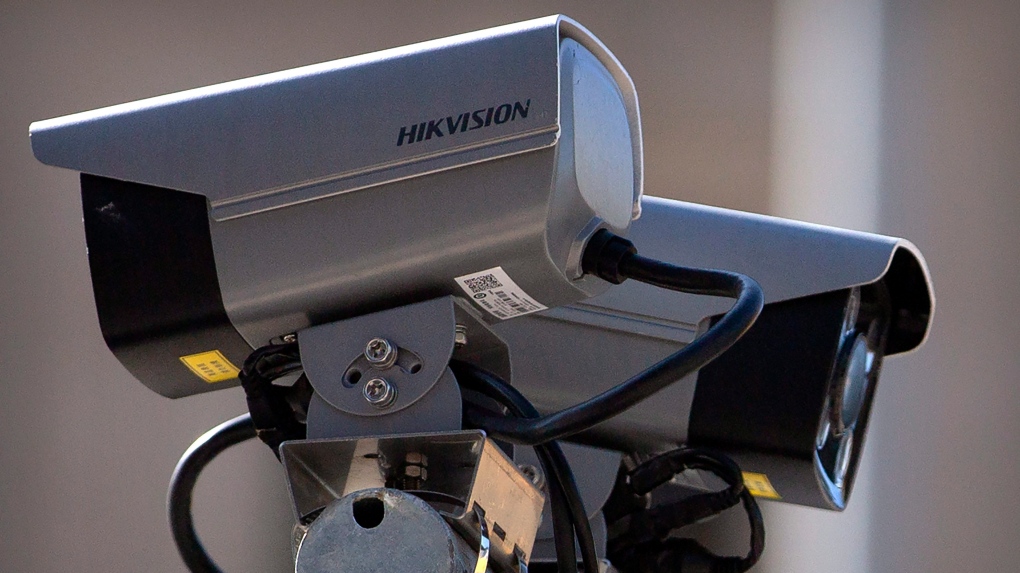 The Canadian Press 01/11/2023 – A coalition pushing for better regulation of facial recognition and other biometric surveillance technologies says proposed federal privacy legislation is in “dire need of significant amendments.” In an open letter Wednesday to Industry Minister Francois-Philippe Champagne, the Right2YourFace Coalition warns the use of facial recognition technology threatens human rights, equity principles and fundamental freedoms, including the right to privacy. […] The coalition says the technology can prompt biased or flawed results, creating a risk of false identifications. The letter is signed by representatives of the Canadian Civil Liberties Association, the International Civil Liberties Monitoring Group, the Privacy and Access Council of Canada and several others. Read more
The Canadian Press 01/11/2023 – A coalition pushing for better regulation of facial recognition and other biometric surveillance technologies says proposed federal privacy legislation is in “dire need of significant amendments.” In an open letter Wednesday to Industry Minister Francois-Philippe Champagne, the Right2YourFace Coalition warns the use of facial recognition technology threatens human rights, equity principles and fundamental freedoms, including the right to privacy. […] The coalition says the technology can prompt biased or flawed results, creating a risk of false identifications. The letter is signed by representatives of the Canadian Civil Liberties Association, the International Civil Liberties Monitoring Group, the Privacy and Access Council of Canada and several others. Read more
‘The devil’s in the details, and we don’t have any’: critics, civil liberties groups decry feds’ lack of clarity on changes to privacy and AI bill
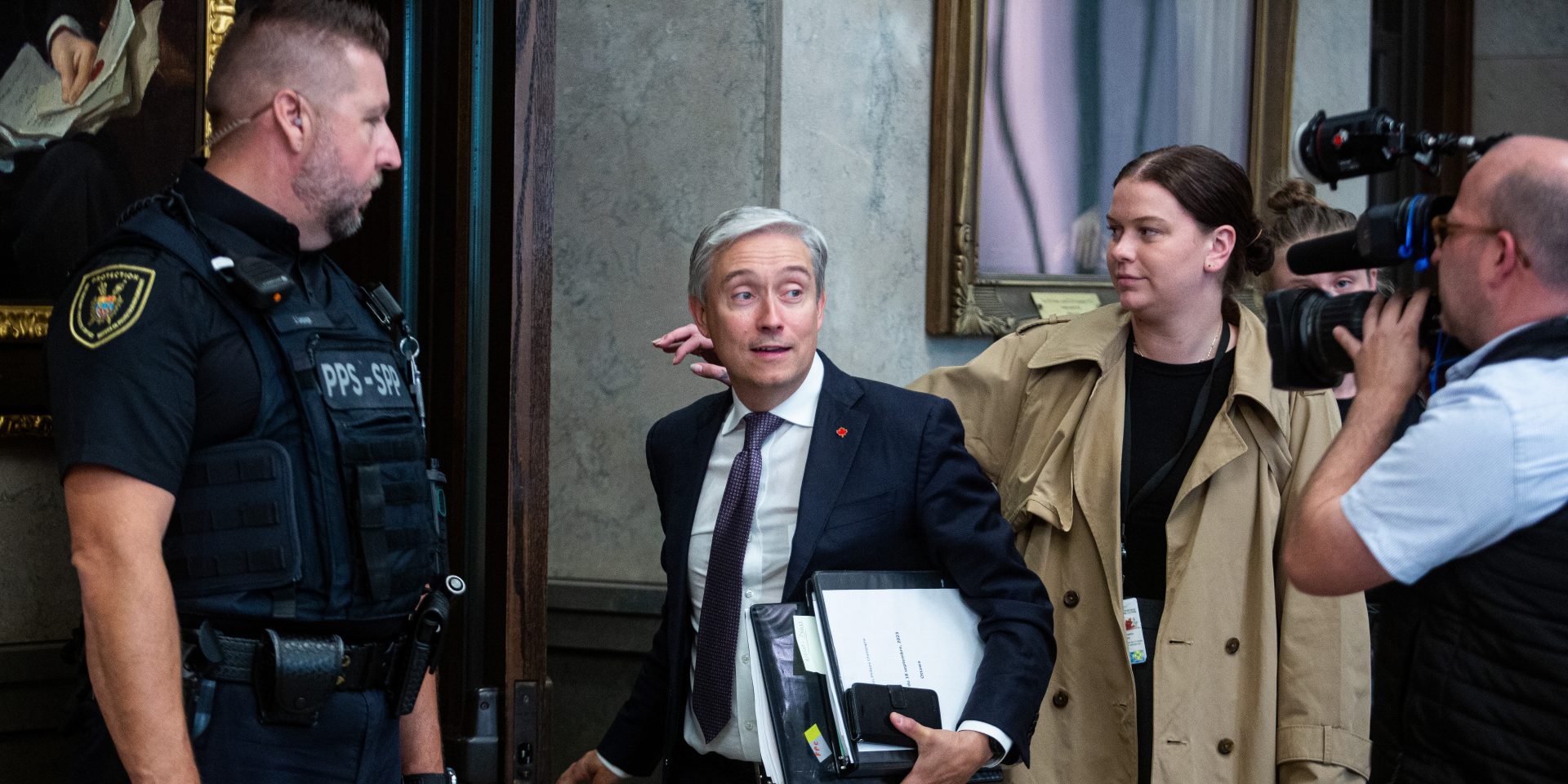 The Hill Times 04/10/2023 – Tim McSorley, national co-ordinator of the International Civil Liberties Monitoring Group (ICLMG), told The Hill Times that despite the amendments proposed by Champagne at the committee, ICLMG’s view that AIDA needs to be “withdrawn, reworked and reintroduced” as a separate piece of legislation from C-27 has not changed. On Sept. 25, the CCLA and ICLMG, alongside more than 40 other Canadian civil liberties organizations, experts, and academics, released an open letter addressed to Champagne outlining their main concerns with the current draft of AIDA. Specifically, the signatories say they are concerned that “shoehorning” AI regulation into Bill C-27 will not allow for adequate study of the AIDA, and will take time and attention away from the bill’s privacy provisions. The signatories also provided “bottom-line” changes to AIDA they believe will be needed, including recognizing privacy as a fundamental human right; a commitment to more active consultation with stakeholders “beyond industry leaders”; expanding AI regulation to apply to both the public and private sector, including government security agencies; and removing AI regulation from Innovation, Science, and Economic Development (ISED) Canada’s sole jurisdiction. While McSorley said he understands why AI regulation would be included in the innovation minister’s portfolio, the concerns civil liberties groups have with its current formulation are a symptom of the conflict between ISED’s mandate to promote industry, and the mandate to regulate it. Source
The Hill Times 04/10/2023 – Tim McSorley, national co-ordinator of the International Civil Liberties Monitoring Group (ICLMG), told The Hill Times that despite the amendments proposed by Champagne at the committee, ICLMG’s view that AIDA needs to be “withdrawn, reworked and reintroduced” as a separate piece of legislation from C-27 has not changed. On Sept. 25, the CCLA and ICLMG, alongside more than 40 other Canadian civil liberties organizations, experts, and academics, released an open letter addressed to Champagne outlining their main concerns with the current draft of AIDA. Specifically, the signatories say they are concerned that “shoehorning” AI regulation into Bill C-27 will not allow for adequate study of the AIDA, and will take time and attention away from the bill’s privacy provisions. The signatories also provided “bottom-line” changes to AIDA they believe will be needed, including recognizing privacy as a fundamental human right; a commitment to more active consultation with stakeholders “beyond industry leaders”; expanding AI regulation to apply to both the public and private sector, including government security agencies; and removing AI regulation from Innovation, Science, and Economic Development (ISED) Canada’s sole jurisdiction. While McSorley said he understands why AI regulation would be included in the innovation minister’s portfolio, the concerns civil liberties groups have with its current formulation are a symptom of the conflict between ISED’s mandate to promote industry, and the mandate to regulate it. Source
Canadian groups call for more careful consideration of artificial intelligence measures
 The Canadian Press 25/09/2023 – Dozens of civil society organizations, experts and academics are calling on the Liberal government to remove proposed measures on artificial intelligence from a federal privacy bill, saying they must be considered separately. The Liberals introduced privacy legislation last year to give Canadians more control over how their personal data is used by commercial entities, impose fines for non-compliant organizations and introduce new rules for the use of artificial intelligence. The groups and experts say in an open letter to Innovation Minister Francois-Philippe Champagne that the artificial intelligence section of the bill fails to protect the rights and freedoms of people from the risks of AI. […] Among the groups to sign the letter were the B.C. Civil Liberties Association, the Canadian Civil Liberties Association, the International Civil Liberties Monitoring Group, OpenMedia and the Public Interest Advocacy Centre. Read more + Global News + IT World Canada
The Canadian Press 25/09/2023 – Dozens of civil society organizations, experts and academics are calling on the Liberal government to remove proposed measures on artificial intelligence from a federal privacy bill, saying they must be considered separately. The Liberals introduced privacy legislation last year to give Canadians more control over how their personal data is used by commercial entities, impose fines for non-compliant organizations and introduce new rules for the use of artificial intelligence. The groups and experts say in an open letter to Innovation Minister Francois-Philippe Champagne that the artificial intelligence section of the bill fails to protect the rights and freedoms of people from the risks of AI. […] Among the groups to sign the letter were the B.C. Civil Liberties Association, the Canadian Civil Liberties Association, the International Civil Liberties Monitoring Group, OpenMedia and the Public Interest Advocacy Centre. Read more + Global News + IT World Canada
Judge expresses sympathy, but rules audit of Muslim charity should run its course
:format(jpeg)/cloudfront-us-east-1.images.arcpublishing.com/tgam/J734BB6ILZOJXB7EPA645TKHUI.jpg)
The Canadian Press14/09/2023 – While applauding elements of the court ruling, the association is considering an appeal, saying Thursday the decision places Canadians at the mercy of potentially biased government action. The court ruling comes amid public scrutiny of the Review and Analysis Division of the revenue agency’s charities directorate, which is conducting the audit. A 2021 report by the Ottawa-based International Civil Liberties Monitoring Group said the division works with national security agencies to carry out such audits, with little accountability or independent review. […] The court’s decision “to recognize the inherent bias and prejudice against the Muslim community in the audit validates our long-held concerns,” Sharaf Sharafeldin, a senior MAC representative, said Thursday. “It underscores the urgent need for reform.” However, he added, the association is disappointed by the court’s choice not to address these violations immediately. “We remain committed to pursuing justice and ensuring that the rights of Canadian Muslims are respected.” Read more
MPs call for sanctions on foreign aggressors targeting Canada with disinformation
 The Canadian Press 26/06/2023 – The House of Commons defence committee is urging the Liberal government to levy sanctions against individuals and organizations who target Canadians with disinformation. In a new report calling for stronger cybersecurity defences, the committee warns of increasingly sophisticated disinformation and foreign influence campaigns by China, Russia and other aggressors. […] Nowhere in the report is there discussion of why the CSIS recommendation is needed or that this is even a concern, said Tim McSorley, national co-ordinator of the International Civil Liberties Monitoring Group. “Once again, we’re seeing national security creep — recommendations that national security agencies be granted new powers despite the lack of public evidence that they are necessary,” he said. There is a “severe transparency deficit” in how Canada approaches cybersecurity, he added. “This kind of recommendation won’t do anything to resolve that.” McSorley, who testified at the committee, said it’s worrisome that human rights issues did not figure more prominently in the resulting report. “Even more stark is that there is not a single recommendation around ensuring that rights protections are explicitly taken into account in the government’s response to cyberthreats, whether in regards to Charter rights or to Canada’s international human rights and civil liberty obligations.” Read more
The Canadian Press 26/06/2023 – The House of Commons defence committee is urging the Liberal government to levy sanctions against individuals and organizations who target Canadians with disinformation. In a new report calling for stronger cybersecurity defences, the committee warns of increasingly sophisticated disinformation and foreign influence campaigns by China, Russia and other aggressors. […] Nowhere in the report is there discussion of why the CSIS recommendation is needed or that this is even a concern, said Tim McSorley, national co-ordinator of the International Civil Liberties Monitoring Group. “Once again, we’re seeing national security creep — recommendations that national security agencies be granted new powers despite the lack of public evidence that they are necessary,” he said. There is a “severe transparency deficit” in how Canada approaches cybersecurity, he added. “This kind of recommendation won’t do anything to resolve that.” McSorley, who testified at the committee, said it’s worrisome that human rights issues did not figure more prominently in the resulting report. “Even more stark is that there is not a single recommendation around ensuring that rights protections are explicitly taken into account in the government’s response to cyberthreats, whether in regards to Charter rights or to Canada’s international human rights and civil liberty obligations.” Read more
Government powers under Canada’s proposed cybersecurity law should be limited: Rights groups
 IT World Canada 20/06/2023 – Parliament must limit government powers over the private sector in the proposed Canadian cybersecurity legislation, say several civil rights groups, arguing the current version risks eroding civil liberties, privacy, and democratic freedoms. The call came today from the Canadian Civil Liberties Association, the Canadian Constitution Foundation, the International Civil Liberties Monitoring Group, Ligue des Droits et Libertés, the National Council of Canadian Muslims, OpenMedia, and the Privacy and Access Council of Canada. “We can address Canada’s cybersecurity needs, while upholding our rights and freedoms,” the group said in a statement accompanying detailed recommendations for fixing the Liberal government’s proposed cybersecurity legislation, Bill C-26. Read more
IT World Canada 20/06/2023 – Parliament must limit government powers over the private sector in the proposed Canadian cybersecurity legislation, say several civil rights groups, arguing the current version risks eroding civil liberties, privacy, and democratic freedoms. The call came today from the Canadian Civil Liberties Association, the Canadian Constitution Foundation, the International Civil Liberties Monitoring Group, Ligue des Droits et Libertés, the National Council of Canadian Muslims, OpenMedia, and the Privacy and Access Council of Canada. “We can address Canada’s cybersecurity needs, while upholding our rights and freedoms,” the group said in a statement accompanying detailed recommendations for fixing the Liberal government’s proposed cybersecurity legislation, Bill C-26. Read more
CRA persecution of Muslim charities counterproductive to anti-radicalization
Navaid Aziz, National Post, 26 May 2023
Legalized immorality: the scapegoating of Hassan Diab
Judy Dench, Canadian Dimension, 17 May 2023
‘A chilling effect’: Muslim charities fall prey to Canada’s double standards
Umar A Farooq, Middle East Eye, 25 April 2023
Civil society groups call on feds to protect privacy, free expression in imminent online harms bill
Aidan Macnab, Canadian Lawyer Magazine, 24 April 2023
Charities find loopholes in ‘broken’ terror laws to help Afghans as MPs study bill
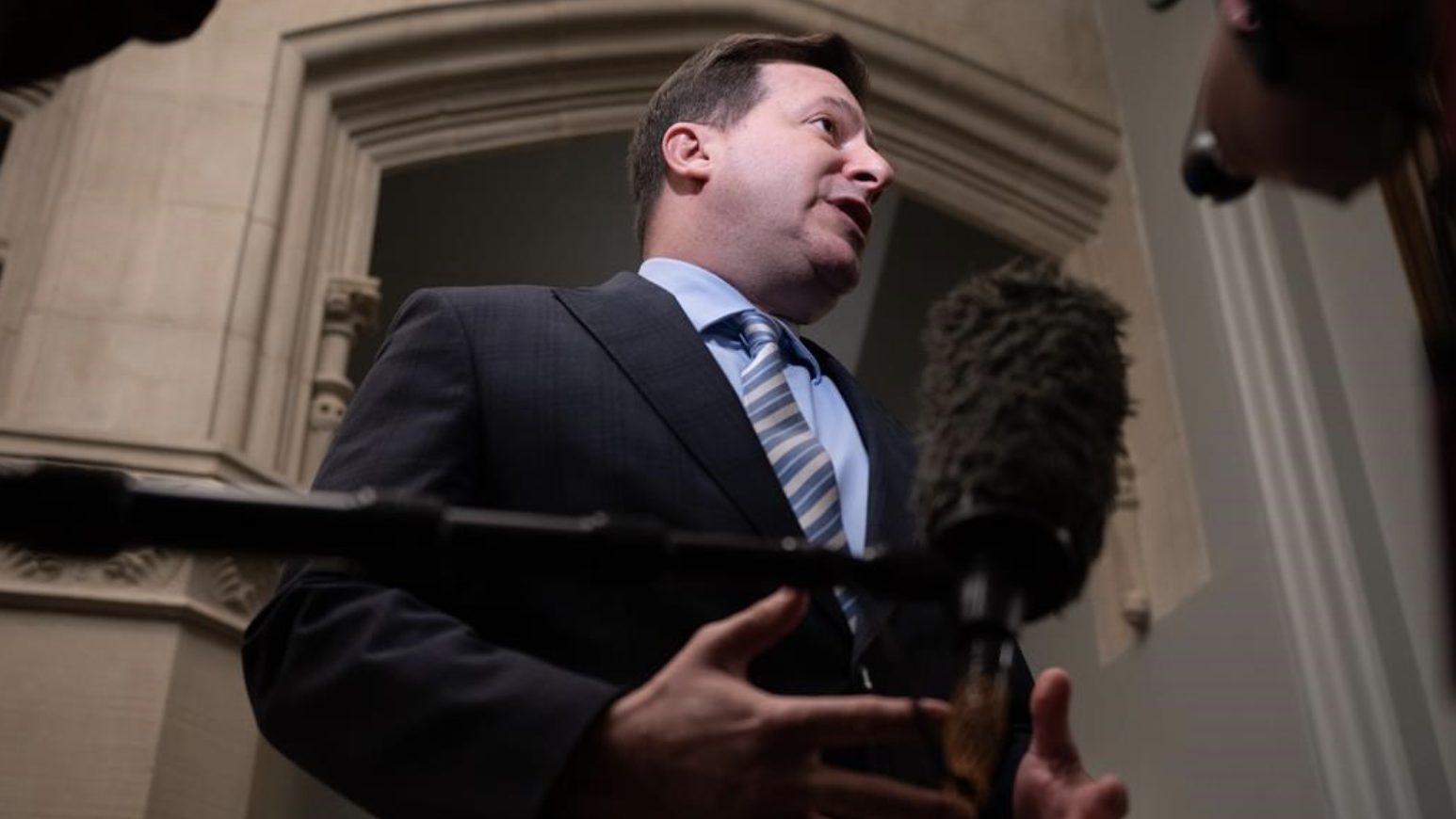 The Canadian Press 19/04/2023 – Charities say Global Affairs Canada warned them a year ago that purchasing goods or hiring locals would involve paying taxes to the Taliban and put them at risk of prosecution for financially supporting a terror group. The Liberals have tabled a bill that would enact a system in which groups can apply for exemptions, unlike numerous allies who have issued blanket exemptions. Yet Doctors Without Borders revealed Wednesday that they’ve already been operating in Afghanistan using Canadian donations, believing that international humanitarian law covers the work they’re doing. “It is possible to do this, and a lot of other organizations and states behind those organizations are moving in that direction,” said the group’s Canadian executive director, Joseph Belliveau. […] In a written brief, the International Civil Liberties Monitoring Group argued Canada should get at the root of the problem by narrowing the scope of its terrorism laws. Read more
The Canadian Press 19/04/2023 – Charities say Global Affairs Canada warned them a year ago that purchasing goods or hiring locals would involve paying taxes to the Taliban and put them at risk of prosecution for financially supporting a terror group. The Liberals have tabled a bill that would enact a system in which groups can apply for exemptions, unlike numerous allies who have issued blanket exemptions. Yet Doctors Without Borders revealed Wednesday that they’ve already been operating in Afghanistan using Canadian donations, believing that international humanitarian law covers the work they’re doing. “It is possible to do this, and a lot of other organizations and states behind those organizations are moving in that direction,” said the group’s Canadian executive director, Joseph Belliveau. […] In a written brief, the International Civil Liberties Monitoring Group argued Canada should get at the root of the problem by narrowing the scope of its terrorism laws. Read more
Review into Canada Revenue Agency bias has let down Canadian Muslims
Sarah Mushtaq, National Post, 6 April 2023
Muslim charity alleges systemic bias in bid to halt revenue agency’s ‘tainted’ audit
The Canadian Press, 3 April 2023
Podcast: Federal government’s proposed AI and Data Act deeply flawed
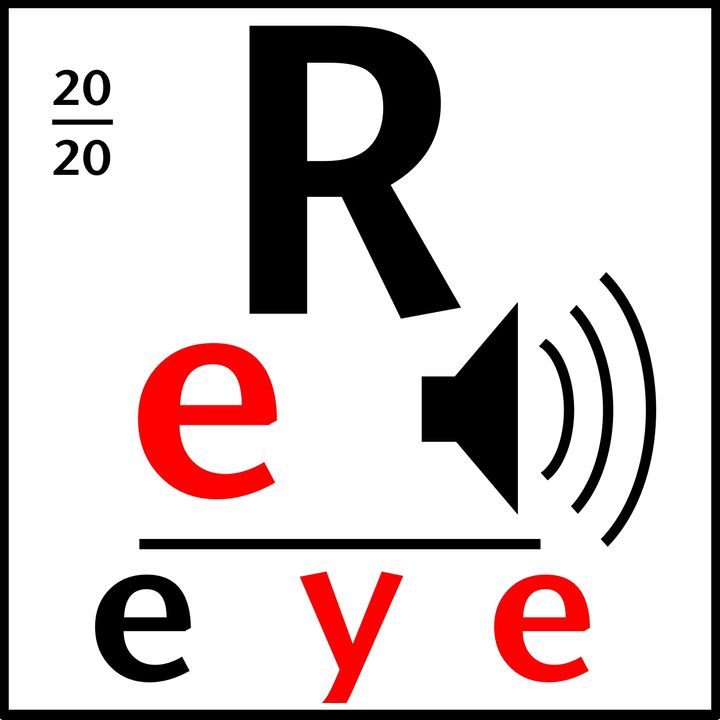 RedEye 02/04/2023 – Leading privacy, technology and civil liberties experts are urging Canadian Members of Parliament to vote against the federal government’s proposed Artificial Intelligence and Data Act which would regulate AI. Signatories to an open letter say the proposed legislation is flawed beyond repair. We speak with Tim McSorley, national coordinator of the ICLMG. Source
RedEye 02/04/2023 – Leading privacy, technology and civil liberties experts are urging Canadian Members of Parliament to vote against the federal government’s proposed Artificial Intelligence and Data Act which would regulate AI. Signatories to an open letter say the proposed legislation is flawed beyond repair. We speak with Tim McSorley, national coordinator of the ICLMG. Source
Non-profit organizations call on government to protect Muslim charities
The Canadian Press, 30 March 2023
CBC Listen: Taking a closer look at Canada’s spy agency, CSIS, with ICLMG
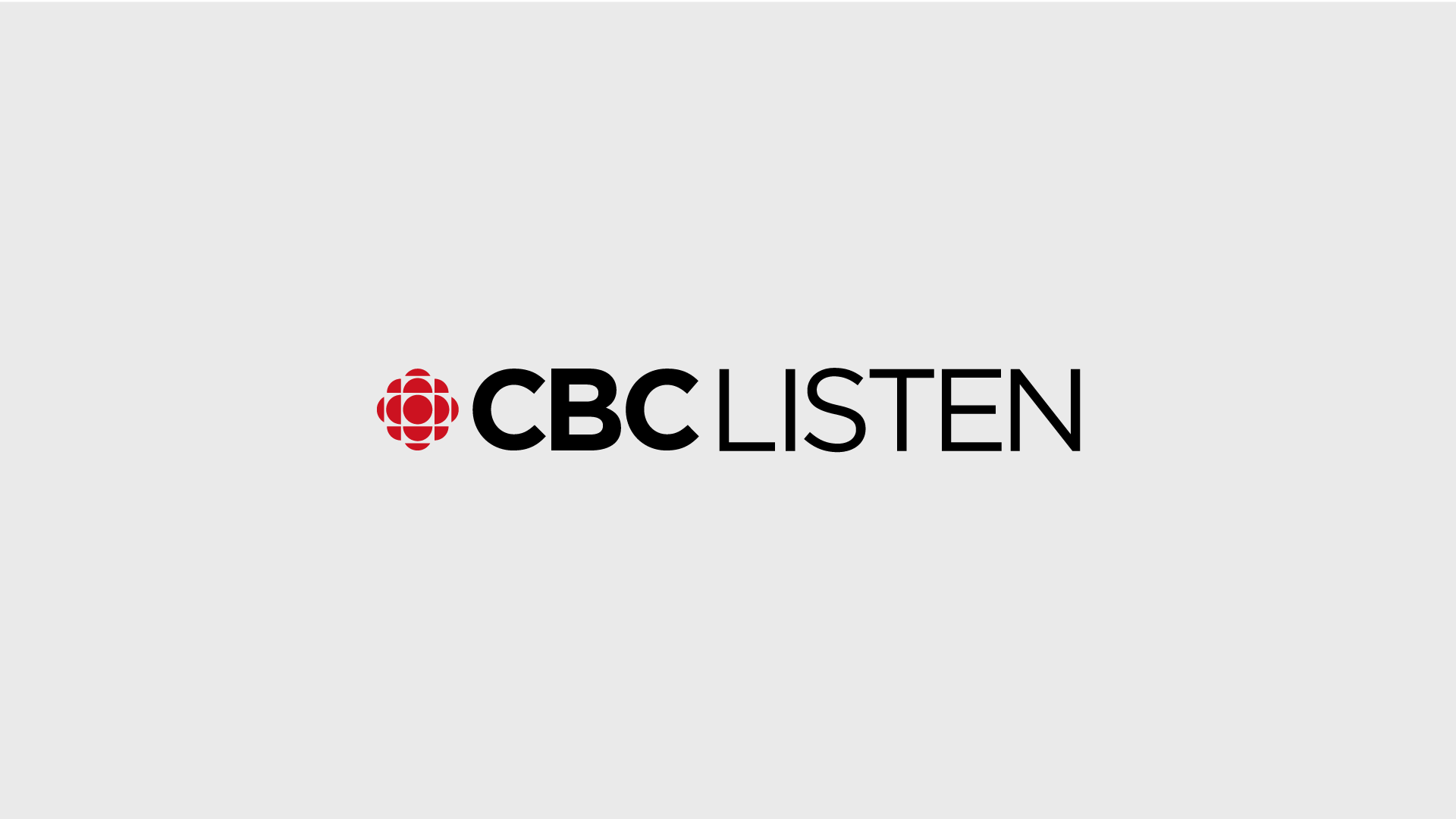 The Early Edition with Stephen Quinn 27/02/2023 – The flurry of leaked intelligence reports about alleged Chinese state interference in Canada’s federal elections has raised some questions about how Canada’s spy agency – CSIS – operates. CBC interviews ICLMG’s National Coordinator, Tim McSorley. Source
The Early Edition with Stephen Quinn 27/02/2023 – The flurry of leaked intelligence reports about alleged Chinese state interference in Canada’s federal elections has raised some questions about how Canada’s spy agency – CSIS – operates. CBC interviews ICLMG’s National Coordinator, Tim McSorley. Source
Ottawa asks court to dismiss ruling directing it to repatriate 4 men detained in Syria
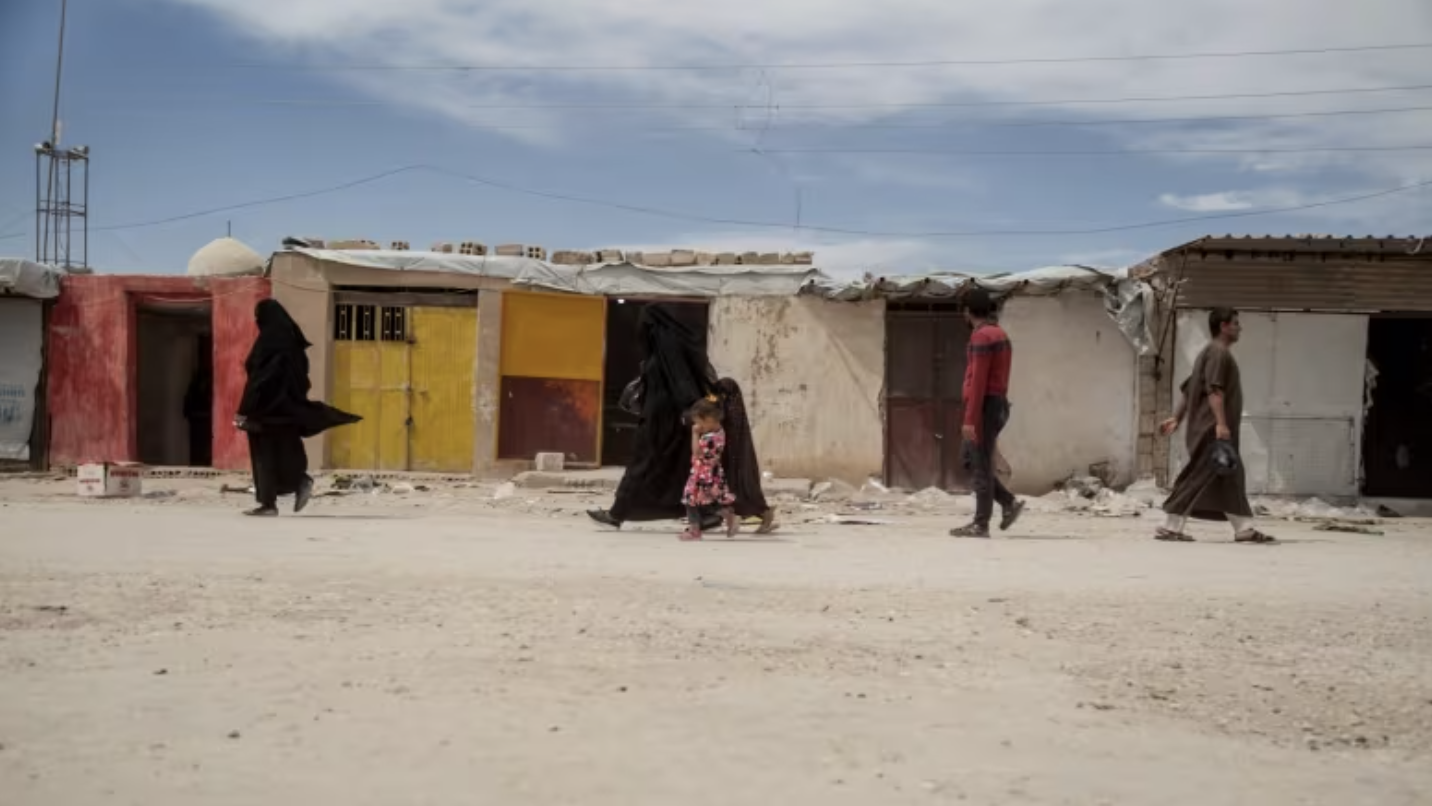 CBC News 27/03/2023 – At the centre of the appeal is Federal Court Justice Henry Brown’s decision in January that ruled the four men detained in Kurdish prisons were entitled to have the federal government make a formal request for their release “as soon as reasonably possible.” The appeal will determine whether the Canadian government is under a legal obligation to repatriate. The International Civil Liberties Monitoring Group sent an open letter to Prime Minister Justin Trudeau on Monday calling on the government to “honour” the Federal Court ruling and repatriate the Canadians “arbitrarily detained.” The letter is signed by more than 100 members of the Canadian legal community, including former minister of justice Allan Rock and multiple human rights advocates, national security experts and lawyers, according to a press release. Read more
CBC News 27/03/2023 – At the centre of the appeal is Federal Court Justice Henry Brown’s decision in January that ruled the four men detained in Kurdish prisons were entitled to have the federal government make a formal request for their release “as soon as reasonably possible.” The appeal will determine whether the Canadian government is under a legal obligation to repatriate. The International Civil Liberties Monitoring Group sent an open letter to Prime Minister Justin Trudeau on Monday calling on the government to “honour” the Federal Court ruling and repatriate the Canadians “arbitrarily detained.” The letter is signed by more than 100 members of the Canadian legal community, including former minister of justice Allan Rock and multiple human rights advocates, national security experts and lawyers, according to a press release. Read more
Watchdog couldn’t probe charity bias allegations ‘deeply enough’ due to lack of info
Jim Bronskill, The Canadian Press, 27 March 2023
The problem of systemic bias in CRA audits
Faisal Kutty and Faisal Bhabha, The Philanthropist Journal, 27 March 2023
Civil liberties groups call for immediate moratorium on ‘prejudiced audits’ of Muslim charities pending NSIRA review
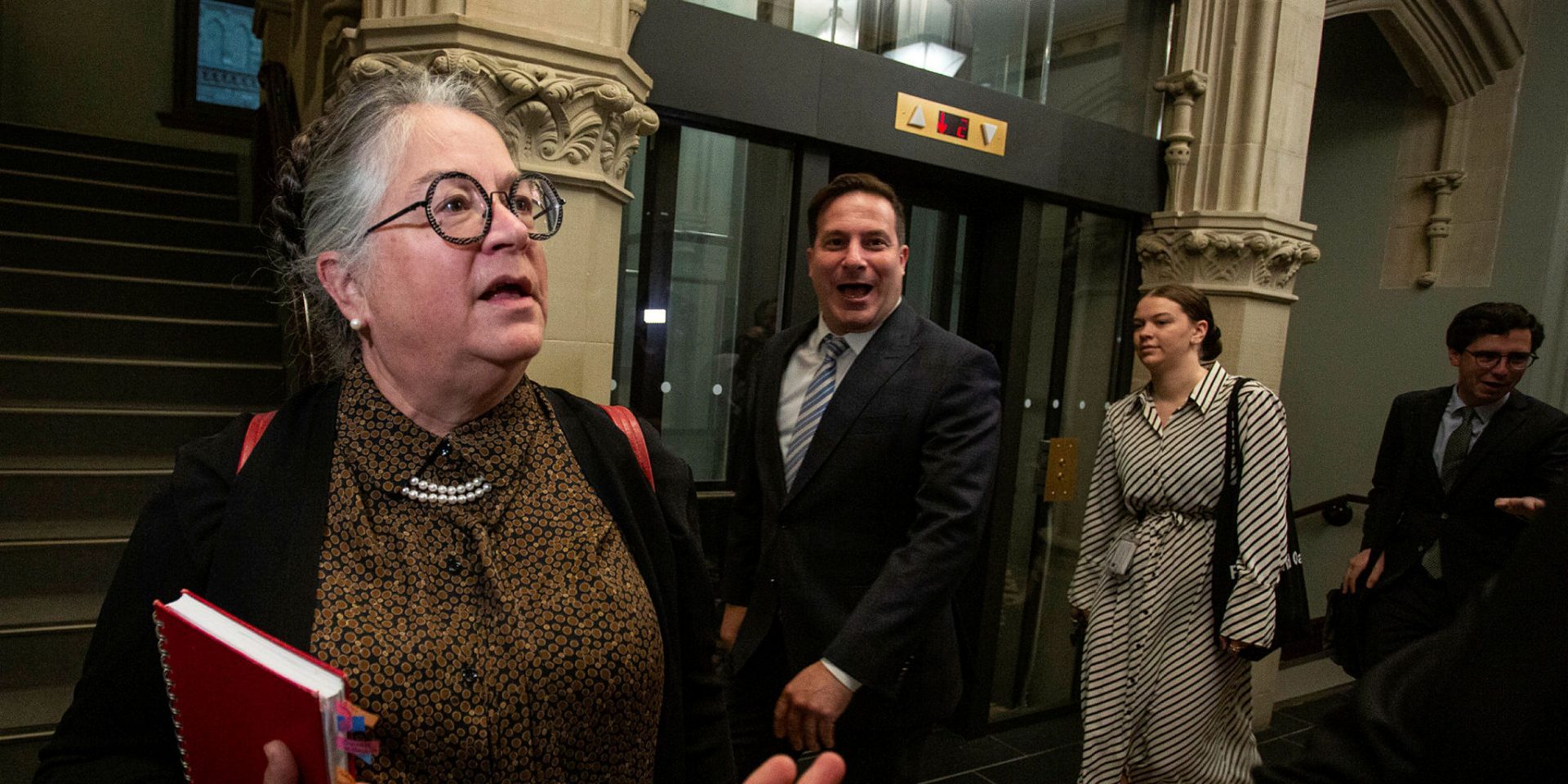 The Hill Times 21/03/2023 – A similar study by the International Civil Liberties Monitoring Group (ICLMG), published the same month as the NCCM’s 2021 report, also called for an assessment of the CRA’s processes and called for National Revenue Minister Diane Lebouthillier to declare an immediate moratorium on the “targeted audits” of Muslim charities until the review is completed. […] Tim McSorley, the national co-ordinator of ICLMG, told The Hill Times that while he welcomes the NSIRA review, it shouldn’t be used by the government to delay action, as the reports by his organization and NCCM already provide “ample evidence of systemic discrimination” within RAD’s processes. He said the division’s reliance on the National Risk Assessment in its approach to countering terrorist financing is “deeply problematic.” Source
The Hill Times 21/03/2023 – A similar study by the International Civil Liberties Monitoring Group (ICLMG), published the same month as the NCCM’s 2021 report, also called for an assessment of the CRA’s processes and called for National Revenue Minister Diane Lebouthillier to declare an immediate moratorium on the “targeted audits” of Muslim charities until the review is completed. […] Tim McSorley, the national co-ordinator of ICLMG, told The Hill Times that while he welcomes the NSIRA review, it shouldn’t be used by the government to delay action, as the reports by his organization and NCCM already provide “ample evidence of systemic discrimination” within RAD’s processes. He said the division’s reliance on the National Risk Assessment in its approach to countering terrorist financing is “deeply problematic.” Source
Intelligence watchdog investigating CRA following Islamophobia claims
Catherine Tunney, CBC News, 14 March 2023
Government agency for monitoring social media could be legacy of Emergencies Act report
 The National Post 28/02/2023 – The final report from the Public Order Emergency Commission recommended the federal government look into “whether a department or agency of government should have the authority and responsibility to monitor and report on information contained in social media.” Justice Paul Rouleau was looking into the invocation of the Emergencies Act by the Liberal government in response to the Freedom Convoy protests, and released the final report on Feb. 17. “Tim McSorley, national co-ordinator of the International Civil Liberties Monitoring Group, said “the biggest red flag” of the Rouleau recommendation is that “it’s kind of putting the cart before the horse.” He said there’s a need to have a discussion about “how publicly available information and information on social media is already being used before we can really consider what the impacts would be.” Read more
The National Post 28/02/2023 – The final report from the Public Order Emergency Commission recommended the federal government look into “whether a department or agency of government should have the authority and responsibility to monitor and report on information contained in social media.” Justice Paul Rouleau was looking into the invocation of the Emergencies Act by the Liberal government in response to the Freedom Convoy protests, and released the final report on Feb. 17. “Tim McSorley, national co-ordinator of the International Civil Liberties Monitoring Group, said “the biggest red flag” of the Rouleau recommendation is that “it’s kind of putting the cart before the horse.” He said there’s a need to have a discussion about “how publicly available information and information on social media is already being used before we can really consider what the impacts would be.” Read more
Identity crisis
Chris Kitching, Winnipeg Free Press, 9 February 2023
Hassan Diab, trial in absentia
Paul Weinberg, Rabble.ca, 7 Feb 2023
2022 Islamophobia In Review: Canada
Mobashra Tazamal, Bridge Initiative, Georgetown University, 29 Dec 2022
CSIS failed to fully consider human toll when disrupting threats, watchdog says
 The Canadian Press, CTV News and many more 18/02/2023 – A new report from the federal spy watchdog says the Canadian Security Intelligence Service failed to adequately consider the potentially serious adverse effects on people and their families when using its powers to disrupt potential threats. The National Security and Intelligence Review Agency report also finds the spy service takes an “overly narrow” approach when determining whether a judicial warrant is required for a particular threat disruption measure. Eight years ago, Parliament passed legislation allowing CSIS to go beyond its traditional role of gathering information about espionage and terrorism to actively derailing suspected schemes. For instance, the disruption powers could permit CSIS to thwart travel plans, cancel bank transactions or covertly interfere with radical websites. The Ottawa-based International Civil Liberties Monitoring Group said the review agency’s findings show CSIS cannot be trusted to follow the law or the Charter of Rights and Freedoms when it is granted secret powers to disrupt the lives of Canadians. Read more
The Canadian Press, CTV News and many more 18/02/2023 – A new report from the federal spy watchdog says the Canadian Security Intelligence Service failed to adequately consider the potentially serious adverse effects on people and their families when using its powers to disrupt potential threats. The National Security and Intelligence Review Agency report also finds the spy service takes an “overly narrow” approach when determining whether a judicial warrant is required for a particular threat disruption measure. Eight years ago, Parliament passed legislation allowing CSIS to go beyond its traditional role of gathering information about espionage and terrorism to actively derailing suspected schemes. For instance, the disruption powers could permit CSIS to thwart travel plans, cancel bank transactions or covertly interfere with radical websites. The Ottawa-based International Civil Liberties Monitoring Group said the review agency’s findings show CSIS cannot be trusted to follow the law or the Charter of Rights and Freedoms when it is granted secret powers to disrupt the lives of Canadians. Read more
RCMP declines to probe forged documents implicating Muslim charity in terrorist-related funding
Robert Fife and Steven Chase, The Globe and Mail, 22 Dec 2023
If the CRA is targeting Muslim-led charities, Canadians deserve to know
Alex Neve and Leilani Farha, The Globe and Mail, 20 Dec 2023
Inquiry possible into [possibly] forged papers sent to Muslim charity, Trudeau says
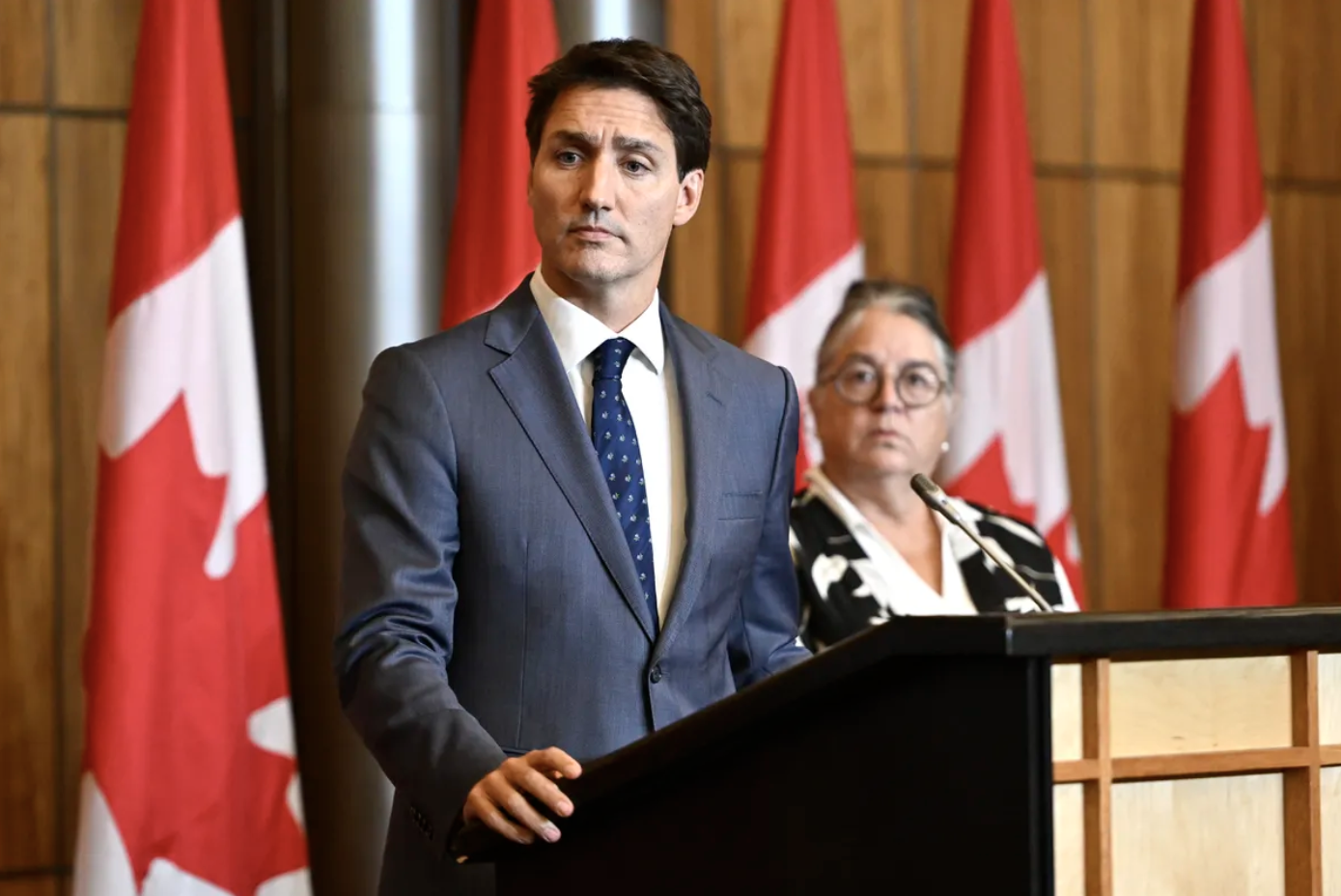
The Globe and Mail 16/12/2022 – Prime Minister Justin Trudeau says he is open to pursuing an independent investigation into [possibly] forged government documents that suggest the RCMP and the Canada Revenue Agency are paying informants within the Muslim Association of Canada to build a terrorist-funding case against the grassroots charity. Although the evidence that the documents are fake is overwhelming [according to the Globe and Mail], MAC remains skeptical that they didn’t originate inside the government, and is calling for an independent inquiry. […] The International Civil Liberties Monitoring Group (ICLMG) weighed in on Thursday, saying the “troubling allegations” of possible government targeting of MAC require further investigation byan independent party. “Whether this is a hoax or not, the unfortunate reality is that we know Muslim Canadians and Muslim organizations have been targets for surveillance and criminalization under the guise of counterterrorism driven by systemic Islamophobia and racism. It is important that the government take this issue seriously and act on it quickly,” ICLMG national co-ordinator Tim McSorley said in a statement. Source
Mazigh: Why is the Canadian government still targeting Muslim charities?
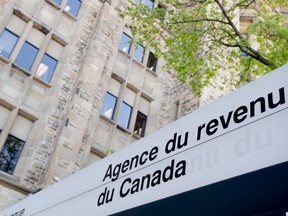 The Ottawa Citizen 13/12/2023 – In 2021, the International Civil Liberties Monitoring Group and the University of Toronto Institute of Islamic Studies released separate reports revealing anti-Muslim prejudice in the selection, execution and outcomes of CRA audits. Responding to these troubling findings, some Muslim groups called for a moratorium on the audits, and insisted on a complete review of the systematic Islamophobia allegations by the National Security Intelligence Review Agency (NSIRA), an independent expert review body for all national security and intelligence activities. It is worth noting that much of this is tied to the Department of Finance’s 2015 National Risk Assessment (NRA) framework, which instructs national security agencies to view Muslim-like groups, and racialized communities in general, as the highest risk of terrorism financing — very clearly creating a fertile ground for targeting Muslim-led charities. Read more
The Ottawa Citizen 13/12/2023 – In 2021, the International Civil Liberties Monitoring Group and the University of Toronto Institute of Islamic Studies released separate reports revealing anti-Muslim prejudice in the selection, execution and outcomes of CRA audits. Responding to these troubling findings, some Muslim groups called for a moratorium on the audits, and insisted on a complete review of the systematic Islamophobia allegations by the National Security Intelligence Review Agency (NSIRA), an independent expert review body for all national security and intelligence activities. It is worth noting that much of this is tied to the Department of Finance’s 2015 National Risk Assessment (NRA) framework, which instructs national security agencies to view Muslim-like groups, and racialized communities in general, as the highest risk of terrorism financing — very clearly creating a fertile ground for targeting Muslim-led charities. Read more
‘More to do’ on systemic barriers facing Muslim charities, Justin Trudeau acknowledges
Jim Bronskill, The Canadian Press, 7 Dec 2022
ICLMG’s Tim McSorley: Canada’s persecution of Muslim charities must stop
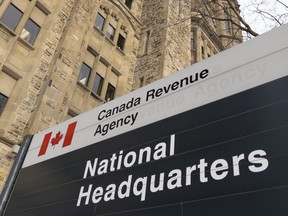 The National Post, 5 Dec 2022 – The ongoing hearings of the Senate’s standing committee on human rights has confirmed years of allegations that the Canada Revenue Agency (CRA) has been disproportionately targeting Muslim charities, and has raised troubling questions regarding the government’s own investigation into the issue. […] In fact, in recent stunning testimony before the Senate committee on human rights, the ombudsperson went further, saying that key aspects of his review of this issue — mandated to him to great fanfare by the prime minister and finance minister — are being hindered due to a lack of access to information. He agreed with a senator who noted that he seems to be “working with one hand tied behind his back.” […] The ICLMG and others in the charitable sector have called for an immediate review of the CRA and RAD’s work, ideally by the National Security and Intelligence Review Agency, accompanied by a moratorium on audits of Muslim charities by RAD. If Prime Minister Justin Trudeau stands by his promise to take this matter seriously, it is now time for him to act. Read more
The National Post, 5 Dec 2022 – The ongoing hearings of the Senate’s standing committee on human rights has confirmed years of allegations that the Canada Revenue Agency (CRA) has been disproportionately targeting Muslim charities, and has raised troubling questions regarding the government’s own investigation into the issue. […] In fact, in recent stunning testimony before the Senate committee on human rights, the ombudsperson went further, saying that key aspects of his review of this issue — mandated to him to great fanfare by the prime minister and finance minister — are being hindered due to a lack of access to information. He agreed with a senator who noted that he seems to be “working with one hand tied behind his back.” […] The ICLMG and others in the charitable sector have called for an immediate review of the CRA and RAD’s work, ideally by the National Security and Intelligence Review Agency, accompanied by a moratorium on audits of Muslim charities by RAD. If Prime Minister Justin Trudeau stands by his promise to take this matter seriously, it is now time for him to act. Read more
Taxpayer Ombudsperson goes public over impasse with CRA over Muslim charity audits
Bill Curry, The Globe and Mail, 5 Dec 2022
Mother of Canadian detained in Syria accuses of Ottawa of shirking duty to help
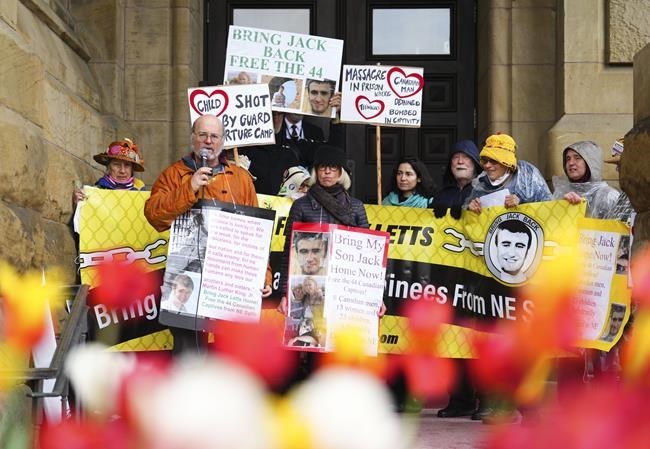
The Canadian Press 15/11/2022 – A handful of women and children have returned to Canada from the region in recent years. But Canada has, for the most part, not followed the path of other countries that have successfully repatriated citizens. The federal government has said Canada’s ability to provide consular assistance in Syria is extremely limited given the volatile security situation — a stance that critics have consistently challenged. “These Canadians must be brought home,” Tim McSorley, national co-ordinator of the International Civil Liberties Monitoring Group, said during the news conference. “There are no clear answers as to why the government isn’t acting. It’s an issue of political will.” Several families have turned to the Federal Court, saying the government’s refusal to step in breaches the Charter of Rights and Freedoms. Read more
MPs to review Canada’s extradition system in coming justice committee hearings
The Canadian Press 14/11/2022 – 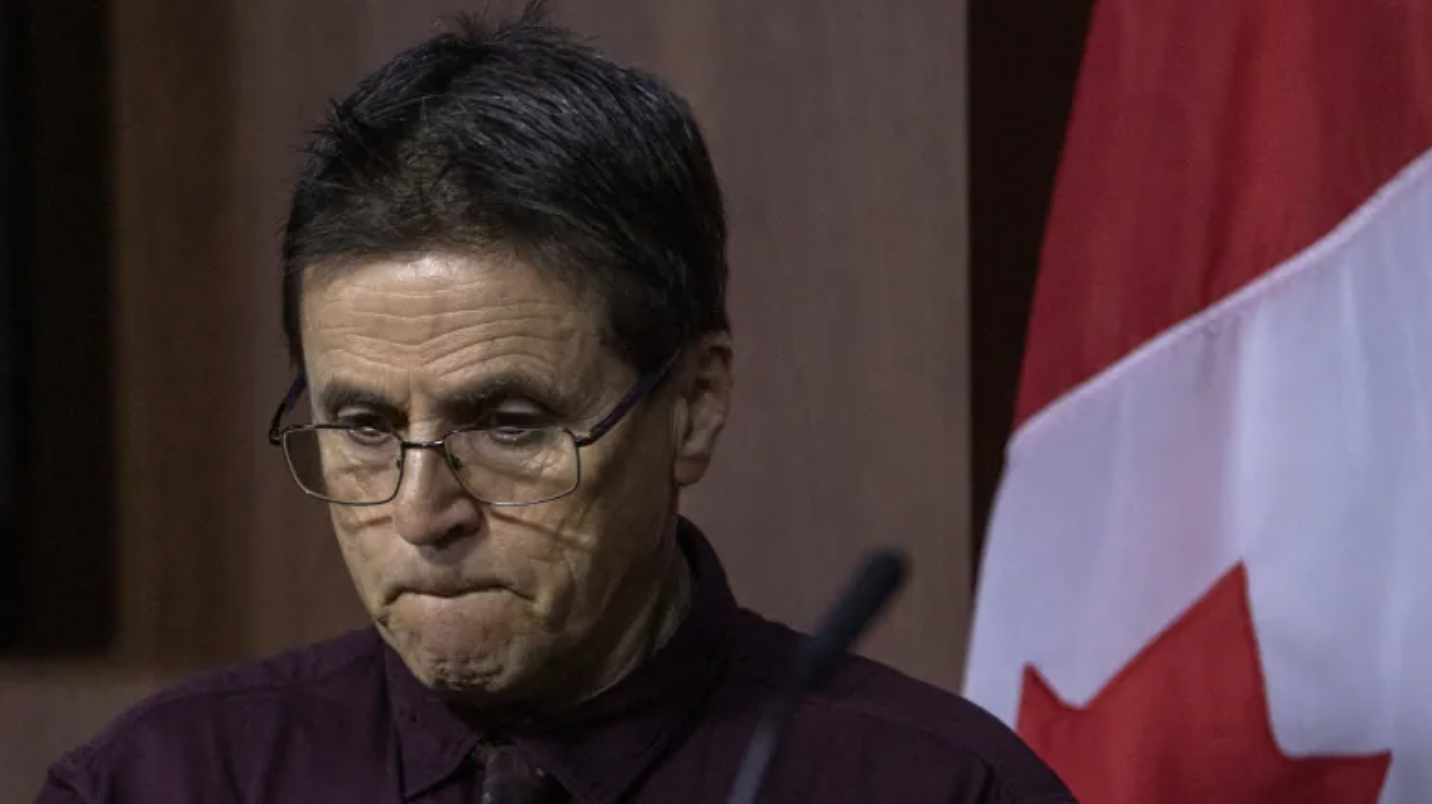 The fact that Canada’s extradition laws allowed Diab to be sent to France once “is evidence enough that there is a need for change,” said Robert Currie, a professor at Dalhousie University’s Schulich School of Law. Diab is not the only one “to suffer through this broken process,” said Tim McSorley, national co-ordinator of the Ottawa-based International Civil Liberties Monitoring Group. “Multiple studies have already shown that there are deep problems in Canada’s extradition system, and multiple experts have already proposed clear solutions,” he said in a statement. “We hope the committee takes this opportunity to develop concrete legislative solutions that will help the government quickly move to introducing amendments to the Extradition Act.” Read more
The fact that Canada’s extradition laws allowed Diab to be sent to France once “is evidence enough that there is a need for change,” said Robert Currie, a professor at Dalhousie University’s Schulich School of Law. Diab is not the only one “to suffer through this broken process,” said Tim McSorley, national co-ordinator of the Ottawa-based International Civil Liberties Monitoring Group. “Multiple studies have already shown that there are deep problems in Canada’s extradition system, and multiple experts have already proposed clear solutions,” he said in a statement. “We hope the committee takes this opportunity to develop concrete legislative solutions that will help the government quickly move to introducing amendments to the Extradition Act.” Read more
Mass Surveillance Is Bad News for Privacy — and Democracy
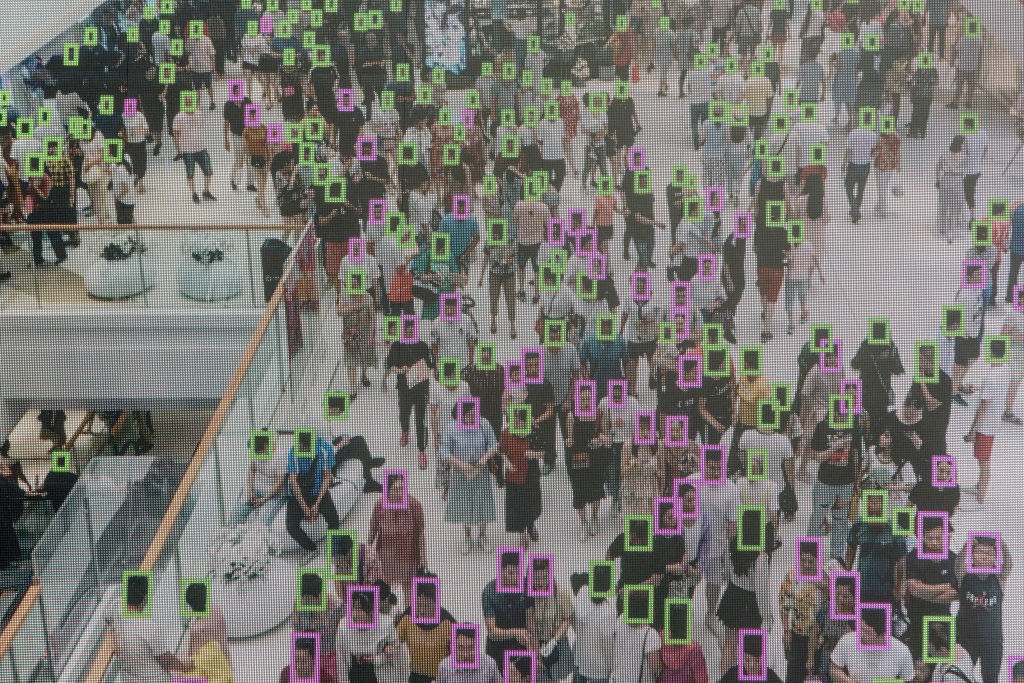
Jacobin 16/10/2022 – The Ottawa-based International Civil Liberties Monitoring Group highlights five of its recommendations that were picked up by the privacy and ethics committee to be included in its report. Those measures include “the establishment of ‘no-go zones’ where facial recognition is prohibited” and “a moratorium on the use of [facial recognition technology, or FRT] by federal law enforcement until new legislation to regulate police use of FRT is put in place.” Furthermore, greater public consultation and specific FRT governance legislation is needed alongside a beefier role for the Office of the Privacy Commission in enforcing “both public and private sector violations of privacy laws.” These recommendations ought to be nonnegotiable elements of Canada’s approach to regulating facial recognition technologies. Read more
Urgent need for ban on use of facial recognition technology by police
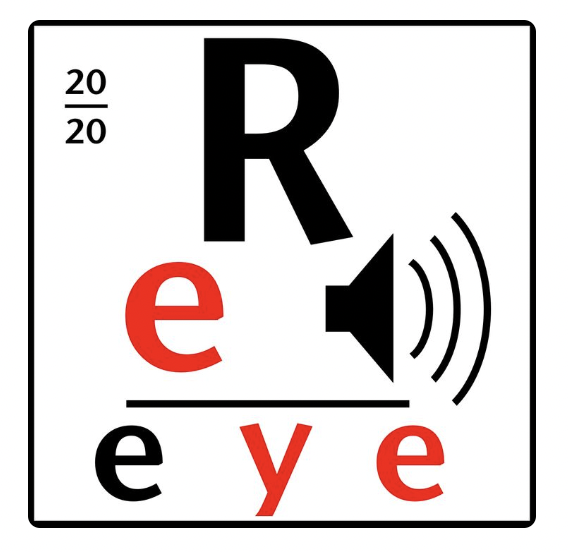
Redeye 16/10/2022 – On October 4, a parliamentary committee released a new report on facial recognition technology and artificial intelligence. The committee stopped short of recommending a ban on the use of facial recognition technology by police, a move that the International Civil Liberties Monitoring Group says is critical to prevent mass surveillance of Canadians. We speak with Tim McSorley, national coordinator for ICLMG. Listen
Commons committee recommends ‘national pause’ on use of facial recognition technology
The Lawyer’s Daily 11/10/2022 –  Before the committee Tim McSorley, the national co-ordinator of the International Civil Liberties Monitoring Group (ICLMG), raised “three main concerns about FRT: biased and inaccurate algorithms reinforce systemic racism and racial profiling; facial recognition allows for indiscriminate and warrantless mass surveillance; and the lack of regulation, transparency and accountability from law enforcement and intelligence agencies in Canada.” Concerns over FRT and AI have existed for some time. According to the report, a “group of 77 privacy, human rights and civil liberties advocates, including the ICLMG, wrote a letter to the Minister of Public Safety calling on him to ban all use of facial recognition surveillance by federal law enforcement and intelligence agencies” back in 2020. McSorley, the report noted, stressed that “CSIS has refused to confirm whether or not it uses FRT in its work, stating that it has no obligation to do so.” Read more
Before the committee Tim McSorley, the national co-ordinator of the International Civil Liberties Monitoring Group (ICLMG), raised “three main concerns about FRT: biased and inaccurate algorithms reinforce systemic racism and racial profiling; facial recognition allows for indiscriminate and warrantless mass surveillance; and the lack of regulation, transparency and accountability from law enforcement and intelligence agencies in Canada.” Concerns over FRT and AI have existed for some time. According to the report, a “group of 77 privacy, human rights and civil liberties advocates, including the ICLMG, wrote a letter to the Minister of Public Safety calling on him to ban all use of facial recognition surveillance by federal law enforcement and intelligence agencies” back in 2020. McSorley, the report noted, stressed that “CSIS has refused to confirm whether or not it uses FRT in its work, stating that it has no obligation to do so.” Read more
MPs call for tight federal restriction on use of facial recognition technology

The Canadian Press 04/10/2022 – Tim McSorley, national co-ordinator of the International Civil Liberties Monitoring Group, welcomed the report, noting that for more than two years, government regulators, civil society groups and leading experts in human rights and technology have been calling for decisive action on facial recognition by the federal government. “We hope that this latest report finally leads to the legal reforms that are necessary to rein in facial recognition, and artificial intelligence technology more broadly,” said McSorley, who testified before the committee in March. Read more
Federal cybersecurity bill threatens privacy, transparency, civil society groups say
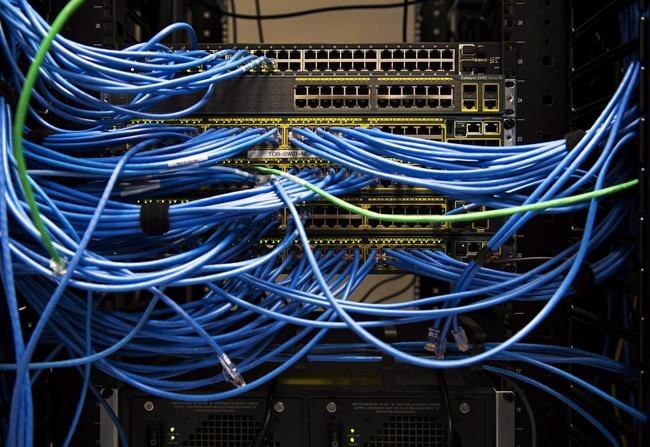 The Canadian Press 28/09/2022 – Several civil society groups are pushing for changes to the Liberal government’s cybersecurity bill, saying it would undermine privacy, accountability and judicial transparency. In an open letter to Public Safety Minister Marco Mendicino, the groups and prominent researchers call for substantive amendments to ensure the legislation delivers effective cybersecurity protections while respecting democratic principles. Among the signatories are the Canadian Civil Liberties Association, the International Civil Liberties Monitoring Group, Ligue des droits et libertés and OpenMedia. Read more
The Canadian Press 28/09/2022 – Several civil society groups are pushing for changes to the Liberal government’s cybersecurity bill, saying it would undermine privacy, accountability and judicial transparency. In an open letter to Public Safety Minister Marco Mendicino, the groups and prominent researchers call for substantive amendments to ensure the legislation delivers effective cybersecurity protections while respecting democratic principles. Among the signatories are the Canadian Civil Liberties Association, the International Civil Liberties Monitoring Group, Ligue des droits et libertés and OpenMedia. Read more
Mazigh: Canada’s Muslim charities deserve fairness from tax officials
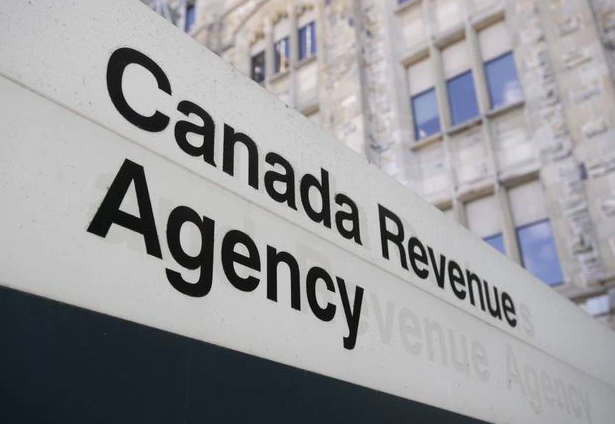
Ottawa Citizen 31/08/2022 – Last year, a few weeks before the Islamophobia summit that Prime Minister Justin Trudeau “offered” Muslim Canadians as a gesture of good will to combat hate and racism faced by the community, I wrote an op-ed in which I highlighted two recent reports by the University of Toronto Institute of Islamic Studies and the International Civil Liberties Monitoring Group. Both exposed disproportionate and biased audits of many Muslim charities by the CRA’s Review and Analysis Division (RAD), which is responsible for countering terrorist financing. Read more
Tackling Islamophobia begins by rebuilding trust with the Muslim community
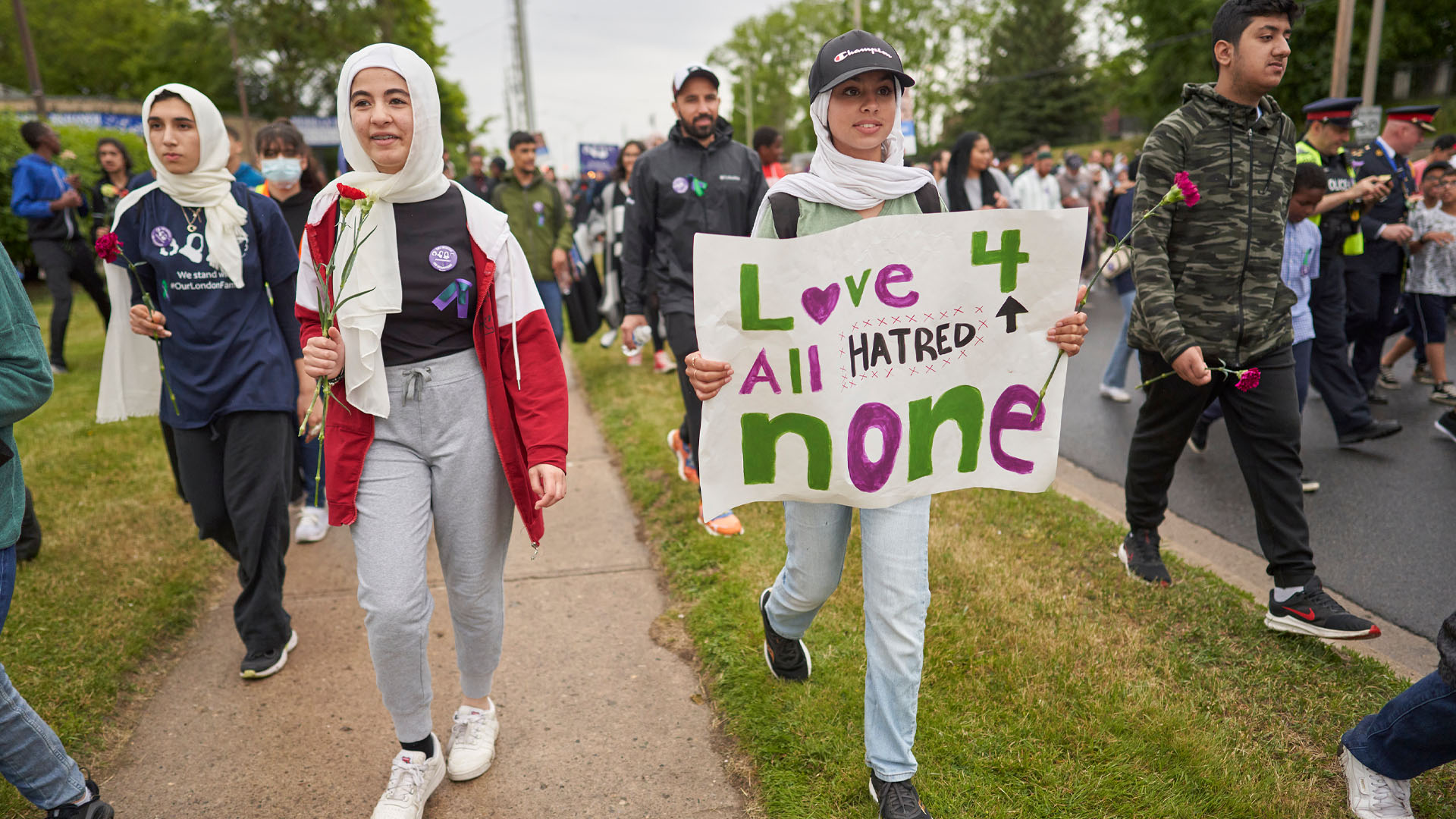
Policy options 02/08/2022 – Islamophobia has been on the rise since 9/11. Under the “war on terror” and the anti-radicalization framework, Muslims were securitized within public, political and media discourses. These policies stigmatized Muslims and made it easy to propagate dangerous Islamophobic discourses. This normalization process rose to a crescendo around 2011 when it moved from the fringe towards the centre as its political utility became evident. One example of systemic Islamophobia was exposed in two recent reports that examined the targeting of Muslim-led charities by the Canada Revenue Agency (CRA). The first report, by the International Civil Liberties Monitoring Group (ICLMG), traced systemic biases in Canada’s anti-terrorism financing and anti-radicalization regimes. The second, titled Under Layered Suspicion, examined three audit reports of six revoked charities and identified a number of systemic biases. These included casting Muslims and their lifestyles and activities as inherently foreign or in the role of the outsider. Read more
Canada Ends Muslim Charity Suspension Amid Bias Review
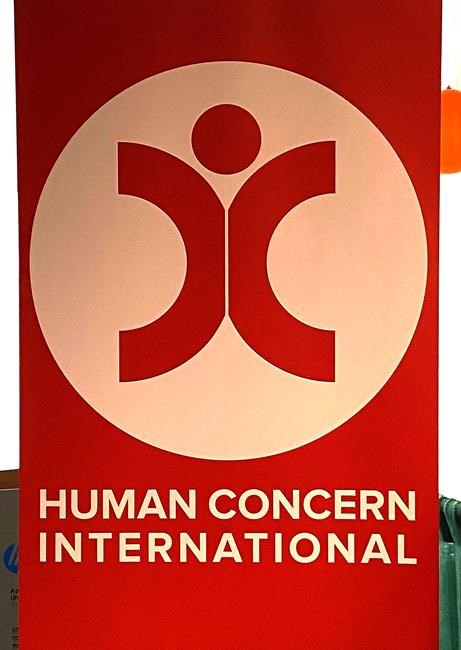 Bloomberg 14/07/2022 – Human Concern International is one of many charities that have alleged anti-Muslim discrimination at the hands of the agency. Human Concern International’s suspension fits with the troubling pattern of systemic discrimination against Muslim charities, said Tim McSorley, executive director of the International Civil Liberties Monitoring Group. “Our research found a troubling history of the CRA initiating audits of Muslim charities based on unsupported allegations that lead to drawn out audits resulting in penalties that are not linked to the initial reasons for investigation, and which cannot be challenged,” McSorley said. Read more
Bloomberg 14/07/2022 – Human Concern International is one of many charities that have alleged anti-Muslim discrimination at the hands of the agency. Human Concern International’s suspension fits with the troubling pattern of systemic discrimination against Muslim charities, said Tim McSorley, executive director of the International Civil Liberties Monitoring Group. “Our research found a troubling history of the CRA initiating audits of Muslim charities based on unsupported allegations that lead to drawn out audits resulting in penalties that are not linked to the initial reasons for investigation, and which cannot be challenged,” McSorley said. Read more
Inadmissible: How a U.S. policy is wreaking havoc on the lives of Iranian-Canadians
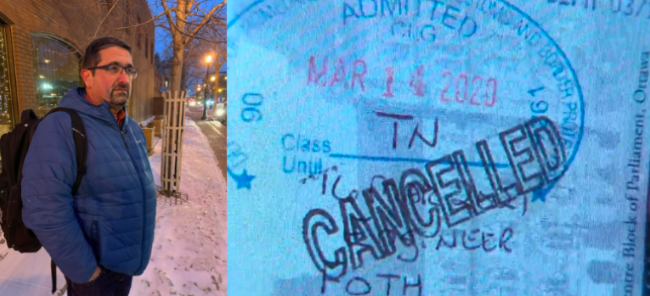 Global News 20/04/2022 – While top Canadian officials have maintained Canada has “no role” in America’s admissibility decisions at the border, the Ottawa-based International Civil Liberties Monitoring Group argues there’s still something the federal government can do for its inadmissible citizens. “Canada has a close relationship with the United States. I don’t think it would take a lot of political capital to raise this as part of other discussions and to make sure that there’s an understanding that this has an impact,” said national coordinator Tim McSorley. “There’s also something else in terms of the Canadian government’s response, and that’s to assure Iranian-Canadians that they won’t be facing future repercussions in Canada.” […] In Vancouver, meanwhile, Movassagh said he will rely on FaceTime to communicate with his widowed mother – his family “locked up” in Canada until Biden and the U.S. Congress approves a change, or Prime Minister Justin Trudeau instigates a conversation. Read more + The Intercept article & podcast
Global News 20/04/2022 – While top Canadian officials have maintained Canada has “no role” in America’s admissibility decisions at the border, the Ottawa-based International Civil Liberties Monitoring Group argues there’s still something the federal government can do for its inadmissible citizens. “Canada has a close relationship with the United States. I don’t think it would take a lot of political capital to raise this as part of other discussions and to make sure that there’s an understanding that this has an impact,” said national coordinator Tim McSorley. “There’s also something else in terms of the Canadian government’s response, and that’s to assure Iranian-Canadians that they won’t be facing future repercussions in Canada.” […] In Vancouver, meanwhile, Movassagh said he will rely on FaceTime to communicate with his widowed mother – his family “locked up” in Canada until Biden and the U.S. Congress approves a change, or Prime Minister Justin Trudeau instigates a conversation. Read more + The Intercept article & podcast
Muslim charity seeks court shutdown of federal audit, alleging systemic Islamophobia
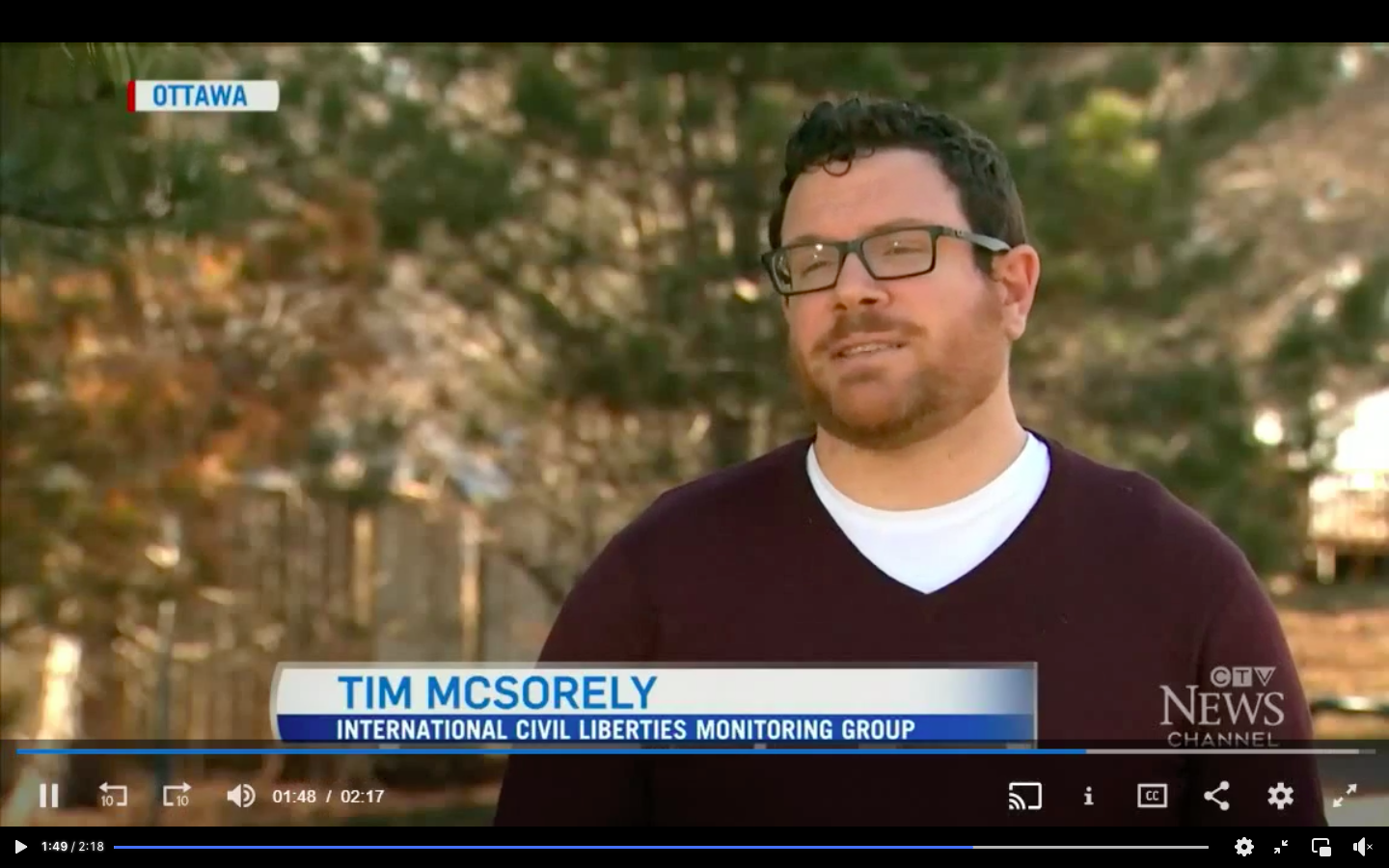 The Canadian Press 14/04/2022 – We spoke with Tim McSorley who is with a coalition of civil society groups called the International Civil Liberties Monitoring Group. They put out one of two independent studies on the subject last year. McSorley says after Canada boosted attempts to counter terrorist financing post 9-11, a division within the CRA profiled and targeted Muslim charities. From 2008 to 2015 they found that post-audits 75% of the charities that had their status revoked were run by Muslim groups. He says the system is unfair and not based on actual evidence. Rather one that places suspicion on a charity simply because they are Muslim led. “It also appears that Muslim charities face harsher consequences for the penalties… than other charities have faced as well,” says McSorley. “That needs to be explored more, but it’s one of the things that we’re very concerned about.” Read more + Watch CTV National News segment
The Canadian Press 14/04/2022 – We spoke with Tim McSorley who is with a coalition of civil society groups called the International Civil Liberties Monitoring Group. They put out one of two independent studies on the subject last year. McSorley says after Canada boosted attempts to counter terrorist financing post 9-11, a division within the CRA profiled and targeted Muslim charities. From 2008 to 2015 they found that post-audits 75% of the charities that had their status revoked were run by Muslim groups. He says the system is unfair and not based on actual evidence. Rather one that places suspicion on a charity simply because they are Muslim led. “It also appears that Muslim charities face harsher consequences for the penalties… than other charities have faced as well,” says McSorley. “That needs to be explored more, but it’s one of the things that we’re very concerned about.” Read more + Watch CTV National News segment
Experts fear Canada will extradite Hassan Diab to France again
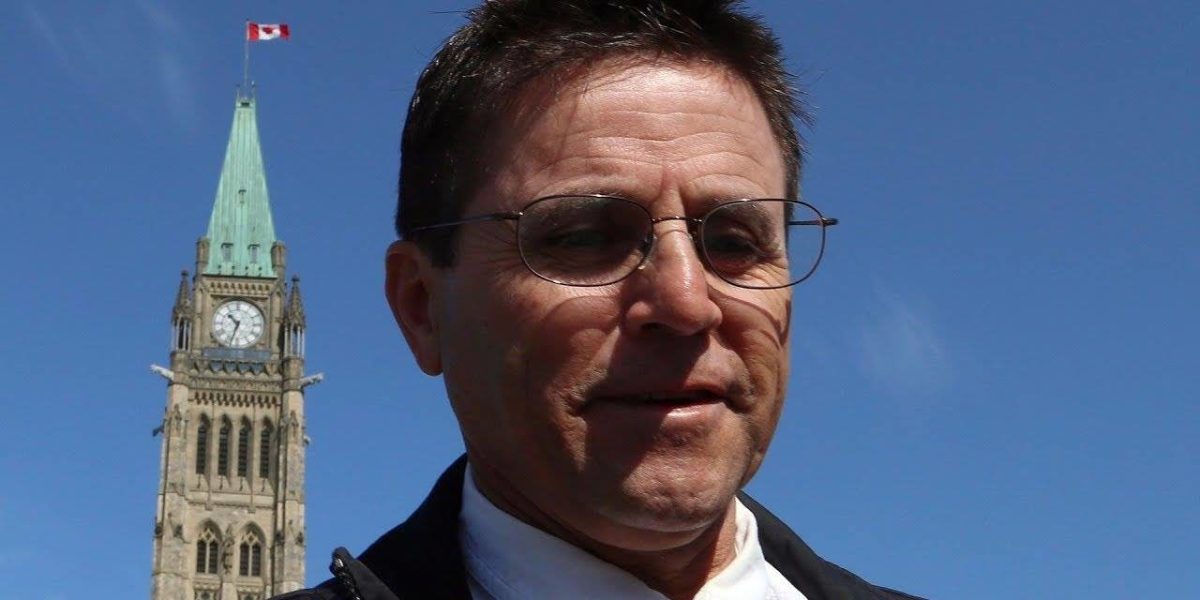 rabble.ca 08/12/2021 – Right now, Diab sits in limbo. A group of legal experts including Donald Bayne and Rob Currie and the International Civil Liberties Monitoring Group (ICLMG) are calling on Canada to say no to any second extradition request from France for Hassan Diab. This alliance is asking Ottawa to consider as an alternative their “Halifax” proposals (where a colloquium was held) to reform a broken Canadian extradition law that fails to provide due process to the accused during extradition hearings. Also problematic, adds Currie, is the role of the federal Department of Justice lawyers in the International Assistance Group unit as “judge, jury and executioner” in both formally approving the handover to a foreign state and assisting that state in zealously getting the accused person out the door. Tim McSorley, the national co-ordinator for the ICLMG, worries that a risk-averse Canada is not up to the task of defying France. “I believe that Canada wants to maintain good relations with France. They are worried about a conflict with France over this. They don’t want to be seen as criticizing France s legal system,” he says. Read more
rabble.ca 08/12/2021 – Right now, Diab sits in limbo. A group of legal experts including Donald Bayne and Rob Currie and the International Civil Liberties Monitoring Group (ICLMG) are calling on Canada to say no to any second extradition request from France for Hassan Diab. This alliance is asking Ottawa to consider as an alternative their “Halifax” proposals (where a colloquium was held) to reform a broken Canadian extradition law that fails to provide due process to the accused during extradition hearings. Also problematic, adds Currie, is the role of the federal Department of Justice lawyers in the International Assistance Group unit as “judge, jury and executioner” in both formally approving the handover to a foreign state and assisting that state in zealously getting the accused person out the door. Tim McSorley, the national co-ordinator for the ICLMG, worries that a risk-averse Canada is not up to the task of defying France. “I believe that Canada wants to maintain good relations with France. They are worried about a conflict with France over this. They don’t want to be seen as criticizing France s legal system,” he says. Read more
Dozens of lawyers call for suspension of extradition with France over Diab case
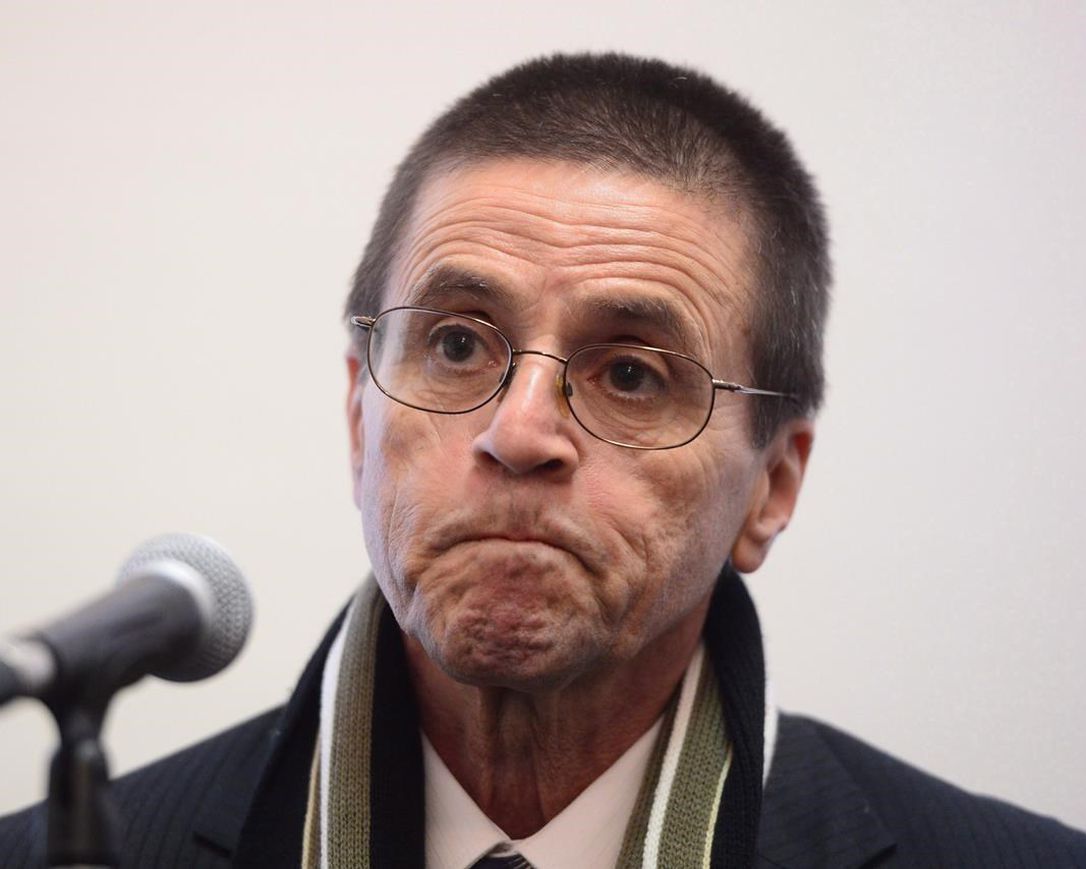 The Canadian Press 14/09/2021 – More than 100 legal professionals are asking Canada to suspend its extradition treaty with France over concerns “an innocent man” could face trial there in a terrorism case. In a new letter to Justice Minister David Lametti published by the ICLMG, many prominent lawyers say there is no evidence to support sending Ottawa sociology professor Hassan Diab to France a second time in the long-running matter. […] The letter from dozens of lawyers and other legal professionals, made public Tuesday, calls on the Liberal government to urge France to put an immediate end to the “continuing miscarriage of justice.” Among the signatories are lawyers Barbara Jackman, Paul Champ, Dennis Edney and Paul Copeland as well as law professors Rob Currie, Sharry Aiken and Don Stuart. They seek assurances that Canada will not bow to a second request for Diab’s extradition. In addition, the letter advocates suspending the extradition treaty with France, calling it “inherently defective.” Read more
The Canadian Press 14/09/2021 – More than 100 legal professionals are asking Canada to suspend its extradition treaty with France over concerns “an innocent man” could face trial there in a terrorism case. In a new letter to Justice Minister David Lametti published by the ICLMG, many prominent lawyers say there is no evidence to support sending Ottawa sociology professor Hassan Diab to France a second time in the long-running matter. […] The letter from dozens of lawyers and other legal professionals, made public Tuesday, calls on the Liberal government to urge France to put an immediate end to the “continuing miscarriage of justice.” Among the signatories are lawyers Barbara Jackman, Paul Champ, Dennis Edney and Paul Copeland as well as law professors Rob Currie, Sharry Aiken and Don Stuart. They seek assurances that Canada will not bow to a second request for Diab’s extradition. In addition, the letter advocates suspending the extradition treaty with France, calling it “inherently defective.” Read more
Taxpayers’ ombudsperson investigates CRA targeting of Muslim-led charities
 The Toronto Star 06/08/2021 – Taxpayers’ ombudsperson François Boileau will investigate the concerns of Muslim charities and other charities led by people of colour about being inappropriately targeted for audits. His office will ask the charities to share their experiences with the agency and will examine all the publicly available documentation and information obtained from the agency related to the issue. The ombudsperson will also examine the revenue agency’s efforts to root out discrimination. […] Tim McSorley, the national co-ordinator of the International Civil Liberties Monitoring Group, said the treatment of Muslim charities is a governmentwide issue, but it has implications when it comes to the revenue agency and how it audits and sanctions these groups. “We have offered to discuss our research and provide any support as needed to the Office of the Taxpayers’ Ombudsperson for its review of this issue, and we look forward to seeing the results,” McSorley said in an emailed statement. He also said the ombudsperson should review how Canada’s anti-terrorism and anti-radicalization policies have impacted the treatment of Muslim charities by the revenue agency. “These policies are at the heart of the problem. They are the drivers behind the prejudiced auditing of Muslim charities, and must be a key part of this review,” he said. “Our one primary concern is that the ombudsperson’s mandate may be too narrow to examine this system in its entirety.” Read more
The Toronto Star 06/08/2021 – Taxpayers’ ombudsperson François Boileau will investigate the concerns of Muslim charities and other charities led by people of colour about being inappropriately targeted for audits. His office will ask the charities to share their experiences with the agency and will examine all the publicly available documentation and information obtained from the agency related to the issue. The ombudsperson will also examine the revenue agency’s efforts to root out discrimination. […] Tim McSorley, the national co-ordinator of the International Civil Liberties Monitoring Group, said the treatment of Muslim charities is a governmentwide issue, but it has implications when it comes to the revenue agency and how it audits and sanctions these groups. “We have offered to discuss our research and provide any support as needed to the Office of the Taxpayers’ Ombudsperson for its review of this issue, and we look forward to seeing the results,” McSorley said in an emailed statement. He also said the ombudsperson should review how Canada’s anti-terrorism and anti-radicalization policies have impacted the treatment of Muslim charities by the revenue agency. “These policies are at the heart of the problem. They are the drivers behind the prejudiced auditing of Muslim charities, and must be a key part of this review,” he said. “Our one primary concern is that the ombudsperson’s mandate may be too narrow to examine this system in its entirety.” Read more
Canadian Muslims have doubt, cautious hope anti-Islamophobia summit will bring real change
 CTV News 22/07/2021 – Canadian Muslims expressed both doubt and cautious hope as the federal anti-Islamophobia summit is being held in the wake of a horrific vehicle attack on a Muslim family in London, Ont. […] Azeezah Kanji, a community activist, legal academic researcher and writer, said government discourse is “overlooking the central role of the Canadian state itself — particularly in the context of the war on terror — in legitimising Islamophobia and the demonizing stereotypes of Muslims.” “There’s been an emphasis on dangerously using expanded counterterrorism powers and expanded policing powers in the name of addressing Islamophobic hate,” Kanji said, referencing proposed changes to the Criminal Code to better penalize hate-motivated assault, murder, threats, and mischief; and provincial legislation barring white supremacist groups from rallying on public land. Kanji will instead be looking for government commitments to end systemic racism within state powers themselves. She worked with the Ottawa-based non-profit International Civil Liberties Monitoring Group to come up with its own proposals, some of which overlap with NCCM’s. These include the release and collection of disaggregated race- and religious-based data by the government; and reviewing how the Canada Revenue Agency works with national security agencies to carry out its audits, which critics say happens with little accountability and have disproportionately affected Muslim charities. Read more
CTV News 22/07/2021 – Canadian Muslims expressed both doubt and cautious hope as the federal anti-Islamophobia summit is being held in the wake of a horrific vehicle attack on a Muslim family in London, Ont. […] Azeezah Kanji, a community activist, legal academic researcher and writer, said government discourse is “overlooking the central role of the Canadian state itself — particularly in the context of the war on terror — in legitimising Islamophobia and the demonizing stereotypes of Muslims.” “There’s been an emphasis on dangerously using expanded counterterrorism powers and expanded policing powers in the name of addressing Islamophobic hate,” Kanji said, referencing proposed changes to the Criminal Code to better penalize hate-motivated assault, murder, threats, and mischief; and provincial legislation barring white supremacist groups from rallying on public land. Kanji will instead be looking for government commitments to end systemic racism within state powers themselves. She worked with the Ottawa-based non-profit International Civil Liberties Monitoring Group to come up with its own proposals, some of which overlap with NCCM’s. These include the release and collection of disaggregated race- and religious-based data by the government; and reviewing how the Canada Revenue Agency works with national security agencies to carry out its audits, which critics say happens with little accountability and have disproportionately affected Muslim charities. Read more
Trudeau calls out federal agencies during national summit on Islamophobia
Trudeau says federal security, tax agencies must do more to end Islamophobia
“There is discrimination in all systems”: Trudeau addresses potential CRA bias against Muslim-led charities
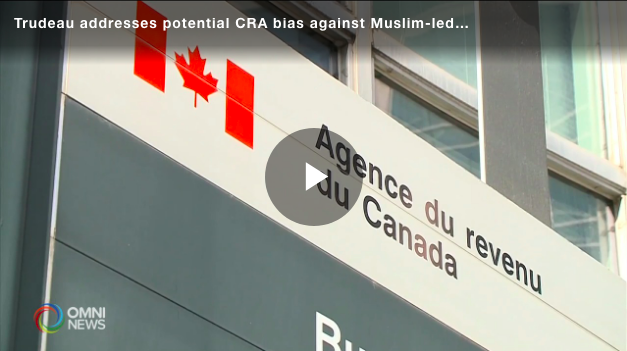 OmniTV July 2021 – In an exclusive interview with OMNI News, Prime Minister Justin Trudeau admits ‘there is discrimination in all systems’ as Canadian Muslim-led charities call for a probe on Canada Revenue Agency tax audits. “As a government, we have realized that systemic discrimination exists throughout every institution,” Trudeau said. According to a recent report released by the International Civil Liberties Monitoring Group (ICLMG), a division of the Canada Revenue Agency is unfairly targeting Muslim charities for audits it says are based on “flimsy reasoning, amounting to discrimination”. The national civil liberties coalition’s report revealed that from 2008 to 2015, 75 per cent of the charitable organizations that had their status revoked through CRA audits were Islamic charities. “We certainly feel that it was a witch hunt and it was biased,” said Mahmouda Khan, Executive Director of Human Concern International (HCI). […] ICLMG representative Tim McSorley said HCI’s situation is a common one for charities who see their work severely disrupted by CRA audits, especially when they are based on weak or unsupported information. “In the case of HCI, it’s been, I think, seven years that this has been ongoing for them and the last three years without any word from the CRA until suddenly they receive this decision,” McSorley said. “And it causes deep financial costs. It disrupts the services that they can provide.” […] To ensure organizations are not being targeted due to racial or religious prejudice, the ICLMG report urges the government to refer the issue to Canada’s security watchdog, the National Security and Intelligence Review Agency. Read more
OmniTV July 2021 – In an exclusive interview with OMNI News, Prime Minister Justin Trudeau admits ‘there is discrimination in all systems’ as Canadian Muslim-led charities call for a probe on Canada Revenue Agency tax audits. “As a government, we have realized that systemic discrimination exists throughout every institution,” Trudeau said. According to a recent report released by the International Civil Liberties Monitoring Group (ICLMG), a division of the Canada Revenue Agency is unfairly targeting Muslim charities for audits it says are based on “flimsy reasoning, amounting to discrimination”. The national civil liberties coalition’s report revealed that from 2008 to 2015, 75 per cent of the charitable organizations that had their status revoked through CRA audits were Islamic charities. “We certainly feel that it was a witch hunt and it was biased,” said Mahmouda Khan, Executive Director of Human Concern International (HCI). […] ICLMG representative Tim McSorley said HCI’s situation is a common one for charities who see their work severely disrupted by CRA audits, especially when they are based on weak or unsupported information. “In the case of HCI, it’s been, I think, seven years that this has been ongoing for them and the last three years without any word from the CRA until suddenly they receive this decision,” McSorley said. “And it causes deep financial costs. It disrupts the services that they can provide.” […] To ensure organizations are not being targeted due to racial or religious prejudice, the ICLMG report urges the government to refer the issue to Canada’s security watchdog, the National Security and Intelligence Review Agency. Read more
Muslim charity going to court to fight ‘unfair’ suspension by Canada Revenue Agency
Media coverage of our report: The CRA’s Prejudiced Audits
The Canadian Press/Globe and Mail 09/06/2021: Federal targeting of Muslim charities amounts to prejudice: civil liberties coalition
The Hill Times: CRA audits disproportionately targeted Muslim charities for years says civil liberties group
The National Post: CRA is unfairly focusing on Muslim charities, civil rights group says
+ CTV News; Toronto Star; The Hamilton Spectator; Global News; City News; CBC News; Vancouver Sun; London Free Press; Ottawa Citizen; Winnipeg Free Press; The Observer; The Sudbury Star; Kingston Whig Standard; The Humboldt Journal; FM96 London; The Coast Reporter; Welland Tribune; New Westminster Record; Yahoo Canada; Canadian Business Journal; Meadow Lake Now; RMO Today; St. Albert Today; Goldstream Gazette; The Interior News; Ponoka News; YYC Times; Canada News Central; The Philanthropist Journal; Saudi News; The Nation (Pakistan) and Anadolu Agency (Turkey), and more.
Op-eds and statements in support of our report: Lawyer Faisal Kutty in the Middle East Eye + on Global News’ The Morning Show (radio); UOttawa John Packer in the Toronto Star; NDP MP Matthew Green in the Hamilton Spectator; Monia Mazigh in the Ottawa Citizen; Abdul Nakua in the Hill Time; Dr. Mohammed Iqbal Alnadvi in the Hill Times; Dr. Yaser Haddara in the Hamilton Spectator; The Canadian Council of Imams; Dr. Mukarram Zaidi in the Calgary Herald & Sarah Mushtaq in Policy Options.
Media coverage of our open letter calling PM Trudeau to Stop the CRA’s Prejudiced Audits
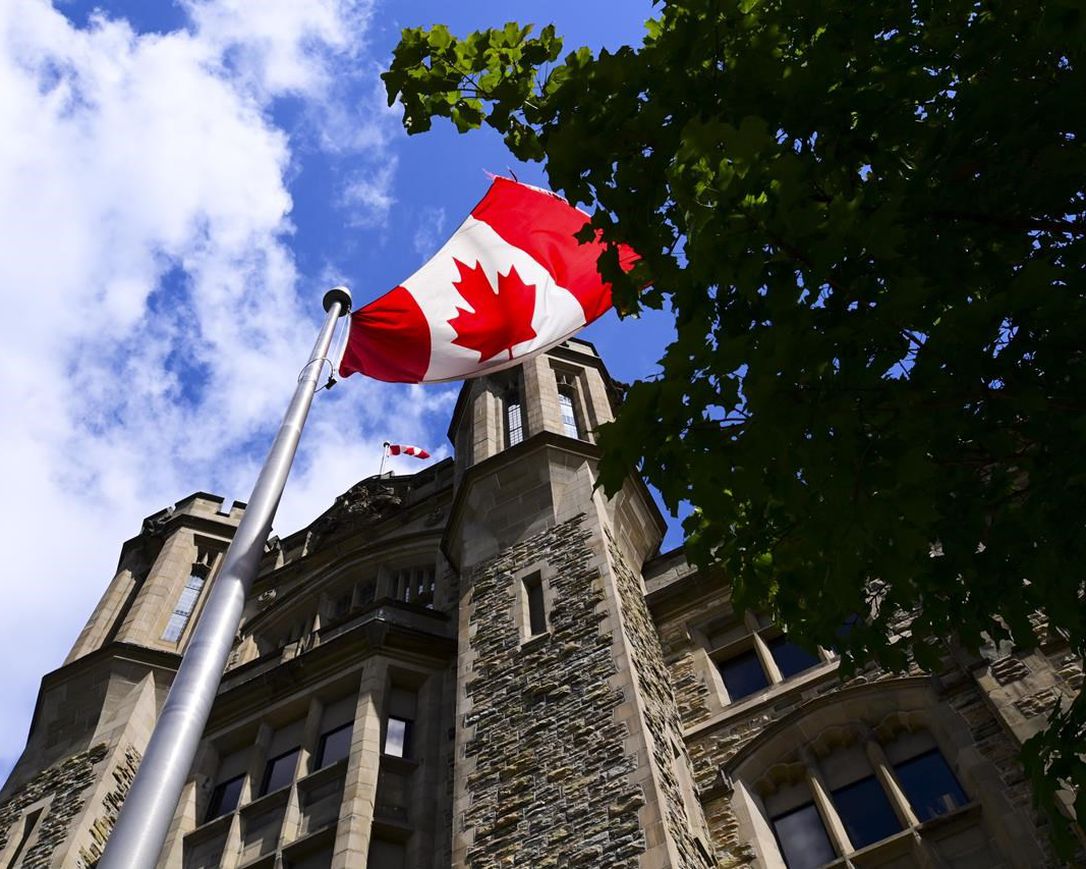 The Canadian Press/Toronto Star 23/06/2021: Muslim charities concerned about targeted audits call for security watchdog probe
The Canadian Press/Toronto Star 23/06/2021: Muslim charities concerned about targeted audits call for security watchdog probe
National Post; The Globe and Mail; Toronto City News; MSN news; The Daily Courier; Guelph Today; Halifax Today; Cochrane Today; Red Deer Advocate; Collingwood Today; Moosejaw Today; Richmond News; Tricity News; Burnaby Now; Empire Advance; Humboldt Journal; New Market Today; The Mirror; The Coast Reporter; Medicine Hat News; Bradford Bay; Squamish Chief; New Westminister Record; North Shore News; Kamloops This Week; City News 1130; Ottawa City News; Yahoo Sports; The Peterborough Examiner; Daily Advent; CKPG Today; Vernon Matters; Assiniboi Times; Toronto Daily Tribune & more.
Free City Radio #33. Tim McSorley on opposing anti-terror legislation in Canada
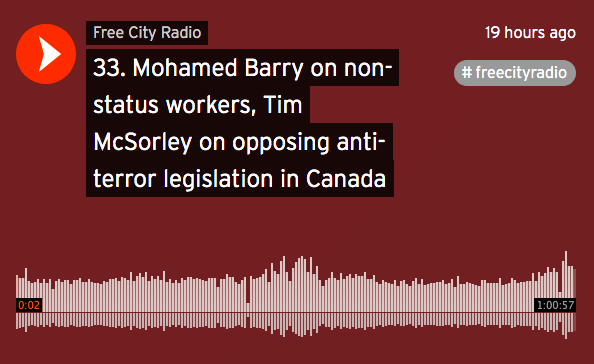 16/03/2021 – Listen to ICLMG’s National Coordinator Tim McSorley on Free City Radio who gives a critical perspective on the use of existing “anti terror” legislation to target white supremacist organizations and far right organizations. An open letter from the ICLMG recently called on the government to take action against far right racism, but to not entrench existing anti-terror legislation which has historically been used to target anti-colonial movements and progressive movements opposing colonialism and injustice globally. The issue is complex, but this is why I thought that it was important to include this discussion on the program. Read the open letter here. Listen
16/03/2021 – Listen to ICLMG’s National Coordinator Tim McSorley on Free City Radio who gives a critical perspective on the use of existing “anti terror” legislation to target white supremacist organizations and far right organizations. An open letter from the ICLMG recently called on the government to take action against far right racism, but to not entrench existing anti-terror legislation which has historically been used to target anti-colonial movements and progressive movements opposing colonialism and injustice globally. The issue is complex, but this is why I thought that it was important to include this discussion on the program. Read the open letter here. Listen
Canada’s spy warrant shortcomings stretch back at least 9 years, audit shows
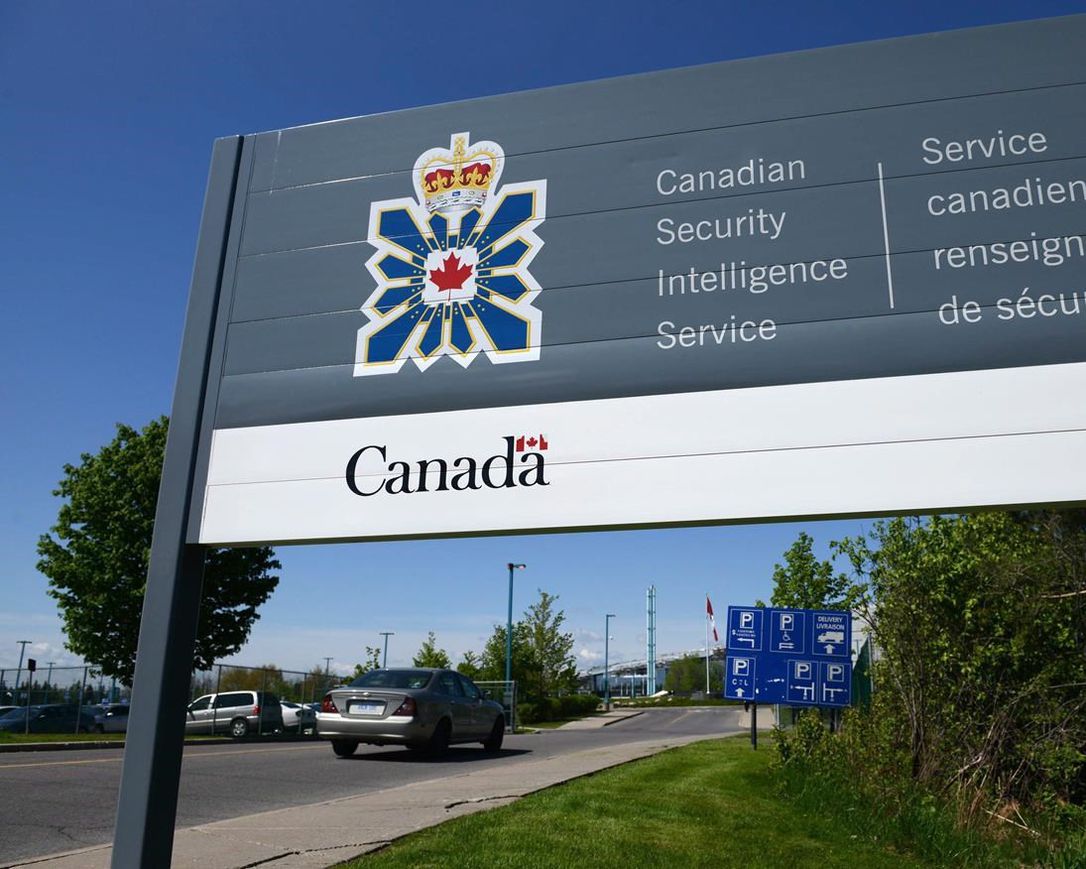 The Canadian Press 06/03/2021 – A newly released audit report shows that difficulties with the judicial warrant process at Canada’s spy agency — an issue that made headlines last summer — stretch back at least nine years. Internal reviewers found several of the Canadian Security Intelligence Service‘s preparatory steps for the execution of warrant powers needed strengthening. Among the shortcomings were insufficient training of personnel and a lack of quality-control measures. In underscoring the importance of the process, the report notes warrants are authorizations issued by a federal judge that enable CSIS to legally undertake actions, including surveilling people electronically, that would otherwise be illegal. “Failure to properly apply or interpret a warrant at the time of its execution exposes the Service to the risk of its employees committing unlawful actions, and in certain situations, criminal offences,” the report says. “The investigative powers outlined in warrants must be exercised rigorously, consistently and effectively.” Potential misuse of these powers could result in serious ethical, legal or reputational consequences that might compromise the intelligence service’s integrity, the report adds. The Canadian Press requested the 2012 audit under the Access to Information Act shortly after its completion, but CSIS withheld much of the content. The news agency filed a complaint through the federal information commissioner’s office in July 2013, beginning a process that led to disclosure of a substantial portion of the document more than seven years later. CSIS operates with a high degree of secrecy and is therefore supposed to follow the proper protocols and legal framework, particularly concerning warrants, said Tim McSorley, national coordinator of the International Civil Liberties Monitoring Group, which includes dozens of civil society organizations. “Seeing a report like this, it just raises a concern… to what degree they’re really following that framework with the most rigour possible.” Read more
The Canadian Press 06/03/2021 – A newly released audit report shows that difficulties with the judicial warrant process at Canada’s spy agency — an issue that made headlines last summer — stretch back at least nine years. Internal reviewers found several of the Canadian Security Intelligence Service‘s preparatory steps for the execution of warrant powers needed strengthening. Among the shortcomings were insufficient training of personnel and a lack of quality-control measures. In underscoring the importance of the process, the report notes warrants are authorizations issued by a federal judge that enable CSIS to legally undertake actions, including surveilling people electronically, that would otherwise be illegal. “Failure to properly apply or interpret a warrant at the time of its execution exposes the Service to the risk of its employees committing unlawful actions, and in certain situations, criminal offences,” the report says. “The investigative powers outlined in warrants must be exercised rigorously, consistently and effectively.” Potential misuse of these powers could result in serious ethical, legal or reputational consequences that might compromise the intelligence service’s integrity, the report adds. The Canadian Press requested the 2012 audit under the Access to Information Act shortly after its completion, but CSIS withheld much of the content. The news agency filed a complaint through the federal information commissioner’s office in July 2013, beginning a process that led to disclosure of a substantial portion of the document more than seven years later. CSIS operates with a high degree of secrecy and is therefore supposed to follow the proper protocols and legal framework, particularly concerning warrants, said Tim McSorley, national coordinator of the International Civil Liberties Monitoring Group, which includes dozens of civil society organizations. “Seeing a report like this, it just raises a concern… to what degree they’re really following that framework with the most rigour possible.” Read more
Trudeau signals support for Hassan Diab as advocates demand intervention with France
 The Canadian Press 03/03/2021 – In late January, France ordered Diab to stand trial for a decades-old synagogue bombing, a move his lawyer called the latest misstep in a long odyssey of injustice. The Canadian government has been communicating with officials in France about the case and will continue to do so, Trudeau said during a news briefing Wednesday. “It has been a priority for us to make sure that we’re standing up for our citizens all around the world, with countries that are challenging, but also with our allies,” he said. “And those conversations will continue.” Canadians would rightly expect their prime minister and government to stand up for a falsely accused citizen, said Donald Bayne, Diab’s Ottawa lawyer. “But what does that ambiguous phrase mean?” […] The Ottawa-based International Civil Liberties Monitoring Group has called on Trudeau and Foreign Affairs Minister Marc Garneau to intervene with their French counterparts “to put a stop to this endless, Kafkaesque affair.” The group, which represents dozens of civil-society voices, also wants the prime minister to commit to not extraditing Diab to France a second time. It also says Canada must reform its extradition laws to ensure no one else is forced to go through what Diab has endured. Tim McSorley the group’s national co-ordinator, said Wednesday that while the prime minister’s words were encouraging, Trudeau missed an opportunity to “clearly and publicly denounce the ongoing miscarriage of justice being faced by Hassan Diab.” Read more
The Canadian Press 03/03/2021 – In late January, France ordered Diab to stand trial for a decades-old synagogue bombing, a move his lawyer called the latest misstep in a long odyssey of injustice. The Canadian government has been communicating with officials in France about the case and will continue to do so, Trudeau said during a news briefing Wednesday. “It has been a priority for us to make sure that we’re standing up for our citizens all around the world, with countries that are challenging, but also with our allies,” he said. “And those conversations will continue.” Canadians would rightly expect their prime minister and government to stand up for a falsely accused citizen, said Donald Bayne, Diab’s Ottawa lawyer. “But what does that ambiguous phrase mean?” […] The Ottawa-based International Civil Liberties Monitoring Group has called on Trudeau and Foreign Affairs Minister Marc Garneau to intervene with their French counterparts “to put a stop to this endless, Kafkaesque affair.” The group, which represents dozens of civil-society voices, also wants the prime minister to commit to not extraditing Diab to France a second time. It also says Canada must reform its extradition laws to ensure no one else is forced to go through what Diab has endured. Tim McSorley the group’s national co-ordinator, said Wednesday that while the prime minister’s words were encouraging, Trudeau missed an opportunity to “clearly and publicly denounce the ongoing miscarriage of justice being faced by Hassan Diab.” Read more
Using terrorist list to label white supremacists risks repeating errors of 9/11 era, civil rights groups say
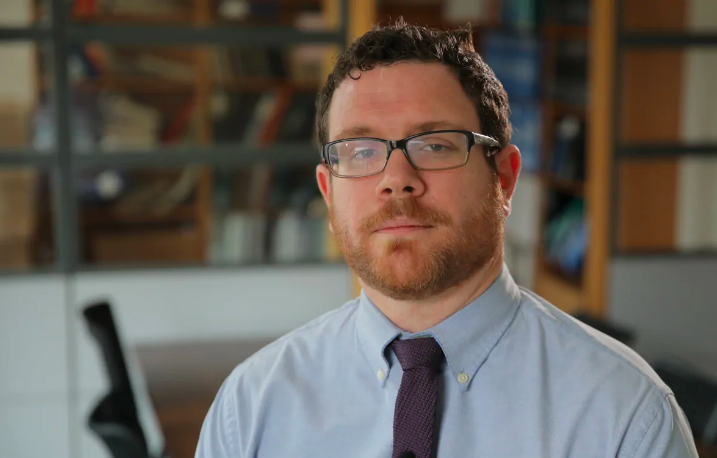 CBC 08/02/2021 – In a Jan. 29 letter to Prime Minister Justin Trudeau and Public Safety Minister Bill Blair, written in the run-up to the government’s Feb. 3 announcement, the Ottawa-based International Civil Liberties Monitoring Group (ICLMG) expressed its concerns about use of the terrorist-entities list. “The discretionary nature of which organizations are added to the list is highly problematic and has resulted in the list perpetuating the harmful idea that terrorism and violence are primarily associated with non-white, non-Western and non-Christian communities,” the letter said. According to the letter, the government’s use of the Criminal Code to label groups terrorist entities has been criticized by civil liberties groups for being a rights-violating process that has been primarily used against Muslims and other racialized groups. “There are tools in Canada’s Criminal Code that can be used to protect our safety and address organized violence without needing to resort to anti-terrorism laws which undermine due process and violate our rights under the Charter of Rights and Freedoms,” ICLMG said in its letter. Read more
CBC 08/02/2021 – In a Jan. 29 letter to Prime Minister Justin Trudeau and Public Safety Minister Bill Blair, written in the run-up to the government’s Feb. 3 announcement, the Ottawa-based International Civil Liberties Monitoring Group (ICLMG) expressed its concerns about use of the terrorist-entities list. “The discretionary nature of which organizations are added to the list is highly problematic and has resulted in the list perpetuating the harmful idea that terrorism and violence are primarily associated with non-white, non-Western and non-Christian communities,” the letter said. According to the letter, the government’s use of the Criminal Code to label groups terrorist entities has been criticized by civil liberties groups for being a rights-violating process that has been primarily used against Muslims and other racialized groups. “There are tools in Canada’s Criminal Code that can be used to protect our safety and address organized violence without needing to resort to anti-terrorism laws which undermine due process and violate our rights under the Charter of Rights and Freedoms,” ICLMG said in its letter. Read more
Liberals ‘completely unwilling’ to hold political parties to account on privacy
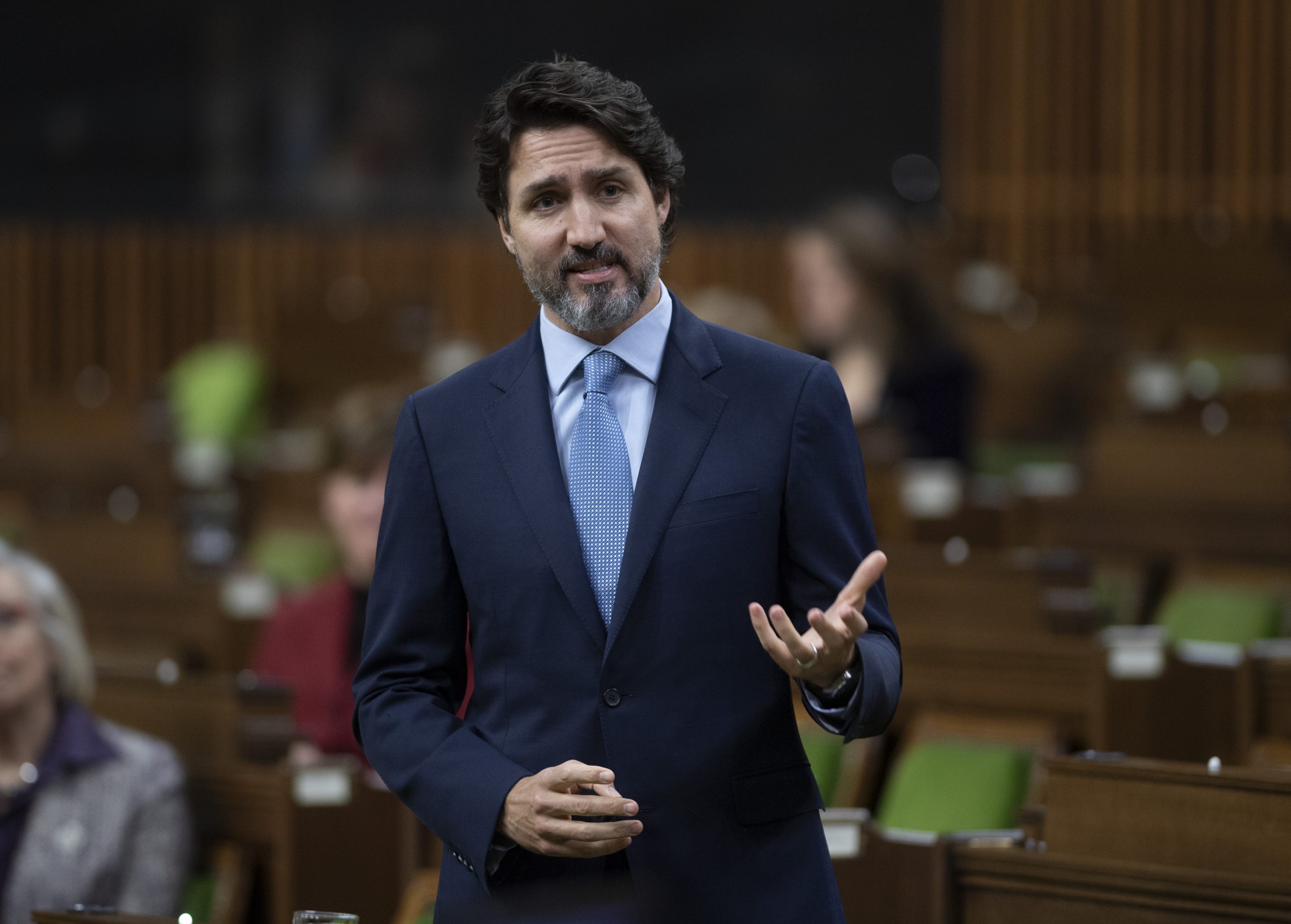 The Canadian Press 13/12/2020 – Definitions of what the government considers to be personal information and publicly available information, particularly in the context of the online world and social media, would be welcome in a revised law, said Tim McSorley, national co-ordinator of the International Civll Liberties Monitoring Group. McSorley would also like to see a rights-based approach to management of personal information, saying it would amount to a profound change by placing privacy rights on a footing with other fundamental guarantees. In addition, he flags elements of the discussion paper that suggest police and spy agencies could be exempted from certain requirements, given the secret nature of their investigations. “We could have the strongest possible rules in the Privacy Act, but if it’s full of exceptions for national security and law enforcement, then it doesn’t really go far enough to protect people’s privacy and their information.” Read more
The Canadian Press 13/12/2020 – Definitions of what the government considers to be personal information and publicly available information, particularly in the context of the online world and social media, would be welcome in a revised law, said Tim McSorley, national co-ordinator of the International Civll Liberties Monitoring Group. McSorley would also like to see a rights-based approach to management of personal information, saying it would amount to a profound change by placing privacy rights on a footing with other fundamental guarantees. In addition, he flags elements of the discussion paper that suggest police and spy agencies could be exempted from certain requirements, given the secret nature of their investigations. “We could have the strongest possible rules in the Privacy Act, but if it’s full of exceptions for national security and law enforcement, then it doesn’t really go far enough to protect people’s privacy and their information.” Read more
Solidarity Network Action Case Study on the ICLMG
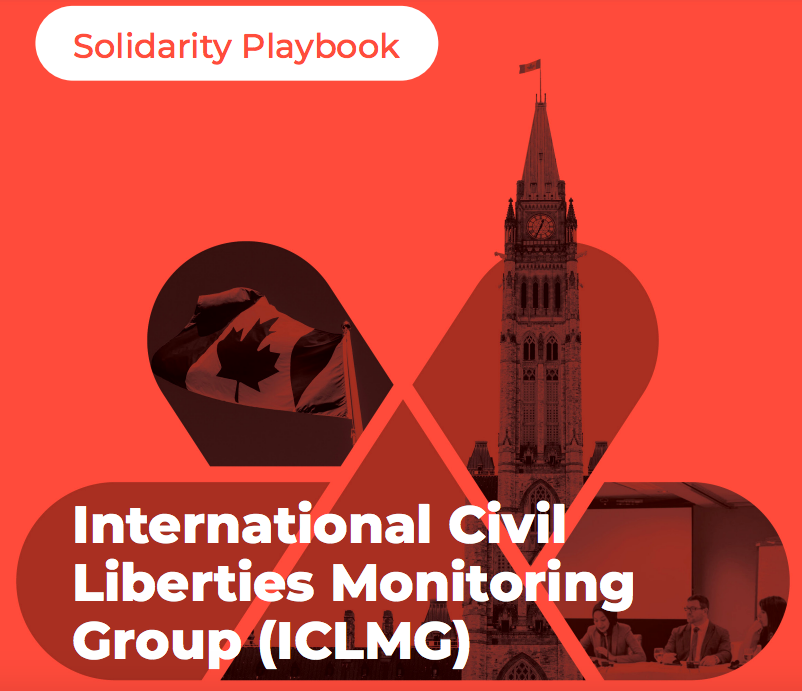 SAN 11/2020 – The coalition’s aim is to protect and promote human rights and civil liberties in the context of the so-called ‘war on terror’. Since its creation, ICLMG has been a platform for exchange among organisations and communities affected by the application of national security laws. This case study looks at how this long-standing coalition has developed, and the strategies it has used to advocate for greater accountability and transparency in Canada, and to resist the overreach of national security. Read more
SAN 11/2020 – The coalition’s aim is to protect and promote human rights and civil liberties in the context of the so-called ‘war on terror’. Since its creation, ICLMG has been a platform for exchange among organisations and communities affected by the application of national security laws. This case study looks at how this long-standing coalition has developed, and the strategies it has used to advocate for greater accountability and transparency in Canada, and to resist the overreach of national security. Read more
Trudeau government appeals ruling that spy service breached duty to court
 The Canadian Press 20/10/2020 – The government’s appeal raises the question of whether the government is trying to “protect CSIS’s ability to continue to hide information from the courts,” said Tim McSorley, national co-ordinator of the Ottawa-based International Civil Liberties Monitoring Group. […] The notice of appeal is a “stunning bit of cognitive dissonance,” but not surprising given the dysfunctional relationship among CSIS, Justice and the court, said Matthew Behrens, a spokesman for the Campaign to Stop Secret Trials in Canada, which has long fought against the use of national security certificates to deport people suspected of terrorist ties. “I think that until the court actually holds in contempt the individuals responsible for this illegality … they’ll be issuing similar decisions indefinitely because there is no incentive to change.” Read more
The Canadian Press 20/10/2020 – The government’s appeal raises the question of whether the government is trying to “protect CSIS’s ability to continue to hide information from the courts,” said Tim McSorley, national co-ordinator of the Ottawa-based International Civil Liberties Monitoring Group. […] The notice of appeal is a “stunning bit of cognitive dissonance,” but not surprising given the dysfunctional relationship among CSIS, Justice and the court, said Matthew Behrens, a spokesman for the Campaign to Stop Secret Trials in Canada, which has long fought against the use of national security certificates to deport people suspected of terrorist ties. “I think that until the court actually holds in contempt the individuals responsible for this illegality … they’ll be issuing similar decisions indefinitely because there is no incentive to change.” Read more
ICLMG’s Tim McSorley on Bill C-3 and Parliament prorogation on Unpublished TV
Unpublished TV 27/08/2020 – Our National Coordinator Tim McSorley had the chance to speak with Ed Hand and Lori Turnbull on Unpublished TV last night about prorogation, including the need to bring back (a better) bill to create independent review of the Canada Border Services Agency. Watch from 11:49
Group urges feds to ban facial recognition tools citing a violation of Canadian rights
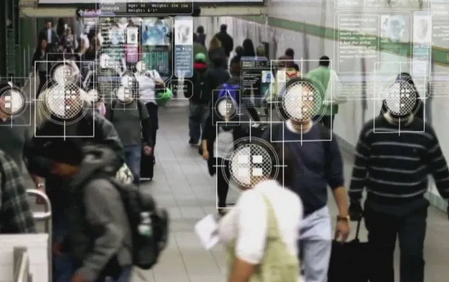 The Canadian Press 08/07/2020 – Dozens of groups and individuals working to protect privacy, human rights and civil liberties want the Trudeau government to ban the use of facial recognition surveillance by federal law-enforcement and intelligence agencies. In an open letter to Public Safety Minister Bill Blair, they call the technology “highly problematic,” given its lack of accuracy and invasive nature, and say it poses a threat to Canadians’ fundamental rights. They tell the minister that in the absence of meaningful policy or regulation governing facial recognition, it cannot be considered safe for use in Canada. The letter is signed by Tim McSorley, national co-ordinator of the Ottawa-based International Civil Liberties Monitoring Group, and Laura Tribe, executive director of Open Media, who are spearheading the campaign. Read more
The Canadian Press 08/07/2020 – Dozens of groups and individuals working to protect privacy, human rights and civil liberties want the Trudeau government to ban the use of facial recognition surveillance by federal law-enforcement and intelligence agencies. In an open letter to Public Safety Minister Bill Blair, they call the technology “highly problematic,” given its lack of accuracy and invasive nature, and say it poses a threat to Canadians’ fundamental rights. They tell the minister that in the absence of meaningful policy or regulation governing facial recognition, it cannot be considered safe for use in Canada. The letter is signed by Tim McSorley, national co-ordinator of the Ottawa-based International Civil Liberties Monitoring Group, and Laura Tribe, executive director of Open Media, who are spearheading the campaign. Read more
Questions from the Just Governance Group, Answers by Tim McSorley
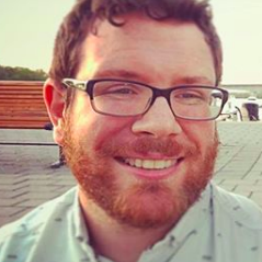 Multiples 07/2020 – JGG: Why are human rights and democratic mechanisms so vulnerable amid health emergencies such as the COVID-19 pandemic? Tim McSorley: It’s important to recognize that even outside of a time of emergency, human rights protections and democratic institutions are often partially or completely unavailable for a large portion of the population. We see this lack of access in our work on national-security related issues at the ICLMG, including racial profiling, diminished rights due to surveillance and secret trials, and restrictions on fundamental rights like freedom of expression, assembly and movement.
Multiples 07/2020 – JGG: Why are human rights and democratic mechanisms so vulnerable amid health emergencies such as the COVID-19 pandemic? Tim McSorley: It’s important to recognize that even outside of a time of emergency, human rights protections and democratic institutions are often partially or completely unavailable for a large portion of the population. We see this lack of access in our work on national-security related issues at the ICLMG, including racial profiling, diminished rights due to surveillance and secret trials, and restrictions on fundamental rights like freedom of expression, assembly and movement.
This issue plays out in other sectors on a daily basis as well: unequal access to health care, working conditions that undermine physical and mental health, discrimination in the health system, among other concerns. When we are confronted with a health emergency like the COVID-19 pandemic, these rights suffer an entirely new level of threat: systems that were already complicated to navigate become even more difficult as both service providers and service users are attempting to adapt to an entirely new situation. Furthermore, ICLMG has documented how the “emergency” of the so-called “War on Terror” has given cover for governments to limit access to democratic mechanisms and to undermine human rights. In times of emergency, the public is urged to forego their rights, often on a proposed temporary basis, in order to confront the greater enemy – only to see the restrictions become permanent.
While COVID-19 indeed presents a formidable danger to the public that justifies some extraordinary actions, we have also seen numerous instances of far-reaching emergency power legislation that places severe restrictions on speech, association and movement, grants governments the power to suspend or modify laws for months or even years, limiting access to courts and human rights bodies. Finally, the nature of the pandemic also means that normal oversight bodies, for example government committees, human rights commissions, even the courts, are not operating on a normal basis. So as rights may be violated, those who would normally aide in securing remedies are not available. Read more page 8
CSIS says proposed federal privacy reforms could hinder spy operations
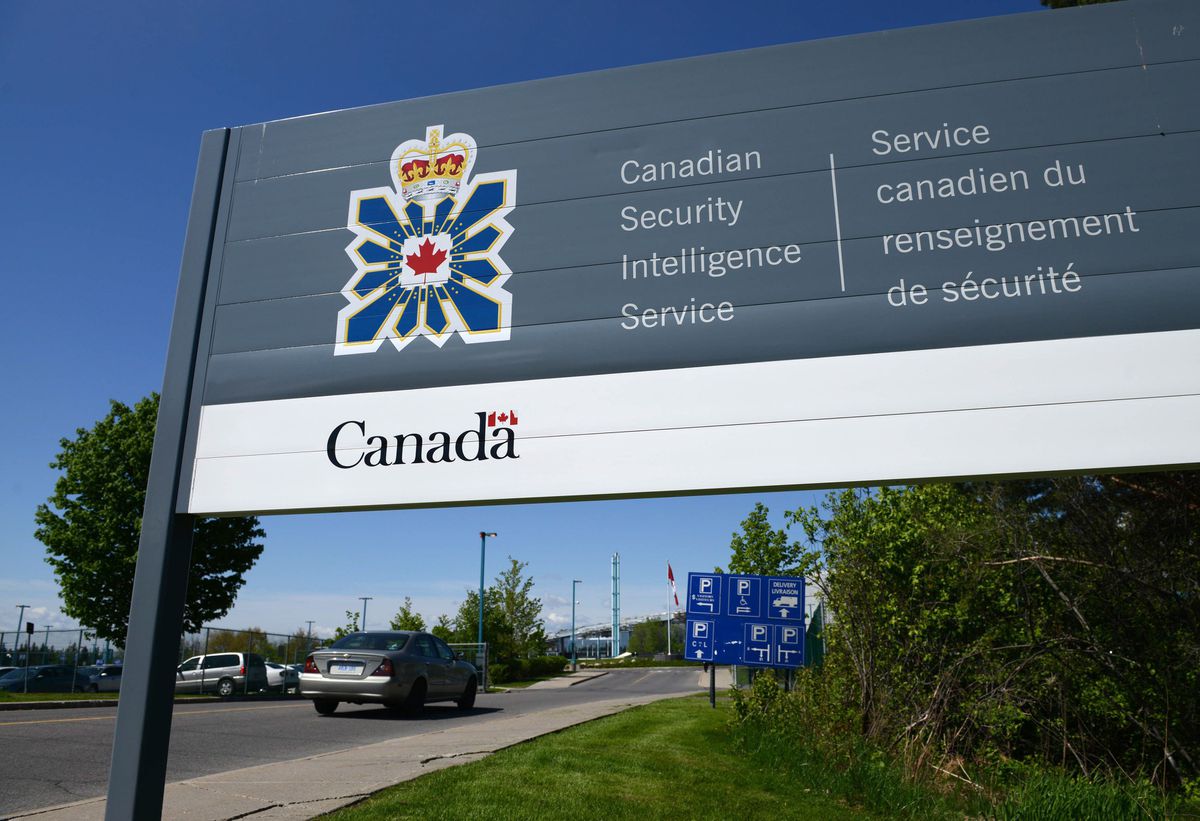 The Canadian Press 17/05/2020 – Defining publicly available information in the Privacy Act as it relates to CSIS would be welcome given a current lack of clarity, said Tim McSorley, national co-ordinator of the Ottawa-based International Civil Liberties Monitoring Group. When citing what constitutes publicly available information, CSIS often uses the example of a telephone directory. McSorley argues the scope is actually much wider, including social media posts and other data found online that can reveal details about someone’s travels, where they work, who they spend time with and even their religious beliefs. “The notion that once information is collected, that there should be a broad exception for security agencies to use it in other manners, raises serious concerns,” he said. CSIS also says privacy law should ensure the intelligence service:
The Canadian Press 17/05/2020 – Defining publicly available information in the Privacy Act as it relates to CSIS would be welcome given a current lack of clarity, said Tim McSorley, national co-ordinator of the Ottawa-based International Civil Liberties Monitoring Group. When citing what constitutes publicly available information, CSIS often uses the example of a telephone directory. McSorley argues the scope is actually much wider, including social media posts and other data found online that can reveal details about someone’s travels, where they work, who they spend time with and even their religious beliefs. “The notion that once information is collected, that there should be a broad exception for security agencies to use it in other manners, raises serious concerns,” he said. CSIS also says privacy law should ensure the intelligence service:
- not be required to disclose the identity of foreign agencies with whom it shares information or the nature of the data exchanges;
- be exempt, in some cases, from informing people their data has been stolen or inadvertently leaked, since that could signal they are under investigation.
Spy databases may hold information about people who do not necessarily pose a threat to security, and a breach of their data should not be hidden from them, McSorley said. “The idea that it could remain secret — it’s really troubling,” he said. Read more
Jim Bronskill: Canada’s spy service moves quietly ahead with data-crunching plans: documents
 The Canadian Press 30/03/2020 – The government should give Canadians a better sense of the kind of information CSIS is now allowed to exploit, given the existing dangers of falsely identifying people as security threats, said Tim McSorley, national co-ordinator of the Ottawa-based International Civil Liberties Monitoring Group. “It would help to ensure that Canadians’ rights are being protected,” McSorley said in an interview. In a broader sense, McSorley questioned whether “we want to be moving in this direction of intelligence agencies collecting and retaining vast amounts of information?” Memos disclosed to The Canadian Press under the Access to Information Act show CSIS set the process in motion last July with a request to Ralph Goodale, public safety minister at the time. […] Eligible data sets should be limited to information that is demonstrably linked to a threat to Canadian security, not data that is simply likely to help CSIS identify eventual threats, said McSorley. For instance, a data set might include information about Canadians who travel to and from certain countries of interest to CSIS. McSorley questions if it makes sense for the intelligence service to retain that sort of information when many Canadians in the database might have legitimate reasons for making such trips. At the very least, there could be more public disclosure about the destinations of interest, he said. “I think they could do that without damaging Canada’s national security.” Read more
The Canadian Press 30/03/2020 – The government should give Canadians a better sense of the kind of information CSIS is now allowed to exploit, given the existing dangers of falsely identifying people as security threats, said Tim McSorley, national co-ordinator of the Ottawa-based International Civil Liberties Monitoring Group. “It would help to ensure that Canadians’ rights are being protected,” McSorley said in an interview. In a broader sense, McSorley questioned whether “we want to be moving in this direction of intelligence agencies collecting and retaining vast amounts of information?” Memos disclosed to The Canadian Press under the Access to Information Act show CSIS set the process in motion last July with a request to Ralph Goodale, public safety minister at the time. […] Eligible data sets should be limited to information that is demonstrably linked to a threat to Canadian security, not data that is simply likely to help CSIS identify eventual threats, said McSorley. For instance, a data set might include information about Canadians who travel to and from certain countries of interest to CSIS. McSorley questions if it makes sense for the intelligence service to retain that sort of information when many Canadians in the database might have legitimate reasons for making such trips. At the very least, there could be more public disclosure about the destinations of interest, he said. “I think they could do that without damaging Canada’s national security.” Read more
Groups demand Ottawa take action over CSIS discrimination claims
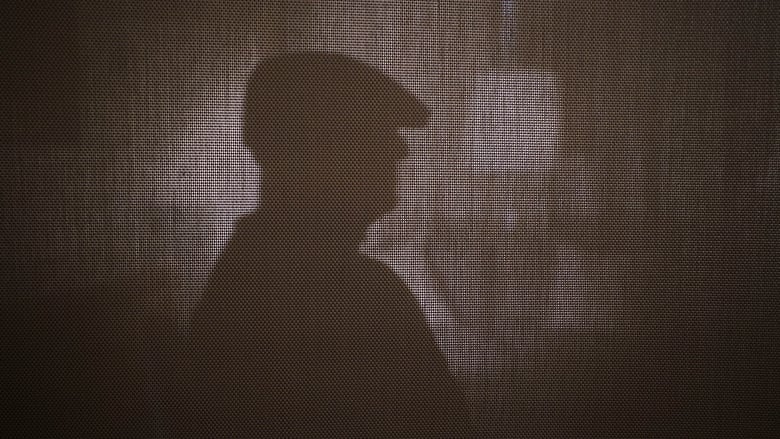 CBC News 30/01/2020 – The letter to the public safety minister, also signed by the Canadian Civil Liberties Association and the International Civil Liberties Monitoring Group, references past lawsuits by minority CSIS employees that were eventually settled out of court. It also questions the spy agency’s repeated claims that it has zero tolerance for discrimination in its workplace. […] Tim McSorley, the national co-ordinator of the International Civil Liberties Monitoring Group — a coalition of 46 NGOs, unions, professional associations, faith groups and environmental organizations — said the allegations of discrimination within CSIS raise questions about the agency’s external mindset, too. “It really resonates around those issues of how CSIS approaches the Muslim community at large, if this is what happens to people within their own workplace,” McSorley said. “If this is how they treat a colleague and how they react to somebody’s background and religion in the workplace, particularly someone of the Muslim faith, then what does that signal to the communities that they are meant to be protecting?” McSorley said his group is hopeful that the Liberal government will take meaningful action to make the intelligence service more accountable to both Parliament and the public. “[The government] has talked a lot about bringing more transparency,” he said. “I think this provides another real opportunity to them to make good on that.” Read more
CBC News 30/01/2020 – The letter to the public safety minister, also signed by the Canadian Civil Liberties Association and the International Civil Liberties Monitoring Group, references past lawsuits by minority CSIS employees that were eventually settled out of court. It also questions the spy agency’s repeated claims that it has zero tolerance for discrimination in its workplace. […] Tim McSorley, the national co-ordinator of the International Civil Liberties Monitoring Group — a coalition of 46 NGOs, unions, professional associations, faith groups and environmental organizations — said the allegations of discrimination within CSIS raise questions about the agency’s external mindset, too. “It really resonates around those issues of how CSIS approaches the Muslim community at large, if this is what happens to people within their own workplace,” McSorley said. “If this is how they treat a colleague and how they react to somebody’s background and religion in the workplace, particularly someone of the Muslim faith, then what does that signal to the communities that they are meant to be protecting?” McSorley said his group is hopeful that the Liberal government will take meaningful action to make the intelligence service more accountable to both Parliament and the public. “[The government] has talked a lot about bringing more transparency,” he said. “I think this provides another real opportunity to them to make good on that.” Read more
Algerian man fights to stay in Canada after years of uncertainty
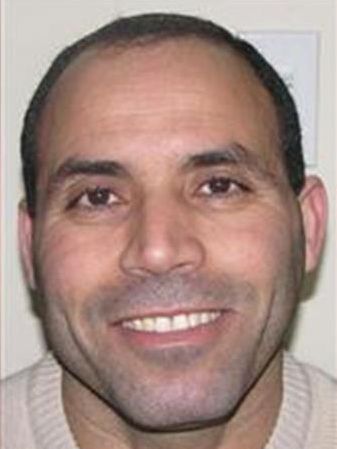 Al Jazeera 16/12/2019 – “It feels absurd. It’s really Kafkaesque,” said Tim McSorley, national coordinator at the International Civil Liberties Monitoring Group, an advocacy organisation in Ottawa, about the security certificates system. McSorley explained that security certificates are “applied as an anti-terrorism tool and because of that they are done in a large degree of secrecy”. The accused in these cases are “not being charged with a crime, they’re not going to a criminal court, they don’t have the same rights to defend themselves”, he told Al Jazeera. […] Harkat’s lawyer, Barbara Jackman, told Al Jazeera she filed for a judicial review of his deportation order in November 2018. But the federal court still has not received all the information on which the government based its removal decision, she said, and without the complete record, it is unclear when the case will proceed. Jackman described the government’s behaviour in Harkat’s case as “perverse”. “I think it’s just face-saving,” she said, about why she believes the government has not dropped the case. “I think that they spent so much money and invested so much in it that they can’t be seen as saying, ‘OK, this isn’t well founded’… I think it’s perverse in terms of what they’re doing and how long they’ve been doing it.” Read more
Al Jazeera 16/12/2019 – “It feels absurd. It’s really Kafkaesque,” said Tim McSorley, national coordinator at the International Civil Liberties Monitoring Group, an advocacy organisation in Ottawa, about the security certificates system. McSorley explained that security certificates are “applied as an anti-terrorism tool and because of that they are done in a large degree of secrecy”. The accused in these cases are “not being charged with a crime, they’re not going to a criminal court, they don’t have the same rights to defend themselves”, he told Al Jazeera. […] Harkat’s lawyer, Barbara Jackman, told Al Jazeera she filed for a judicial review of his deportation order in November 2018. But the federal court still has not received all the information on which the government based its removal decision, she said, and without the complete record, it is unclear when the case will proceed. Jackman described the government’s behaviour in Harkat’s case as “perverse”. “I think it’s just face-saving,” she said, about why she believes the government has not dropped the case. “I think that they spent so much money and invested so much in it that they can’t be seen as saying, ‘OK, this isn’t well founded’… I think it’s perverse in terms of what they’re doing and how long they’ve been doing it.” Read more
Why Is The State Of Civil Liberties Missing From Canada’s Election Campaign? Podcast featuring Tim McSorley
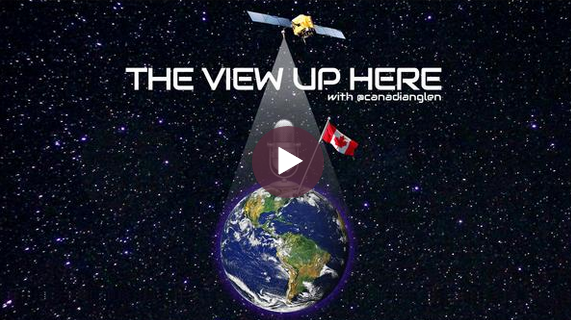 The View Up Here 18/09/2019 – Tim McSorley is National Coordinator for the International Civil Liberties Monitoring Group and he returns to The View Up Here to discuss a few of the many glaring examples in present-day Canada where the rhetoric of Openness and Freedom doesn’t match up to the realities. What is at risk to all Canadians in ignoring the problems in our Intelligence Agencies?
The View Up Here 18/09/2019 – Tim McSorley is National Coordinator for the International Civil Liberties Monitoring Group and he returns to The View Up Here to discuss a few of the many glaring examples in present-day Canada where the rhetoric of Openness and Freedom doesn’t match up to the realities. What is at risk to all Canadians in ignoring the problems in our Intelligence Agencies?
No-Fly Lists, Databases and Unaccountability – The problems in these systems have existed from the day they were created. No informing citizens of being on a list. No evidenciary disclosure. No appeal process. No redress for removal from a list. In a word- Unconstitutional. CSIS – Controversy never leaves this agency, with good reason. Recent racial and religious profiling failures with no apparent purpose or result have once again cast the agency in a nefarious light. Will they ever be held to following the rules?
Hassan Diab – Despite the past failures involving Maher Arar, Omar Khadr and countless others the evidenciary, deportation and repatriation processes in Canada have been in need of rewrite for decades. Reports and recommendations are never implemented. ICLMG is at the forefront of these efforts and we will discuss them to advance the cause that Canadians are protected by their own Government by default not demand. Listen on Blog Talk Radio + Listen on YouTube
Border officials to start sharing data about U.S., Canadian travellers
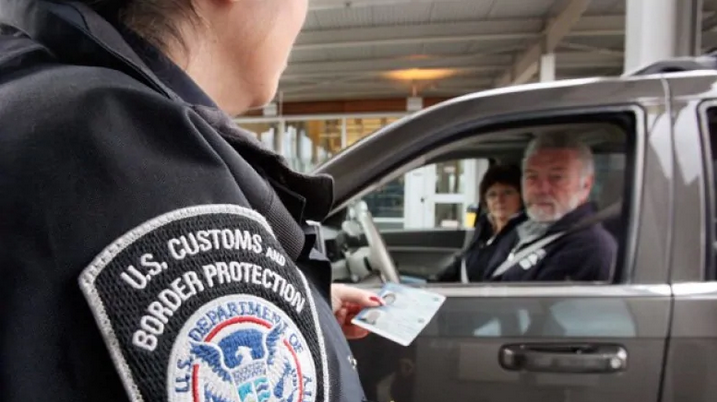 CBC News 13/07/2019 – Border agents will be able to share information about U.S. and Canadian citizens more freely as the third phase of a 2011 border agreement meant to make it easier for trade and travel across the Canada-U.S. border comes into effect. […] The information-sharing agreement has had its share of detractors. During the Senate debate around Bill C-21 — the act that implemented the aforementioned border security measures — concerns were raised about privacy. Last year, the International Civil Liberties Monitoring Group told CBC News that Bill C-21 is “not the most menacing or far-reaching piece of legislation” — but said it feared the push to collect more and more information about Canadians is part of a larger trend toward national security overreach. Read more + Correction from ICLMG
CBC News 13/07/2019 – Border agents will be able to share information about U.S. and Canadian citizens more freely as the third phase of a 2011 border agreement meant to make it easier for trade and travel across the Canada-U.S. border comes into effect. […] The information-sharing agreement has had its share of detractors. During the Senate debate around Bill C-21 — the act that implemented the aforementioned border security measures — concerns were raised about privacy. Last year, the International Civil Liberties Monitoring Group told CBC News that Bill C-21 is “not the most menacing or far-reaching piece of legislation” — but said it feared the push to collect more and more information about Canadians is part of a larger trend toward national security overreach. Read more + Correction from ICLMG
Canada’s national security landscape will get a major overhaul this summer
 CBC News 23/06/2019 – Canada’s national security architecture is about to undergo a major demolition and rebuild this summer, now that C-59 has received royal assent. […] Civil liberty groups have warned that section of C-59 dealing with CSIS and datasets has the potential to usher in mass surveillance. “Once again, Canadian lawmakers have failed to act to ensure that national security laws do not come at the cost of privacy, free expression, due process and government transparency,” said Tim McSorley, national co-ordinator of the Ottawa-based International Civil Liberties Monitoring Group. “The national security field is an opaque one, and staying informed of all the negative consequences of this bill will be difficult.” McSorley said he also sees the potential for problems in a section of the bill granting immunity to CSIS employees if they break certain laws in the course of their work. (RCMP officers already are covered by this type of legislation during investigations.) Read more + One more
CBC News 23/06/2019 – Canada’s national security architecture is about to undergo a major demolition and rebuild this summer, now that C-59 has received royal assent. […] Civil liberty groups have warned that section of C-59 dealing with CSIS and datasets has the potential to usher in mass surveillance. “Once again, Canadian lawmakers have failed to act to ensure that national security laws do not come at the cost of privacy, free expression, due process and government transparency,” said Tim McSorley, national co-ordinator of the Ottawa-based International Civil Liberties Monitoring Group. “The national security field is an opaque one, and staying informed of all the negative consequences of this bill will be difficult.” McSorley said he also sees the potential for problems in a section of the bill granting immunity to CSIS employees if they break certain laws in the course of their work. (RCMP officers already are covered by this type of legislation during investigations.) Read more + One more
Changes to no-fly list coming next year, but civil liberties groups expressing concerns – interview with Tim McSorley
Canada’s military spies can collect, share info on Canadians, directive says
 CTV News 09/06/2019 – Canada’s military spies can collect and share information about Canadian citizens — including material gathered by chance — as long as it supports a legitimate investigation, says a newly disclosed federal directive. The Canadian Press recently obtained a copy of the eight-page, August 2018 directive, “Guidance on the Collection of Canadian Citizen Information,” through the Access to Information Act. […] Tim McSorley, national co-ordinator for the Ottawa-based International Civil Liberties Monitoring Group, finds that troubling given the vast amount of information that swirls daily through the digital sphere. “We’re worried about what it means when they collect inadvertent information,” he said in an interview. “We don’t know the scope or the degree to which Canadians’ information is being captured.” As a result, there should be stronger legislative control and review of the military’s intelligence collection and sharing to ensure it isn’t straying beyond the bounds of privacy law and the Charter of Rights and Freedoms, he said. “There can always be instances of over-reach, and that needs to be kept in check.” Read more
CTV News 09/06/2019 – Canada’s military spies can collect and share information about Canadian citizens — including material gathered by chance — as long as it supports a legitimate investigation, says a newly disclosed federal directive. The Canadian Press recently obtained a copy of the eight-page, August 2018 directive, “Guidance on the Collection of Canadian Citizen Information,” through the Access to Information Act. […] Tim McSorley, national co-ordinator for the Ottawa-based International Civil Liberties Monitoring Group, finds that troubling given the vast amount of information that swirls daily through the digital sphere. “We’re worried about what it means when they collect inadvertent information,” he said in an interview. “We don’t know the scope or the degree to which Canadians’ information is being captured.” As a result, there should be stronger legislative control and review of the military’s intelligence collection and sharing to ensure it isn’t straying beyond the bounds of privacy law and the Charter of Rights and Freedoms, he said. “There can always be instances of over-reach, and that needs to be kept in check.” Read more
Sunday school teacher says she was strip-searched at Vancouver airport after angry guard failed to find drugs
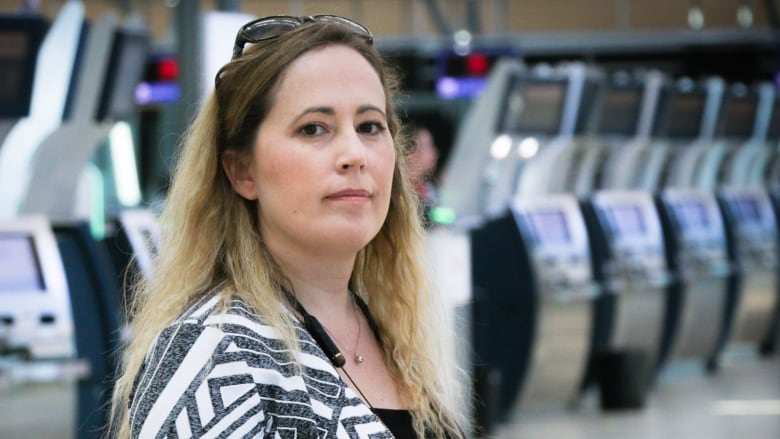 CBC 09/06/2019 – A former Sunday school teacher who was falsely accused of being a drug smuggler, detained at Vancouver International Airport and eventually strip searched says she is still traumatized by the treatment and is calling for greater oversight of the Canada Border Services Agency. Jill Knapp’s run-in with CBSA agents took place on Jan. 9, 2016, on her way home to Calgary, after visiting her husband in Mexico City. The 39-year-old says she is only now speaking out about her experience because she was diagnosed with anxiety after her airport ordeal. […] A request under the Access to Information Act by the CBC reveals other airline travellers have officially complained about mistreatment by border agents including screaming, using foul language, belittling them, using racial profiling and physical force. A civil liberties advocate says the complaints point to the need for independent oversight of the CBSA, the only major law enforcement agency in Canada that doesn’t have external review of employee conduct. “When border agents operate — either at land crossings, at airports — there is very little oversight,” says Tim McSorley, national co-ordinator for the International Civil Liberties Monitoring Group, based in Ottawa. […] “It’s completely unacceptable and … kind of repulsive that people go through this when they’re simply trying to travel to their destination,” says McSorley, who reviewed the complaints. […] McSorley’s organization has been pushing for years for external oversight of the CBSA. Read more
CBC 09/06/2019 – A former Sunday school teacher who was falsely accused of being a drug smuggler, detained at Vancouver International Airport and eventually strip searched says she is still traumatized by the treatment and is calling for greater oversight of the Canada Border Services Agency. Jill Knapp’s run-in with CBSA agents took place on Jan. 9, 2016, on her way home to Calgary, after visiting her husband in Mexico City. The 39-year-old says she is only now speaking out about her experience because she was diagnosed with anxiety after her airport ordeal. […] A request under the Access to Information Act by the CBC reveals other airline travellers have officially complained about mistreatment by border agents including screaming, using foul language, belittling them, using racial profiling and physical force. A civil liberties advocate says the complaints point to the need for independent oversight of the CBSA, the only major law enforcement agency in Canada that doesn’t have external review of employee conduct. “When border agents operate — either at land crossings, at airports — there is very little oversight,” says Tim McSorley, national co-ordinator for the International Civil Liberties Monitoring Group, based in Ottawa. […] “It’s completely unacceptable and … kind of repulsive that people go through this when they’re simply trying to travel to their destination,” says McSorley, who reviewed the complaints. […] McSorley’s organization has been pushing for years for external oversight of the CBSA. Read more
Report on federal role in Hassan Diab’s extradition lands on justice minister’s desk
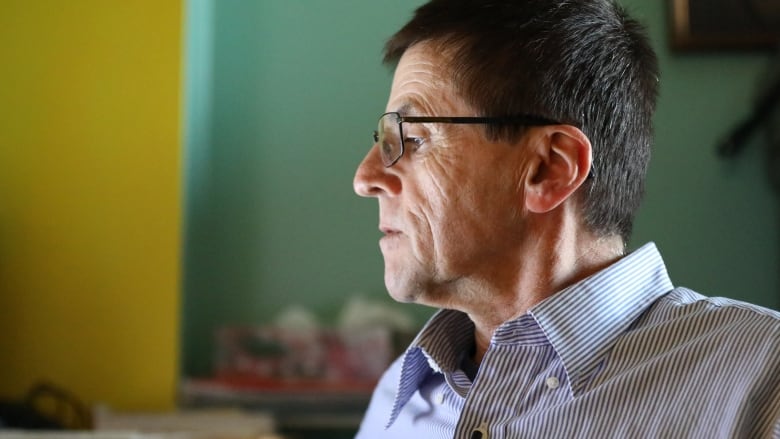 CBC News 28/05/2019 – Former justice minister Jody Wilson-Raybould tasked the former deputy attorney general of Ontario, Murray Segal, with conducting an external review of Diab’s extradition. Diab boycotted Segal’s review. He argued that it fell short of his demand for a judge-led public inquiry with full subpoena power that would allow Diab’s lawyer Don Bayne to cross-examine witnesses. Now that Segal’s work is done, Diab hasn’t changed his mind. “After suffering a decade under virtual house arrest and near solitary confinement in Canada and France, we need to make sure that wrongful extraditions do not take place again,” Diab said in a statement. “I urge the Minister of Justice to order a serious, independent, and transparent public inquiry. Anything short of that will only extend the suffering, and miscarriages of justice will continue.” Bayne said that Segal’s mandate was “deliberately too limited — to avoid the hard questions and issues” that was unable to do a true examination of the Extradition Act. Lametti’s office is studying the report’s findings and its recommendations. It isn’t yet clear when it will be made public. Diab’s supporters want that to happen immediately. “Given the gravity of what Hassan Diab has been through, Mr. Segal’s report should be immediately released. Hassan and the public deserve answers and clarity after his ten-year ordeal,” said Tim McSorley, National Coordinator of the International Civil Liberties Monitoring Group. Other civil liberties groups such as Amnesty International and the B.C. Civil Liberties Association have also pressed for a public inquiry. Read more
CBC News 28/05/2019 – Former justice minister Jody Wilson-Raybould tasked the former deputy attorney general of Ontario, Murray Segal, with conducting an external review of Diab’s extradition. Diab boycotted Segal’s review. He argued that it fell short of his demand for a judge-led public inquiry with full subpoena power that would allow Diab’s lawyer Don Bayne to cross-examine witnesses. Now that Segal’s work is done, Diab hasn’t changed his mind. “After suffering a decade under virtual house arrest and near solitary confinement in Canada and France, we need to make sure that wrongful extraditions do not take place again,” Diab said in a statement. “I urge the Minister of Justice to order a serious, independent, and transparent public inquiry. Anything short of that will only extend the suffering, and miscarriages of justice will continue.” Bayne said that Segal’s mandate was “deliberately too limited — to avoid the hard questions and issues” that was unable to do a true examination of the Extradition Act. Lametti’s office is studying the report’s findings and its recommendations. It isn’t yet clear when it will be made public. Diab’s supporters want that to happen immediately. “Given the gravity of what Hassan Diab has been through, Mr. Segal’s report should be immediately released. Hassan and the public deserve answers and clarity after his ten-year ordeal,” said Tim McSorley, National Coordinator of the International Civil Liberties Monitoring Group. Other civil liberties groups such as Amnesty International and the B.C. Civil Liberties Association have also pressed for a public inquiry. Read more
Bernier to brief reporters on People’s Party status, candidate selection process
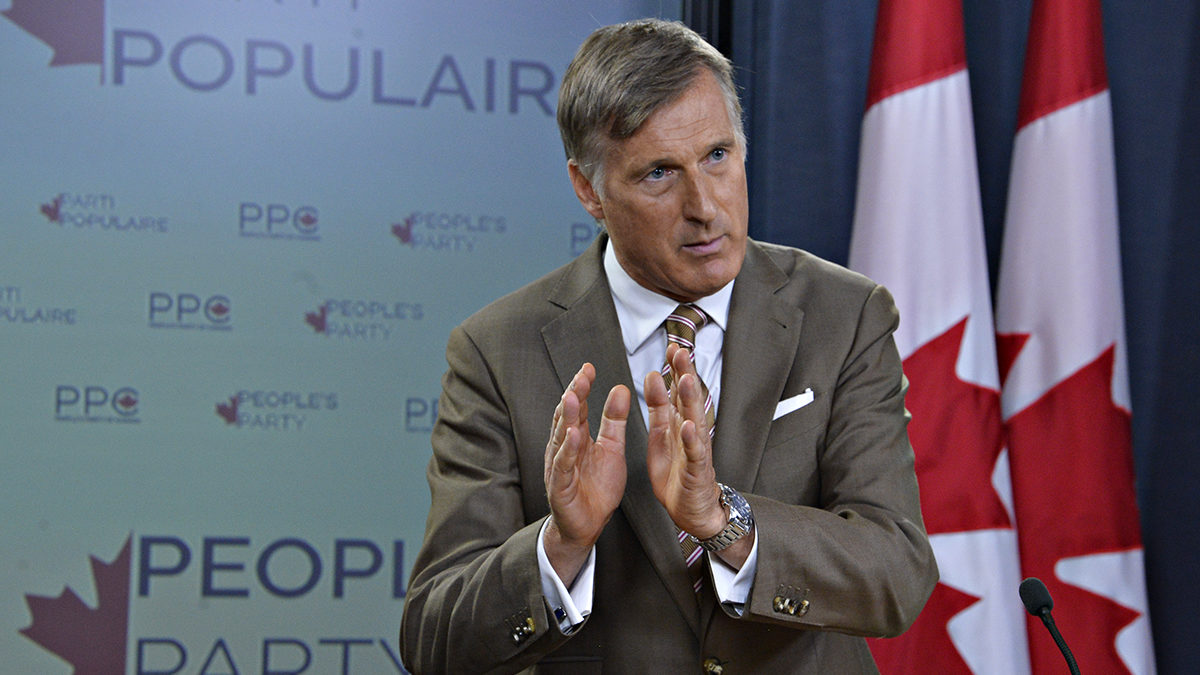 iPolitics 25/03/2019 – Meanwhile, a few blocks from Parliament Hill, representatives from MiningWatch Canada, InterPares, Amnesty International and the International Civil Liberties Monitoring Group will join family members and supporters of slain Mexican activist Mariano Abarca, who, as per the advisory, was “murdered in late 2009 after leading peaceful protests over the impacts of a Canadian-owned mine,” at a rally outside the Federal Court of Canada. The court is being asked to review a decision by the public sector integrity watchdog, who, the advisory notes, “refused to investigate allegations” that officials with the Canadian embassy in Mexico “provided support” to Calgary-based mining company Blackfire Exploration, whose operations were targeted by Abarca. That hearing is expected to get underway today, and will continue through the week. Source
iPolitics 25/03/2019 – Meanwhile, a few blocks from Parliament Hill, representatives from MiningWatch Canada, InterPares, Amnesty International and the International Civil Liberties Monitoring Group will join family members and supporters of slain Mexican activist Mariano Abarca, who, as per the advisory, was “murdered in late 2009 after leading peaceful protests over the impacts of a Canadian-owned mine,” at a rally outside the Federal Court of Canada. The court is being asked to review a decision by the public sector integrity watchdog, who, the advisory notes, “refused to investigate allegations” that officials with the Canadian embassy in Mexico “provided support” to Calgary-based mining company Blackfire Exploration, whose operations were targeted by Abarca. That hearing is expected to get underway today, and will continue through the week. Source
Border agency breaches privacy of refugee claimant
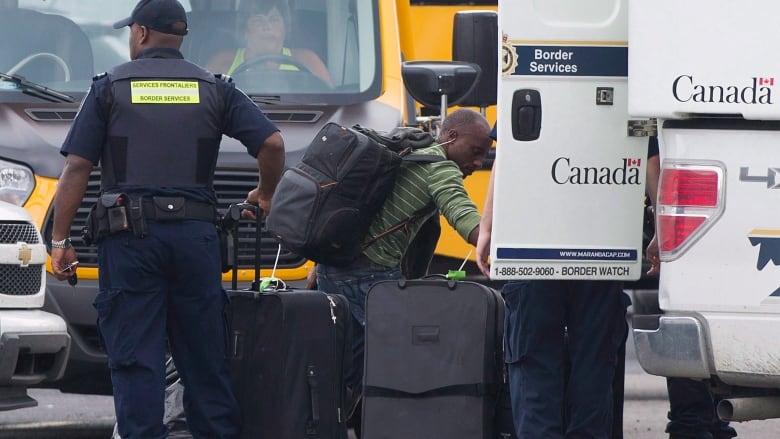 CBC News 03/02/2019 – Canada’s border agency breached a refugee claimant’s privacy when personal information that was encrypted on a USB key disappeared — with the password written on a Post-it note left wrapped around the device. The USB key and the note have never been found and the Canada Border Services Agency (CBSA) failed to report the incident, as required, for more than 18 months. The incident highlights longstanding criticisms of the border service’s commitment to safeguarding personal information. The USB privacy breach occurred on Oct. 7, 2016, after an unidentified man came forward to ask for refugee status in Canada. […] Privacy Commissioner Daniel Therrien also warned that potentially erroneous personal data was being shared routinely with U.S. Customs and Border Protection — and with Canadian public safety partners, such as the RCMP — for possible retention in those agencies’ databases. “CBSA should revise its MOUs (Memoranda of Understanding) with domestic and international partners to ensure they contain specific provisions to limit retention and use of data that is obtained from CBSA for purposes of database checks,” Therrien recommended. “The potential for abuse is enormous,” said Tim McSorley of the Ottawa-based International Civil Liberties Monitoring Group, criticizing the Scenario-Based Targeting system. “CBSA should immediately limit what it shares with U.S. officers.” Read more
CBC News 03/02/2019 – Canada’s border agency breached a refugee claimant’s privacy when personal information that was encrypted on a USB key disappeared — with the password written on a Post-it note left wrapped around the device. The USB key and the note have never been found and the Canada Border Services Agency (CBSA) failed to report the incident, as required, for more than 18 months. The incident highlights longstanding criticisms of the border service’s commitment to safeguarding personal information. The USB privacy breach occurred on Oct. 7, 2016, after an unidentified man came forward to ask for refugee status in Canada. […] Privacy Commissioner Daniel Therrien also warned that potentially erroneous personal data was being shared routinely with U.S. Customs and Border Protection — and with Canadian public safety partners, such as the RCMP — for possible retention in those agencies’ databases. “CBSA should revise its MOUs (Memoranda of Understanding) with domestic and international partners to ensure they contain specific provisions to limit retention and use of data that is obtained from CBSA for purposes of database checks,” Therrien recommended. “The potential for abuse is enormous,” said Tim McSorley of the Ottawa-based International Civil Liberties Monitoring Group, criticizing the Scenario-Based Targeting system. “CBSA should immediately limit what it shares with U.S. officers.” Read more
Documentary about Abousfian Abdelrazik Case Puts CSIS on Trial, Check out Screening in Ottawa this Monday
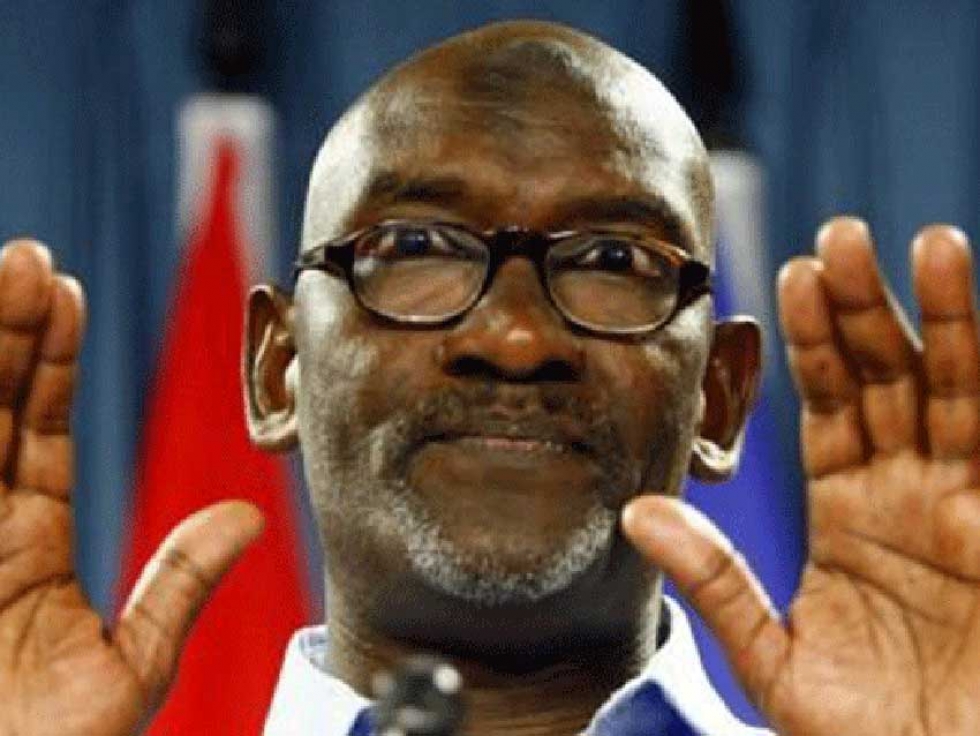 Muslim Link 15/09/2018 – Amnesty International Canada’s Secretary General Alex Neve, Abousfian Abdelrazik, and Paul Champ, Abousfian’s lawyer, will be speaking at an Ottawa screening of the documentary, The Long Way Home, by Aisha Jamal and Ariel Nasr, on Monday, September 17 at Arts Court Ottawa at 7 pm. This event is co-presented by Amnesty International Canada, the International Civil Liberties Monitoring Group, and the National Council of Muslim Canadians (NCCM). MuslimLink.ca’s Editor in Chief Chelby Marie Daigle will be facilitating the panel discussion. The documentary raises important questions about the war on terror, the value of Canadian citizenship and the role and oversight of the Canadian Security Intelligence Service (CSIS). Currently, the Canadian goverment is trying to postpone the trial indefinitely for Abousfian’s $27 million dollar lawsuit. This trial could have seen testimonies about the role of CSIS in Abousfian’s detention and delay in being allowed to return to Canada from Sen. Mobina Jaffer, Conservative MP Deepak Obhrai, Liberal MP Wayne Easter and Quebec MP Maxime Bernier. According to Paul Champ in an interview with the Toronto Star, “the testimony from parliamentarians will show how elected officials were kept in the dark. ‘Mr Abdelrazik’s trial will expose the enormous gaps in the oversight of CSIS and the extent to which the Service believes it can destroy the lives of citizens with impunity.'” Read more – Watch trailer
Muslim Link 15/09/2018 – Amnesty International Canada’s Secretary General Alex Neve, Abousfian Abdelrazik, and Paul Champ, Abousfian’s lawyer, will be speaking at an Ottawa screening of the documentary, The Long Way Home, by Aisha Jamal and Ariel Nasr, on Monday, September 17 at Arts Court Ottawa at 7 pm. This event is co-presented by Amnesty International Canada, the International Civil Liberties Monitoring Group, and the National Council of Muslim Canadians (NCCM). MuslimLink.ca’s Editor in Chief Chelby Marie Daigle will be facilitating the panel discussion. The documentary raises important questions about the war on terror, the value of Canadian citizenship and the role and oversight of the Canadian Security Intelligence Service (CSIS). Currently, the Canadian goverment is trying to postpone the trial indefinitely for Abousfian’s $27 million dollar lawsuit. This trial could have seen testimonies about the role of CSIS in Abousfian’s detention and delay in being allowed to return to Canada from Sen. Mobina Jaffer, Conservative MP Deepak Obhrai, Liberal MP Wayne Easter and Quebec MP Maxime Bernier. According to Paul Champ in an interview with the Toronto Star, “the testimony from parliamentarians will show how elected officials were kept in the dark. ‘Mr Abdelrazik’s trial will expose the enormous gaps in the oversight of CSIS and the extent to which the Service believes it can destroy the lives of citizens with impunity.'” Read more – Watch trailer
Travellers complain about rude, disrespectful Canadian border officers
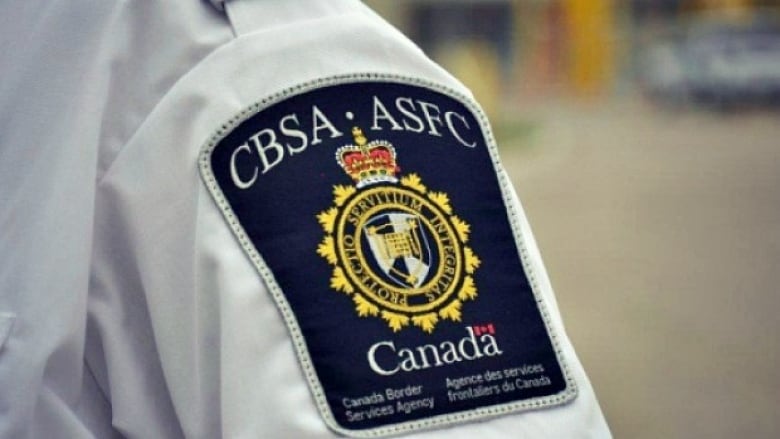 The Canadian Press 04/09/2018 – The Canada Border Services Agency faced more than 100 founded complaints from travellers last year, including allegations of racism and rudeness — and one instance of a woman alleging a border officer yelled at her while she was in medical distress. Data provided to The Canadian Press through access to information legislation said that in 2017-18 these were among the 105 “founded” cases of complaints of officer misconduct — about 12 per cent of 875 misconduct complaints filed in that time. […] Civil liberties groups say the latest collection of incidents shows that Canada needs an independent complaints agency similar to those used to oversee police forces that can produce public reports and make binding recommendations to the agency. As it stands, the definition of “founded” provided by the agency says that “aspects in the allegations made in the complaint were valid.” Tim McSorley, the national co-ordinator of the Toronto-based International Civil Liberties Monitoring Group, said the definition is far too vague to help lead to changes within the agency’s culture or for the public to be properly informed. Nonetheless, he said the limited information shows cause for concern, particularly the allegations of racism, questioning of travellers’ nationality, and name calling. “It shows that the majority of complaints are around respect or disrespect for travellers. …For us, in particular, the incidents of racism [from border officers] are something in our work we’ve heard more about whether from Canadian citizens, or travellers from abroad,” he said during an interview. Read more – Article 2 – Article 3
The Canadian Press 04/09/2018 – The Canada Border Services Agency faced more than 100 founded complaints from travellers last year, including allegations of racism and rudeness — and one instance of a woman alleging a border officer yelled at her while she was in medical distress. Data provided to The Canadian Press through access to information legislation said that in 2017-18 these were among the 105 “founded” cases of complaints of officer misconduct — about 12 per cent of 875 misconduct complaints filed in that time. […] Civil liberties groups say the latest collection of incidents shows that Canada needs an independent complaints agency similar to those used to oversee police forces that can produce public reports and make binding recommendations to the agency. As it stands, the definition of “founded” provided by the agency says that “aspects in the allegations made in the complaint were valid.” Tim McSorley, the national co-ordinator of the Toronto-based International Civil Liberties Monitoring Group, said the definition is far too vague to help lead to changes within the agency’s culture or for the public to be properly informed. Nonetheless, he said the limited information shows cause for concern, particularly the allegations of racism, questioning of travellers’ nationality, and name calling. “It shows that the majority of complaints are around respect or disrespect for travellers. …For us, in particular, the incidents of racism [from border officers] are something in our work we’ve heard more about whether from Canadian citizens, or travellers from abroad,” he said during an interview. Read more – Article 2 – Article 3
Refugee advocates broadcast ‘urgent concerns’ about Bill Blair’s new federal cabinet role
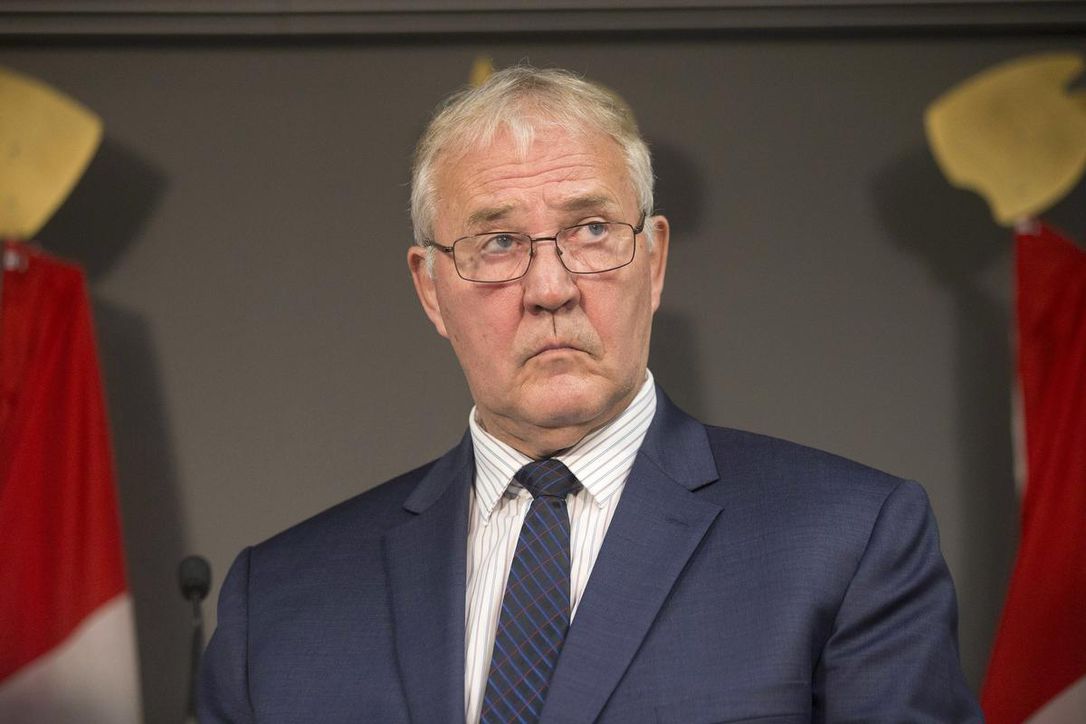 The Toronto Star 09/08/2018 – A collective of human rights groups and refugee advocates is raising “urgent concerns” about the Trudeau government’s minister of border security and organized crime reduction. They say the new cabinet role creates more confusion about Ottawa’s handling of refugee claimants and risks fanning prejudice toward asylum seekers crossing into Canada from the United States. “This development stands to deepen public fears, misunderstandings and stereotypes,” the groups wrote in an open letter to Prime Minister Justin Trudeau that was signed by Amnesty International Canada, the Canadian Council for Refugees, the International Civil Liberties Monitoring Group and six other organizations. Read more – Article 2 – Article 3
The Toronto Star 09/08/2018 – A collective of human rights groups and refugee advocates is raising “urgent concerns” about the Trudeau government’s minister of border security and organized crime reduction. They say the new cabinet role creates more confusion about Ottawa’s handling of refugee claimants and risks fanning prejudice toward asylum seekers crossing into Canada from the United States. “This development stands to deepen public fears, misunderstandings and stereotypes,” the groups wrote in an open letter to Prime Minister Justin Trudeau that was signed by Amnesty International Canada, the Canadian Council for Refugees, the International Civil Liberties Monitoring Group and six other organizations. Read more – Article 2 – Article 3
Tim McSorley on the Global National
Global National 09/08/2018 – Our National CoordinatorTim McSorley spoke on the Global National about the new Border Security Ministry. His segment starts at 8:25. Watch
Australian govt urged to abandon decryption legislation
CRN Australia 18/07/2018 – A cohort of 76 technology-interested organisations, companies and individuals spanning several countries have signed a letter addressed to federal MPs, including cybersecurity minister Angus Taylor, pleading with the federal government not to pursue decryption legislation. Source
Ottawa’s push to share more border-crossing data with U.S. raising red flags over privacy
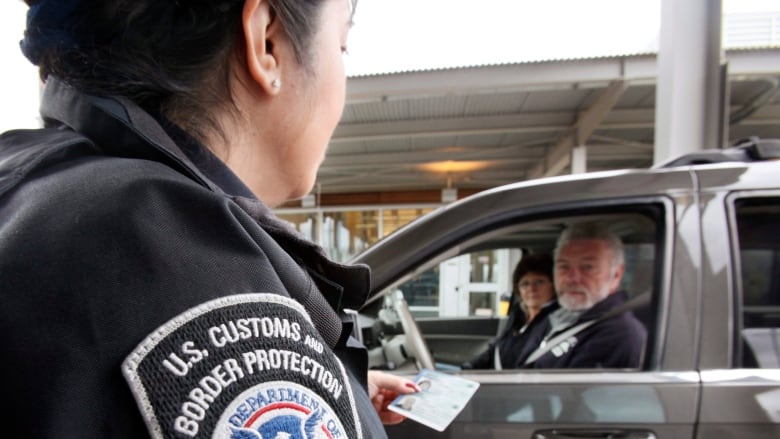 CBC News 28/06/2018 – International Civil Liberties Monitoring Group says the push to collect more and more information about Canadians is part of a larger trend toward national security overreach. Anne Dagenais Guertin, the research and communications coordinator at the group, told CBC News: “These small, incremental pieces of legislation slowly and slowly chip away at our liberties and privacy rights. I think Canadians should be concerned with any government having too much information on them.” The Commons committee amended the bill to limit how long this information can be kept on record to just 15 years. Guertin said that still seems far too long given that the bill has been sold as a way to stop crime and terrorism in the immediate term. “Why would you need information to be retained for that long? It’s going to create a huge profile on Canadians and their travel patterns for 15 years. It’s a total overreach.” Read more
CBC News 28/06/2018 – International Civil Liberties Monitoring Group says the push to collect more and more information about Canadians is part of a larger trend toward national security overreach. Anne Dagenais Guertin, the research and communications coordinator at the group, told CBC News: “These small, incremental pieces of legislation slowly and slowly chip away at our liberties and privacy rights. I think Canadians should be concerned with any government having too much information on them.” The Commons committee amended the bill to limit how long this information can be kept on record to just 15 years. Guertin said that still seems far too long given that the bill has been sold as a way to stop crime and terrorism in the immediate term. “Why would you need information to be retained for that long? It’s going to create a huge profile on Canadians and their travel patterns for 15 years. It’s a total overreach.” Read more
Harkat supporters to rally Monday against deportation bid
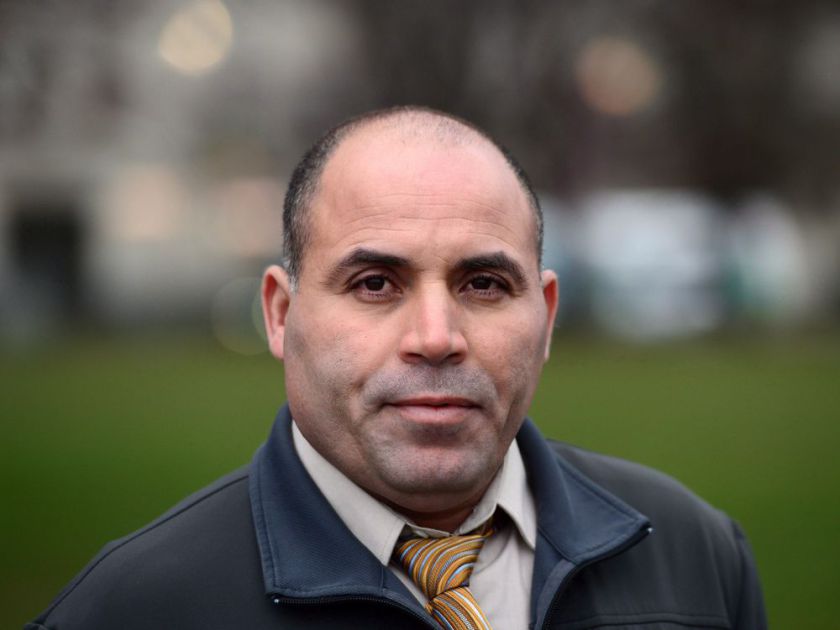 Ottawa Citizen 22/06/2018 – Supporters of Mohamed Harkat are to rally Monday to call on Prime Minister Justin Trudeau to end the government’s bid to deport him to potentially face torture in Algeria. It’s nearly 16 years into his legal odyssey as he awaits word on a decision on immigration officials’ submission he should be returned to his homeland and on his own request for a ministerial exemption to let him stay in Canada. Speakers at the 11 a.m. event at the corner of Wellington and Elgin streets are to include Tim McSorley of the International Civil Liberties Monitoring Group and Alex Neve of Amnesty International who have worked “tirelessly” on Harkat’s behalf, according to his wife, Sophie Harkat. Read more
Ottawa Citizen 22/06/2018 – Supporters of Mohamed Harkat are to rally Monday to call on Prime Minister Justin Trudeau to end the government’s bid to deport him to potentially face torture in Algeria. It’s nearly 16 years into his legal odyssey as he awaits word on a decision on immigration officials’ submission he should be returned to his homeland and on his own request for a ministerial exemption to let him stay in Canada. Speakers at the 11 a.m. event at the corner of Wellington and Elgin streets are to include Tim McSorley of the International Civil Liberties Monitoring Group and Alex Neve of Amnesty International who have worked “tirelessly” on Harkat’s behalf, according to his wife, Sophie Harkat. Read more
Surveillance, secret trials and Bill C-59’s attack on the Charter
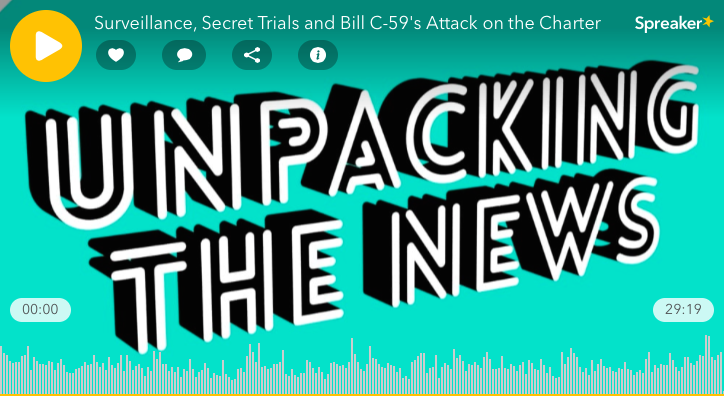 Ricochet & Unpacking the News Podcast 06/06/2018 – On this episode, guest Tim McSorley of the International Civil Liberties Monitoring Group explains how the National Security Act of 2017 (Bill C-59) creates the legal conditions for mass surveillance, legalizes cyberattacks by Canada’s Communications Security Establishment and allows for secret trials (with secret evidence) for anyone on the ‘no fly list’. Plus: Tim provides a brief history of the Canadian Security Intelligence Service and we explore the fundamental differences in how Canadians and Americans view the Canadian Charter of Rights and Freedoms and the U.S. Constitution. Listen
Ricochet & Unpacking the News Podcast 06/06/2018 – On this episode, guest Tim McSorley of the International Civil Liberties Monitoring Group explains how the National Security Act of 2017 (Bill C-59) creates the legal conditions for mass surveillance, legalizes cyberattacks by Canada’s Communications Security Establishment and allows for secret trials (with secret evidence) for anyone on the ‘no fly list’. Plus: Tim provides a brief history of the Canadian Security Intelligence Service and we explore the fundamental differences in how Canadians and Americans view the Canadian Charter of Rights and Freedoms and the U.S. Constitution. Listen
Canada’s high extradition rate spurs calls for reform
 CBC News 30/05/2018 – The Canadian Association of University Teachers (CAUT), the Canadian Union of Public Employees (CUPE), the Canadian Union of Postal Workers (CUPW) and the International Civil Liberties Monitoring Group (ICLMG) have joined Amnesty International and the BCCLA in calling for a public inquiry into Diab’s extradition. The coalition is demanding a thorough, independent examination of Canada’s Extradition Act with a view to substantial reform. Questions also must be asked about the degree to which racial and religious profiling played a role in the application of Canadian extradition law in Diab’s case, said a press release issued by the coalition on Tuesday. “We don’t have confidence that an internal review will answer those questions,” said Tim McSorley, ICLMG’s national coordinator. It remains unclear whether the strategies used by Crown lawyers to ensure Diab’s extradition are being used in current extradition cases, said McSorley. “So if we have a situation where an internal review is being carried out by the same people who agreed with those policies in the first place, that raises serious concerns about independence,” he said. “And so, we think what’s really needed is a public and independent inquiry.” Read more
CBC News 30/05/2018 – The Canadian Association of University Teachers (CAUT), the Canadian Union of Public Employees (CUPE), the Canadian Union of Postal Workers (CUPW) and the International Civil Liberties Monitoring Group (ICLMG) have joined Amnesty International and the BCCLA in calling for a public inquiry into Diab’s extradition. The coalition is demanding a thorough, independent examination of Canada’s Extradition Act with a view to substantial reform. Questions also must be asked about the degree to which racial and religious profiling played a role in the application of Canadian extradition law in Diab’s case, said a press release issued by the coalition on Tuesday. “We don’t have confidence that an internal review will answer those questions,” said Tim McSorley, ICLMG’s national coordinator. It remains unclear whether the strategies used by Crown lawyers to ensure Diab’s extradition are being used in current extradition cases, said McSorley. “So if we have a situation where an internal review is being carried out by the same people who agreed with those policies in the first place, that raises serious concerns about independence,” he said. “And so, we think what’s really needed is a public and independent inquiry.” Read more
State Of Civil Liberties In Canada and RightsCon Hits Toronto with Tim McSorley
The View Up Here 09/05/2018 – Considering the lack of reporting by corporate media on the state of Civil Liberties in Canada, you could assume things are just fine. But that is all it would be – an assumption. A carefully crafted one that has been molded since Day One of the Trudeau government. Remember how the Liberals would “fix the problematic elements” of Harpe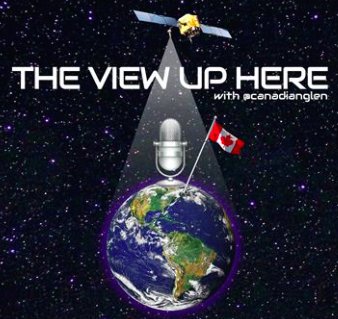 r’s C-51? As we near three years of the mandate, C-59 is crawling its way through Parliament doing pretty much what C-51 did. Ignoring evidence, voting down amendments, not listening to testimony or case study from around the world where such laws have failed before. But fear not, Minister of Public Safety Ralph Goodale says All Is Well. LOL it most certainly is not. Hassan Diab is a Canadian citizen, professor, husband and father. He has spent the last decade being the subject of a wild goose chase by France for a terror attack decades ago. He spent 38 months of near solitary confinement in a French prison, without being charged with anything. This year, a French judge finally threw the case out and ordered Diab returned to his family in Canada. But how could this happen? Where would such falsely incriminating evidence come from? Why would it waste a decade of his life? Well…ask the Canadian Department of Justice. They were the ones who lied, obstructed and denied his rights as he was extradited to France. RightsCon is coming to Toronto in a week. Over 2000 participants from more than 140 countries, delivering nearly 300 sessions with participation from over 700 governments, NGOs and corporations. Everything about what is coming for rights, technology, connectivity and the risks involved. The ICLMG will be part of it, and National Co-ordinator Tim McSorley returns to The View Up Here to discuss RightsCon, the Diab travesty and his recent days of live-tweeting C-59 in Committee. Know the State of your Rights, Canada. Listen
r’s C-51? As we near three years of the mandate, C-59 is crawling its way through Parliament doing pretty much what C-51 did. Ignoring evidence, voting down amendments, not listening to testimony or case study from around the world where such laws have failed before. But fear not, Minister of Public Safety Ralph Goodale says All Is Well. LOL it most certainly is not. Hassan Diab is a Canadian citizen, professor, husband and father. He has spent the last decade being the subject of a wild goose chase by France for a terror attack decades ago. He spent 38 months of near solitary confinement in a French prison, without being charged with anything. This year, a French judge finally threw the case out and ordered Diab returned to his family in Canada. But how could this happen? Where would such falsely incriminating evidence come from? Why would it waste a decade of his life? Well…ask the Canadian Department of Justice. They were the ones who lied, obstructed and denied his rights as he was extradited to France. RightsCon is coming to Toronto in a week. Over 2000 participants from more than 140 countries, delivering nearly 300 sessions with participation from over 700 governments, NGOs and corporations. Everything about what is coming for rights, technology, connectivity and the risks involved. The ICLMG will be part of it, and National Co-ordinator Tim McSorley returns to The View Up Here to discuss RightsCon, the Diab travesty and his recent days of live-tweeting C-59 in Committee. Know the State of your Rights, Canada. Listen
Political Policing, State Surveillance and Bill C-59
![]() CKCU 93.1 FM 08/05/2018 – On this show we look at political policing, state surveillance of activists and oppressed communities, and Bill C-59, An Act respecting national security matters. I’ll be interviewing Tim McSorley and Yavar Hameed. Tim McSorley is the National Coordinator of the International Civil Liberties Monitoring Group. Yavar Hameed is an Ottawa-based lawyer specializing in immigration detention, citizenship, and security certificates. Listen
CKCU 93.1 FM 08/05/2018 – On this show we look at political policing, state surveillance of activists and oppressed communities, and Bill C-59, An Act respecting national security matters. I’ll be interviewing Tim McSorley and Yavar Hameed. Tim McSorley is the National Coordinator of the International Civil Liberties Monitoring Group. Yavar Hameed is an Ottawa-based lawyer specializing in immigration detention, citizenship, and security certificates. Listen
Liberal-dominated committee rejecting many proposed changes to security bill

CityNews 23/04/2018 – Tim McSorley of the Ottawa-based International Civil Liberties Monitoring Group had been hoping for acceptance of several changes, including measures to strengthen the independence of new security review bodies. Heading into Monday’s hearing, the group was concerned “that some of the more important amendments aren’t being adopted into the bill.” Read more + Read summary of committee meetings
‘No threat’: Civil liberties groups support Chelsea Manning’s bid to cross Canadian border
 CBC News 23/10/2017 – A Canadian lawyer representing Chelsea Manning has formally requested the Canadian government reconsider its decision to block the American leaker of classified documents from entering the country. In support, more than 40 civil liberties groups, human rights advocates, privacy scholars, and academics have sent letters to the Canadian government highlighting Manning’s advocacy for government transparency, prisoners’ rights, and the LGTBQ community. They argue she poses no threat to the public safety of Canada or Canadians. Read more
CBC News 23/10/2017 – A Canadian lawyer representing Chelsea Manning has formally requested the Canadian government reconsider its decision to block the American leaker of classified documents from entering the country. In support, more than 40 civil liberties groups, human rights advocates, privacy scholars, and academics have sent letters to the Canadian government highlighting Manning’s advocacy for government transparency, prisoners’ rights, and the LGTBQ community. They argue she poses no threat to the public safety of Canada or Canadians. Read more
‘You wonder what the government is trying to hide’
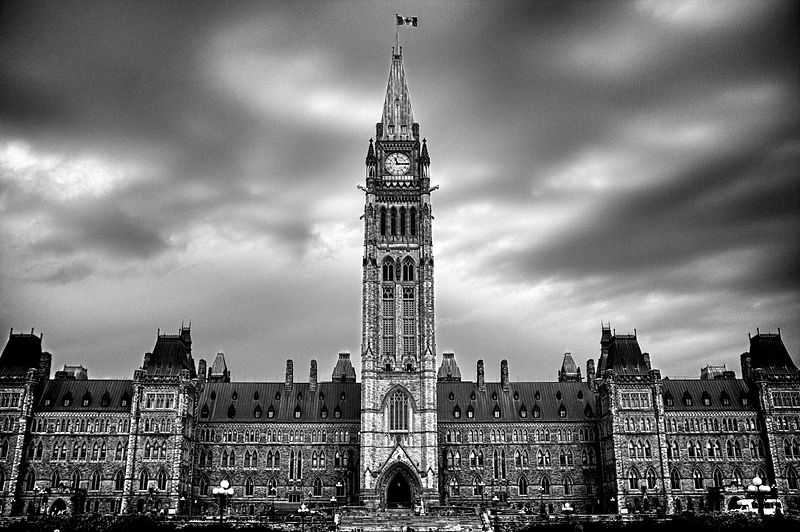 iPolitics 13/10/2017 – Civil rights advocates are calling on the government to withdraw its attempt to quash a human rights tribunal probe into whether the RCMP engaged in racial profiling when Mounties raided the home of an Ottawa man — saying the secrecy surrounding the case only makes them wonder what the police want to keep hidden from the public. Tim McSorley, national coordinator of the International Civil Liberties Monitoring Group, said the government’s efforts to quash the tribunal review throw into doubt how committed they really to improving law enforcement accountability in matters of national security. He also called on the government to let the tribunal proceed with investigating the complaint, which he said “could be a test case in how open the government is willing to be in actually discussing national security issues, concerns around profiling and really living up to their word.” Read more
iPolitics 13/10/2017 – Civil rights advocates are calling on the government to withdraw its attempt to quash a human rights tribunal probe into whether the RCMP engaged in racial profiling when Mounties raided the home of an Ottawa man — saying the secrecy surrounding the case only makes them wonder what the police want to keep hidden from the public. Tim McSorley, national coordinator of the International Civil Liberties Monitoring Group, said the government’s efforts to quash the tribunal review throw into doubt how committed they really to improving law enforcement accountability in matters of national security. He also called on the government to let the tribunal proceed with investigating the complaint, which he said “could be a test case in how open the government is willing to be in actually discussing national security issues, concerns around profiling and really living up to their word.” Read more
Renseignement personnel et protection de la vie privée : la notion du consentement sous la loupe
 Radio-Canada 22/09/2017 – 92% des Canadiens sont préoccupés par la protection de leurs renseignements personnels. Ils craignent que les nouvelles technologies et les nouveaux modèles d’affaires leur en aient fait perdre le contrôle. C’est ce qui ressort du rapport du Commissaire à la protection de la vie privée présenté à Ottawa. Tim McSorley, le coordonnateur national de la Coalition pour la surveillance internationale des libertés civiles, nous offre ce matin une analyse approfondie de ce rapport et revient sur la notion du consentement dans le dévoilement et le partage de nos renseignements personnels en ligne. Listen
Radio-Canada 22/09/2017 – 92% des Canadiens sont préoccupés par la protection de leurs renseignements personnels. Ils craignent que les nouvelles technologies et les nouveaux modèles d’affaires leur en aient fait perdre le contrôle. C’est ce qui ressort du rapport du Commissaire à la protection de la vie privée présenté à Ottawa. Tim McSorley, le coordonnateur national de la Coalition pour la surveillance internationale des libertés civiles, nous offre ce matin une analyse approfondie de ce rapport et revient sur la notion du consentement dans le dévoilement et le partage de nos renseignements personnels en ligne. Listen
Liberal security bill doesn’t go far enough to protect rights, groups say
 The Canadian Press 19/10/2017 – Dozens of leading civil society voices are calling for changes to the Liberal government’s national security bill to protect privacy and freedoms — the latest sign the high-profile legislation could be in for a rocky ride. The parties, including Amnesty International Canada, the Canadian Civil Liberties Association, the Canadian Muslim Lawyers Association and the International Civil Liberties Monitoring Group, outlined their concerns in a letter, made public Tuesday, to the ministers of public safety, justice and immigration. The letter is also signed by several academics from the fields of history, law, privacy and technology. The groups and individuals calling for change in the letter say that while the bill makes some meaningful and necessary improvements to the national security regime, it fails to reverse the overall thrust of the Tory measures in C-51 and introduces serious new problems. Read more
The Canadian Press 19/10/2017 – Dozens of leading civil society voices are calling for changes to the Liberal government’s national security bill to protect privacy and freedoms — the latest sign the high-profile legislation could be in for a rocky ride. The parties, including Amnesty International Canada, the Canadian Civil Liberties Association, the Canadian Muslim Lawyers Association and the International Civil Liberties Monitoring Group, outlined their concerns in a letter, made public Tuesday, to the ministers of public safety, justice and immigration. The letter is also signed by several academics from the fields of history, law, privacy and technology. The groups and individuals calling for change in the letter say that while the bill makes some meaningful and necessary improvements to the national security regime, it fails to reverse the overall thrust of the Tory measures in C-51 and introduces serious new problems. Read more
Canada Border Services Agency sharing information on American border crossings with Homeland Security
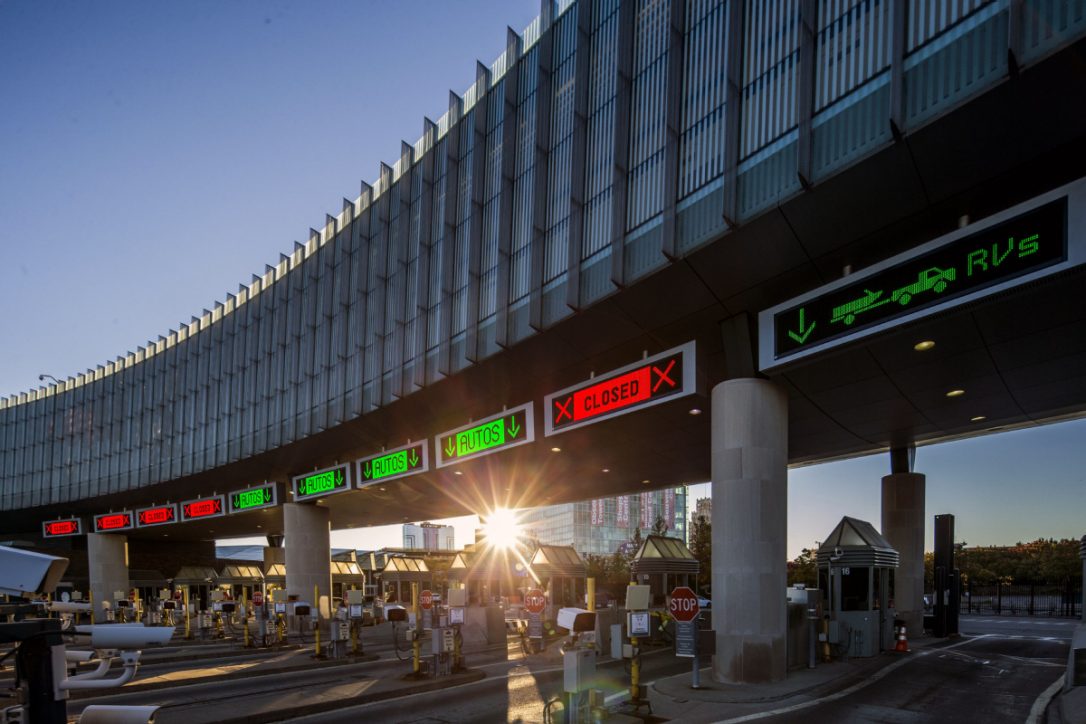 The Canadian Press 31/08/2017 – Canada’s border agency has quietly begun sharing information with U.S. Homeland Security about the thousands of American citizens who cross into Canada each day. Before long, Washington is expected to provide Ottawa with similar information about Canadians entering the United States. The exchanges are intended to bolster security and help enforce laws, though advocates for privacy and civil liberties are concerned about the potential for abuse. The planned data exchanges go too far in monitoring the travel patterns of Canadians who have not broken any laws and the information could be used to build invasive personal profiles, said Tim McSorley, national co-ordinator for the Ottawa-based International Civil Liberties Monitoring Group. That’s worrisome, he said, because most people who cross the border assume it’s a check to make sure there is no warrant for their arrest and that they’re not carrying contraband. “But not that their movements are being recorded and retained in a database.” Read more
The Canadian Press 31/08/2017 – Canada’s border agency has quietly begun sharing information with U.S. Homeland Security about the thousands of American citizens who cross into Canada each day. Before long, Washington is expected to provide Ottawa with similar information about Canadians entering the United States. The exchanges are intended to bolster security and help enforce laws, though advocates for privacy and civil liberties are concerned about the potential for abuse. The planned data exchanges go too far in monitoring the travel patterns of Canadians who have not broken any laws and the information could be used to build invasive personal profiles, said Tim McSorley, national co-ordinator for the Ottawa-based International Civil Liberties Monitoring Group. That’s worrisome, he said, because most people who cross the border assume it’s a check to make sure there is no warrant for their arrest and that they’re not carrying contraband. “But not that their movements are being recorded and retained in a database.” Read more
Three Ways Trudeau’s Liberals Have Let Down Open Government Advocates
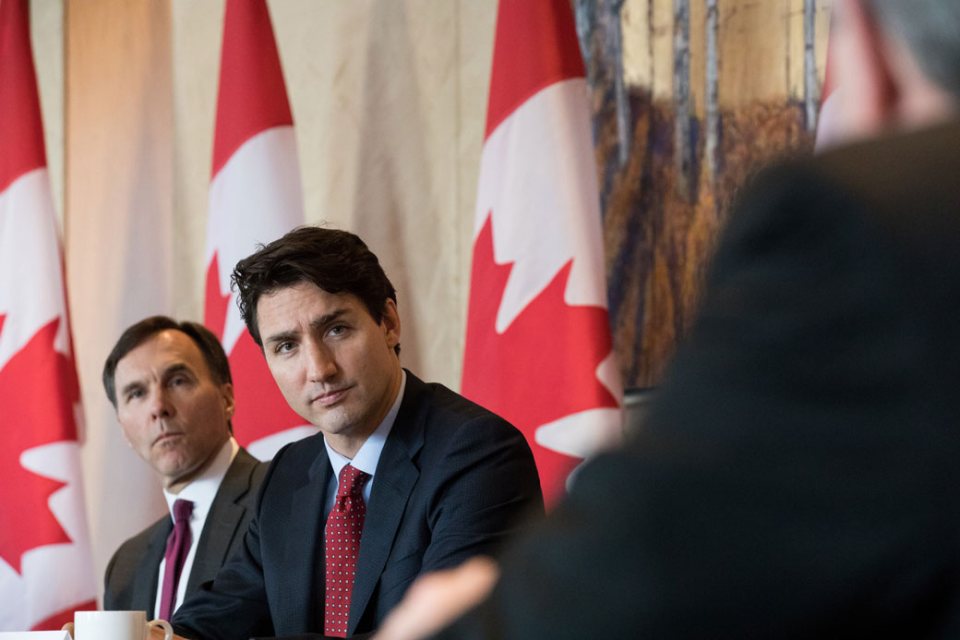 The Tyee 29/06/2017 – Bill C-59 includes the creation of a stronger oversight body, a so-called super watchdog, to keep an eye on Canada’s security agencies. Thresholds for preventive detention were also raised. But civil rights advocates still insist many aspects of the new legislation aren’t justified. Tim McSorley, national coordinator of the International Civil Liberties Monitoring Group, said while the Liberals made some progress in improving Bill C-51, elements still infringe on Canadians’ rights. “Our takeaway is basically that they’re putting in a framework and protocol around laws that we don’t think should be there in the first place,” he said. “There was no justification from the start as to why those powers were needed.” McSorley said the new bill also seems to give security agencies the ability to legally collect and keep metadata on the public, even if it’s collected by accident and isn’t related to an investigation. He said though the changes tighten up government agencies’ ability to share Canadians’ information, it’s still problematic. “When Canadians give information to a certain agency, they expect it to stay with that agency,” he said. “They don’t expect it to be transferred from one to another for reasons that were never made clear to them.” McSorley speculates the government didn’t simply repeal C-51 because the Liberals don’t want to appear soft on national security issues. Bill C-22, establishing a National Security and Intelligence Committee, also passed third reading in the Senate this week. The committee, composed of MPs and Senators, would be responsible for parliamentary oversight of national security agencies. But McSorley said that legislation has fundamental flaws. The Prime Minister’s Office can stop committee investigations and nothing guarantees committee access to all documents during an investigation of Canada’s security agencies. Read more
The Tyee 29/06/2017 – Bill C-59 includes the creation of a stronger oversight body, a so-called super watchdog, to keep an eye on Canada’s security agencies. Thresholds for preventive detention were also raised. But civil rights advocates still insist many aspects of the new legislation aren’t justified. Tim McSorley, national coordinator of the International Civil Liberties Monitoring Group, said while the Liberals made some progress in improving Bill C-51, elements still infringe on Canadians’ rights. “Our takeaway is basically that they’re putting in a framework and protocol around laws that we don’t think should be there in the first place,” he said. “There was no justification from the start as to why those powers were needed.” McSorley said the new bill also seems to give security agencies the ability to legally collect and keep metadata on the public, even if it’s collected by accident and isn’t related to an investigation. He said though the changes tighten up government agencies’ ability to share Canadians’ information, it’s still problematic. “When Canadians give information to a certain agency, they expect it to stay with that agency,” he said. “They don’t expect it to be transferred from one to another for reasons that were never made clear to them.” McSorley speculates the government didn’t simply repeal C-51 because the Liberals don’t want to appear soft on national security issues. Bill C-22, establishing a National Security and Intelligence Committee, also passed third reading in the Senate this week. The committee, composed of MPs and Senators, would be responsible for parliamentary oversight of national security agencies. But McSorley said that legislation has fundamental flaws. The Prime Minister’s Office can stop committee investigations and nothing guarantees committee access to all documents during an investigation of Canada’s security agencies. Read more
Tim McSorley on Bill C-22 and holding Canadian intelligence agencies accountable
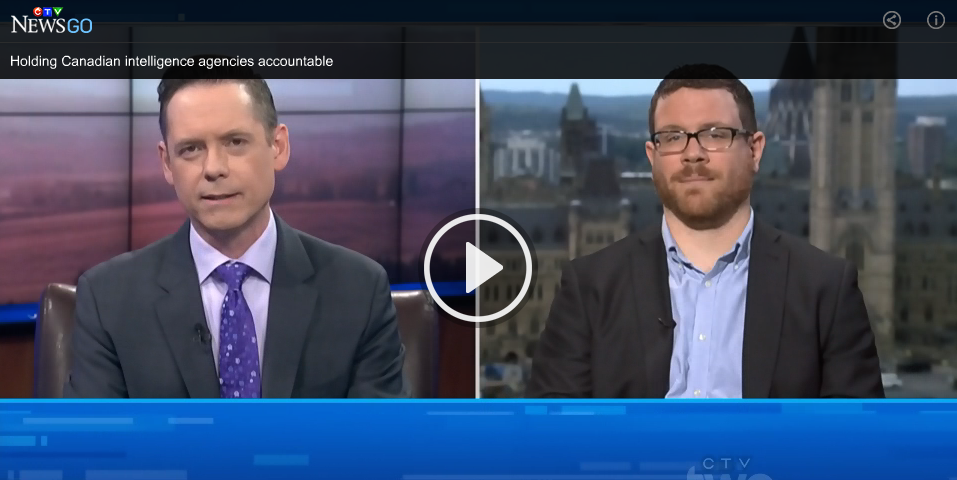
Entrevues radio sur C-22 à travers le Canada
Radio-Canada 05/04/2017 – Notre coordonnateur national, Tim McSorley, a commenté le passage en troisième lecture de C-22, un projet de loi visant la création d’un Comité de parlementaires pour surveiller la sécurité nationale et le renseignement, malgré ses nombreux défauts et lacunes. M. McSorley a été interviewé à la première chaîne de Radio-Canada pour les émissions du retour à la maison de Rimouski, Matane (16h50), Regina (17h24), Edmonton (16h22), Moncton (17h37) et Vancouver (16h25).
Entrevues radio sur les mémos de la torture à travers le Canada
Radio-Canada 31/01/2017 – Notre coordonnateur national, Tim McSorley, a parlé des directives ministérielles sur la torture permettant aux agences de sécurité d’utiliser des renseignements qui ont été obtenu sous la torture, et du fait que le ministre de la sécurité publique n’a toujours pas bougé sur ce dossier malgré que cela fait bientôt un an qu’il dit qu’il révise les directives. M. McSorley a été interviewé à la première chaîne de Radio-Canada aux émissions suivantes : Toronto, Winnipeg, Ottawa, Sudbury et Vancouver.
C-22 – The Intelligence Agency Oversight Bill That Has No Real Oversight (podcast)
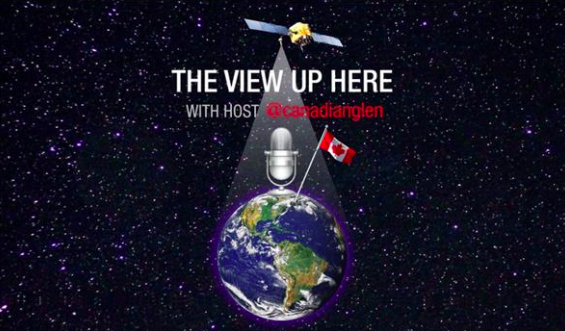 The View From Up Here 04/04/2017 – Canadian Security Intelligence Service (CSIS) and Communications Security Establishment Canada (CSEC, now CSE) remain the envy of agencies in other countries. The powers granted to these agencies in Canada have increased by a magnitude as in other nations. But those other nations have effective oversight of their activities, via committee or public boards that review and release their findings on a regular schedule. Not so in Canada. While on the campaign trail, Justin Trudeau talked about changing that, like he talked about changing a lot of things. For the vast majority of those promises, Canada is still waiting. Now, C-22, An Act to establish the National Security and Intelligence Committee of Parliamentarians, has passed second reading and ignored all evidence, testimony and past transgressions in favor of a Harperesque misnomer that makes oversight worse, not better. Sunny ways, suckers. Tim McSorley, National Coordinator for the International Civil Liberties Monitoring Group (ICLMG) joins us to discuss the deficiencies and risks to Canadians of C-22. Listen to the discussion
The View From Up Here 04/04/2017 – Canadian Security Intelligence Service (CSIS) and Communications Security Establishment Canada (CSEC, now CSE) remain the envy of agencies in other countries. The powers granted to these agencies in Canada have increased by a magnitude as in other nations. But those other nations have effective oversight of their activities, via committee or public boards that review and release their findings on a regular schedule. Not so in Canada. While on the campaign trail, Justin Trudeau talked about changing that, like he talked about changing a lot of things. For the vast majority of those promises, Canada is still waiting. Now, C-22, An Act to establish the National Security and Intelligence Committee of Parliamentarians, has passed second reading and ignored all evidence, testimony and past transgressions in favor of a Harperesque misnomer that makes oversight worse, not better. Sunny ways, suckers. Tim McSorley, National Coordinator for the International Civil Liberties Monitoring Group (ICLMG) joins us to discuss the deficiencies and risks to Canadians of C-22. Listen to the discussion
CSIS’s alternative facts universe
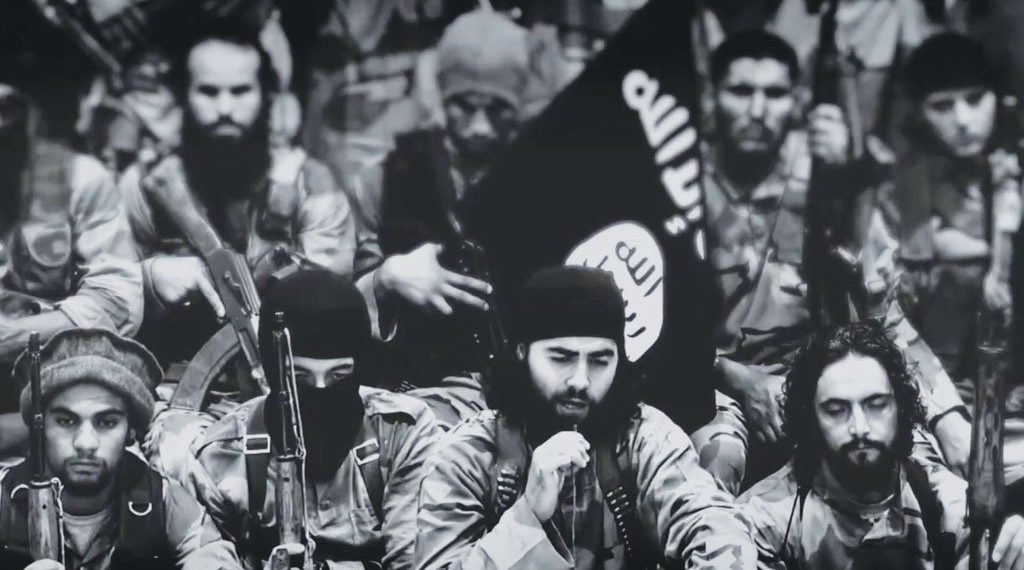 By Matthew Behrens, Now Toronto 15/03/2017 – The lack of accountability structures for such misbehaviour enables and emboldens CSIS to continue operating with impunity. But those looking to rein in Canada’s spies are not hopeful. The Liberals’ Bill C-22, to create a Parliamentary committee to oversee national security, has been criticized by the International Civil Liberties Monitoring Group (ICLMG), which last week raised concerns about the “broad powers granted to ministers to block investigations, limitations on committee members’ access to information, and the committee being responsible solely to the Prime Minister [leading the committee to become] a figurehead, unable to adequately carry out the oversight it is mandated to do.” While the ICLMG adds that any such committee “must be complemented by an independent, expert review body [that] would encompass all of Canada’s national security activities,” CSIS head Coulombe is sanguine about maintaining the status quo, ending his report by stating: “Canadians can rest assured that we undertake this work with the utmost respect for the fundamental rights and freedoms that we seek to protect.” Read more
By Matthew Behrens, Now Toronto 15/03/2017 – The lack of accountability structures for such misbehaviour enables and emboldens CSIS to continue operating with impunity. But those looking to rein in Canada’s spies are not hopeful. The Liberals’ Bill C-22, to create a Parliamentary committee to oversee national security, has been criticized by the International Civil Liberties Monitoring Group (ICLMG), which last week raised concerns about the “broad powers granted to ministers to block investigations, limitations on committee members’ access to information, and the committee being responsible solely to the Prime Minister [leading the committee to become] a figurehead, unable to adequately carry out the oversight it is mandated to do.” While the ICLMG adds that any such committee “must be complemented by an independent, expert review body [that] would encompass all of Canada’s national security activities,” CSIS head Coulombe is sanguine about maintaining the status quo, ending his report by stating: “Canadians can rest assured that we undertake this work with the utmost respect for the fundamental rights and freedoms that we seek to protect.” Read more
Gerald Caplan: How can Canada condone torture?
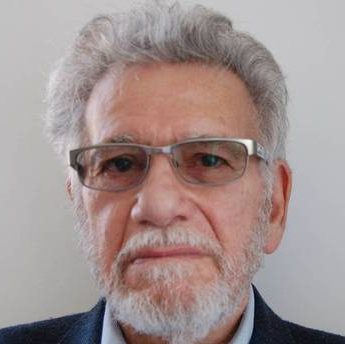 The Globe and Mail 24/11/2016 – In Canada, the previous government had told CSIS that it could use information derived through torture. The Liberal opposition was outraged. As well, the Conservative government’s anti-terrorist Bill C-51 was interpreted as opening the door to CSIS to use torture in its work, even though information thus acquired is notoriously unreliable. The Liberals were outraged. Yet the new, Liberal government is still “assessing” the issue, even though Canada has agreed to sign the UN’s optional protocol to the Convention against Torture allowing for the inspection of detention centres, where torture often takes place in secrecy. A number of heroic Canadians have dedicated themselves to ending the use of torture by Canada. They include, among others, Matthew Behrens, Monia Mazigh, Amar Wala, Barbara Jackman, Roch Tassé and his International Civil Liberties Monitoring Group. Why should their efforts be needed at all? Torture is both immoral and useless as a tool to fight terrorism. It outrages Canadians. How can our governments condone it for even one more day? Read more
The Globe and Mail 24/11/2016 – In Canada, the previous government had told CSIS that it could use information derived through torture. The Liberal opposition was outraged. As well, the Conservative government’s anti-terrorist Bill C-51 was interpreted as opening the door to CSIS to use torture in its work, even though information thus acquired is notoriously unreliable. The Liberals were outraged. Yet the new, Liberal government is still “assessing” the issue, even though Canada has agreed to sign the UN’s optional protocol to the Convention against Torture allowing for the inspection of detention centres, where torture often takes place in secrecy. A number of heroic Canadians have dedicated themselves to ending the use of torture by Canada. They include, among others, Matthew Behrens, Monia Mazigh, Amar Wala, Barbara Jackman, Roch Tassé and his International Civil Liberties Monitoring Group. Why should their efforts be needed at all? Torture is both immoral and useless as a tool to fight terrorism. It outrages Canadians. How can our governments condone it for even one more day? Read more
Tim McSorley on Bill C-22 at Revue Politique
CPAC 23/11/2016 – The interview starts at 21:53 (click on “Anglais” under the video for the English version).
When CSIS Comes Knocking
 Canadaland 12/07/2016 – A number of Muslim men have reached out to Monia Mazigh after having CSIS show up unannounced at their homes or workplaces. The intelligence agency has been doing this for years and says the discussions are voluntary, but some people see them as intimidation techniques. Monia is the national coordinator for the International Civil Liberties Monitoring Group. She joins Supriya and Vicky to talk about these CSIS visits, as well as the government’s tabled legislation–Bill C-22–that would create parliamentary oversight of national security agencies. Read Monia’s Huffington Post article here. Listen to the interview
Canadaland 12/07/2016 – A number of Muslim men have reached out to Monia Mazigh after having CSIS show up unannounced at their homes or workplaces. The intelligence agency has been doing this for years and says the discussions are voluntary, but some people see them as intimidation techniques. Monia is the national coordinator for the International Civil Liberties Monitoring Group. She joins Supriya and Vicky to talk about these CSIS visits, as well as the government’s tabled legislation–Bill C-22–that would create parliamentary oversight of national security agencies. Read Monia’s Huffington Post article here. Listen to the interview
No-fly lists remain point of contention among civil liberties advocates
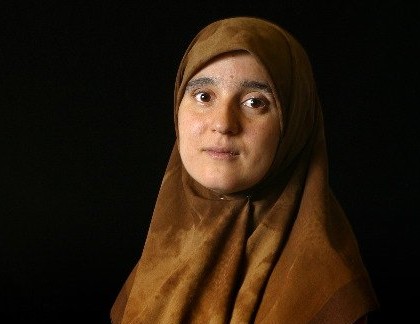 The Hill Times 04/04/2016 – “Initially, it was an immediate threat to aviation security. So that was the legislative basis for getting on the list. And then they added to that the whole range of terrorist offences that are now in the Criminal Code. So as a result of that alone, it seems to me that the number of people on that list was going to increase. The other thing that happened was that they lowered the standard. So it’s not an immediate threat, but a reasonable grounds to suspect,” said Prof. Bennett. He said that the Secure Air Travel Act, which allows for the no-fly list, should not have been included as part of Bill C-51 and should have been separated, and proper study and debate should have taken place around the act. Monia Mazigh, a Canadian representative with International Civil Liberties Monitoring Group, agreed with Prof. Bennett. “We want the government to be more transparent,” said Ms. Mazigh, who is married to Maher Arar and made headlines advocating on his behalf in 2002 when he was deported to Syria and tortured there for more than a year. She said she is concerned about false-positives, when a name may match a name on the list, but the person being stopped is not the person under suspicion. “This is an intrusion into peoples’ privacy and life, because they are going to put names on this list, but they do not know why they are on this list. They cannot even know they are on this list until the day where they try to board the plane,” she said. “Even if we don’t agree with this list, but why don’t you try to inform people. But still the government does not answer our demands,” she said. Read more
The Hill Times 04/04/2016 – “Initially, it was an immediate threat to aviation security. So that was the legislative basis for getting on the list. And then they added to that the whole range of terrorist offences that are now in the Criminal Code. So as a result of that alone, it seems to me that the number of people on that list was going to increase. The other thing that happened was that they lowered the standard. So it’s not an immediate threat, but a reasonable grounds to suspect,” said Prof. Bennett. He said that the Secure Air Travel Act, which allows for the no-fly list, should not have been included as part of Bill C-51 and should have been separated, and proper study and debate should have taken place around the act. Monia Mazigh, a Canadian representative with International Civil Liberties Monitoring Group, agreed with Prof. Bennett. “We want the government to be more transparent,” said Ms. Mazigh, who is married to Maher Arar and made headlines advocating on his behalf in 2002 when he was deported to Syria and tortured there for more than a year. She said she is concerned about false-positives, when a name may match a name on the list, but the person being stopped is not the person under suspicion. “This is an intrusion into peoples’ privacy and life, because they are going to put names on this list, but they do not know why they are on this list. They cannot even know they are on this list until the day where they try to board the plane,” she said. “Even if we don’t agree with this list, but why don’t you try to inform people. But still the government does not answer our demands,” she said. Read more
Refugee advocates call for oversight of CBSA
iPolitics 31/03/2016 – While the government has committed to creating a parliamentary committee to monitor Canada’s spy agencies, even if the committee reviews oversight mechanisms for CBSA, advocates say it won’t be enough. “It’s a good step,” said Mazigh, but her organization, the International Civil Liberties Monitoring Group is asking for a process that’s more comprehensive, which means an independent agency that’s able to communicate with all of the other review agencies so they can investigate complaints together. “I don’t think parliamentary oversight can do that, so this is our position and we hope the minister or the government will consider this criteria when they are going to suggest any new oversight and review mechanism…if any,” said Mazigh. Read more + The Canadian Press + CBC News
Liberals looking for ways to improve review of federal border agency
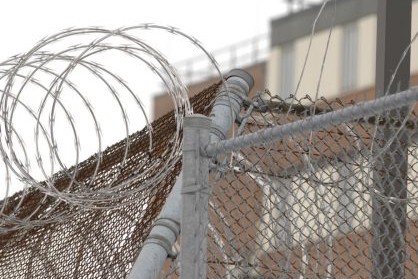 The Canadian Press 15/03/2016 – The Ottawa-based International Civil Liberties Monitoring Group wants an independent probe of in-custody deaths at the border agency. “How many more deaths do we need before something is done to stop this tragedy?” said Monia Mazigh, the organization’s national co-ordinator. “The detention of migrants shouldn’t be systematic unless there are criminal activities involved.” Read more
The Canadian Press 15/03/2016 – The Ottawa-based International Civil Liberties Monitoring Group wants an independent probe of in-custody deaths at the border agency. “How many more deaths do we need before something is done to stop this tragedy?” said Monia Mazigh, the organization’s national co-ordinator. “The detention of migrants shouldn’t be systematic unless there are criminal activities involved.” Read more
Liste d’interdiction de vol : le manque de procédure claire préoccupe
 Radio-Canada 07/03/2016 – La liste d’interdiction de vol du Canada suscite de vives réactions auprès de l’auteure et coordonnatrice nationale de la Coalition pour la surveillance internationale des libertés civiles, Monia Mazigh. Elle déplore le manque de procédure claire et transparente afin de permettre les personnes dans ce cas de retirer de la liste. Le dossier a refait surface le 3 mars dernier quand le jeune Syed Adam Ahmed, un enfant de six ans de Markham était à l’aéroport. Il s’est trouvé sur la liste de voyageurs à haut risque de plusieurs compagnie aériennes. Le problème: c’est que son nom est semblable à celui d’un homme reconnu coupable d’actes terroristes. La famille s’était fait promettre que ce serait corrigé. Mme Mazigh est familière avec la situation. Son mari, le Canadien d’origine syrienne Maher Arar, a été torturé en Syrie après avoir été expulsé des États-Unis sur la base d’informations erronées fournies par la GRC. Selon Mme Mazigh, le gouvernement n’agit pas rapidement pour résoudre de tels dossiers. Elle rappelle que le rapport O’Connor sur la situation de son mari a été publié en 2007. Or, aucune recommandation n’a été mise en place. Listen
Radio-Canada 07/03/2016 – La liste d’interdiction de vol du Canada suscite de vives réactions auprès de l’auteure et coordonnatrice nationale de la Coalition pour la surveillance internationale des libertés civiles, Monia Mazigh. Elle déplore le manque de procédure claire et transparente afin de permettre les personnes dans ce cas de retirer de la liste. Le dossier a refait surface le 3 mars dernier quand le jeune Syed Adam Ahmed, un enfant de six ans de Markham était à l’aéroport. Il s’est trouvé sur la liste de voyageurs à haut risque de plusieurs compagnie aériennes. Le problème: c’est que son nom est semblable à celui d’un homme reconnu coupable d’actes terroristes. La famille s’était fait promettre que ce serait corrigé. Mme Mazigh est familière avec la situation. Son mari, le Canadien d’origine syrienne Maher Arar, a été torturé en Syrie après avoir été expulsé des États-Unis sur la base d’informations erronées fournies par la GRC. Selon Mme Mazigh, le gouvernement n’agit pas rapidement pour résoudre de tels dossiers. Elle rappelle que le rapport O’Connor sur la situation de son mari a été publié en 2007. Or, aucune recommandation n’a été mise en place. Listen
Le procès de Salim Alaradi aux Émirats arabes unis ajourné au 29 février
Radio-Canada 14/02/2016 – Monia Mazigh au téléjournal de Radio-Canada. Watch
Monia Mazigh parle du cas de Salim Alaradi
Radio-Canada 08/02/2016 – Notre coordonnatrice nationale, Monia Mazigh, en entrevue à Radio-Canada Windsor sur le cas de Salim Alaradi – un citoyen canadien détenu aux Émirats arabes unis pendant un an et demi sans accusation et ayant subi de la torture. Il est tout à coup accusé de terrorisme par les EAU et le CSILC et Amnesty International Canada craignont que son procès ne soit pas équitable. Listen
We need oversight AND review of national security activities in Canada
1310 News 27/01/2016 – Interview by ICLMG’s National Coordinator
Monia Mazigh on why we need oversight AND review of national security activities in Canada. Listen
Canada to review ‘troubling’ torture policy
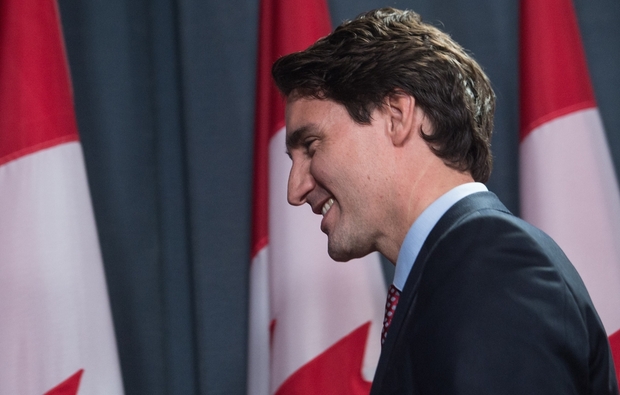 Middle East Eye 22/01/2016 – Monia Mazigh is the national coordinator of the International Civil Liberties Monitoring Group, which brings together dozens of civil society organisations working on human rights issues in the context of the “war on terror” across Canada. She told Middle East Eye that the minister’s statement was “a first step” towards opening up a public dialogue into information sharing and its impact on Canadians. “We are very much looking forward to see more of what they are going to propose,” Mazigh said. Mazigh’s husband, Syrian-Canadian national Maher Arar, was detained in the US in 2002 and secretly transferred to Syria, where he was tortured in prison for a year before being able to return to Canada. A commission of inquiry examined Canada’s role in his extradition and found that Canadian RCMP officers provided the US with “inaccurate” information about Arar that “portrayed him in an unfairly negative fashion”. “It is very likely that, in making the decisions to detain and remove Mr Arar, American authorities relied on information about Mr. Arar provided by the RCMP,” the commission’s report stated. The Canadian government later apologised to Arar and gave him $10mn in compensation. Read more
Middle East Eye 22/01/2016 – Monia Mazigh is the national coordinator of the International Civil Liberties Monitoring Group, which brings together dozens of civil society organisations working on human rights issues in the context of the “war on terror” across Canada. She told Middle East Eye that the minister’s statement was “a first step” towards opening up a public dialogue into information sharing and its impact on Canadians. “We are very much looking forward to see more of what they are going to propose,” Mazigh said. Mazigh’s husband, Syrian-Canadian national Maher Arar, was detained in the US in 2002 and secretly transferred to Syria, where he was tortured in prison for a year before being able to return to Canada. A commission of inquiry examined Canada’s role in his extradition and found that Canadian RCMP officers provided the US with “inaccurate” information about Arar that “portrayed him in an unfairly negative fashion”. “It is very likely that, in making the decisions to detain and remove Mr Arar, American authorities relied on information about Mr. Arar provided by the RCMP,” the commission’s report stated. The Canadian government later apologised to Arar and gave him $10mn in compensation. Read more
Thousands flagged for scrutiny by new air passenger screening system
Canadian Press 14/01/2016 – Canadians don’t know enough about the criteria being used, said Monia Mazigh, national co-ordinator of the Ottawa-based International Civil Liberties Monitoring Group. “Why do we need to do it?” Mazigh wonders whether the border agency has scientific studies to show the new techniques will make Canada safer, or if it is simply following in American footsteps. “It’s very important for Canadians to know that.” Read more
Red-flagging Canada’s children on no-fly lists
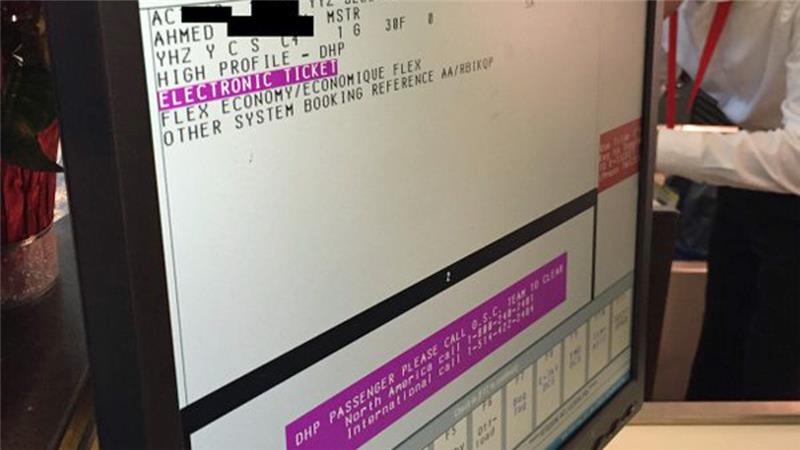 Al Jazeera 13/01/2016 – “The security value that is generated through this list can be reduced considerably in the absence of adequate controls and oversight to measure and demonstrate the level of compliance and performance for those tasked with the application,” he said in an email. Monia Mazigh is the national coordinator of the Ottawa-based International Civil Liberties Monitoring Group. She said it is impossible to know the effectiveness of no-fly lists since the government has failed to disclose any facts, and has so far refused public consultation. Mazigh knows all too well the dangers of such lists. Her husband, Maher Arar, was mistakenly placed on a threat list and arrested in New York after the September 11 attacks. Arar was one of the first victims of the CIA’s extraordinary rendition programme as he was suspected of being an al-Qaeda member and deported to Syria – where he was imprisoned and tortured for nearly a year before being returned to Canada. A Canadian inquiry later found Arar had been a victim of “false and inflammatory information” given by the RCMP to the CIA. Thirteen years later, it remains unclear if anything has changed. “We suspect that he’s still on this US list even today,” said Mazigh. Read more
Al Jazeera 13/01/2016 – “The security value that is generated through this list can be reduced considerably in the absence of adequate controls and oversight to measure and demonstrate the level of compliance and performance for those tasked with the application,” he said in an email. Monia Mazigh is the national coordinator of the Ottawa-based International Civil Liberties Monitoring Group. She said it is impossible to know the effectiveness of no-fly lists since the government has failed to disclose any facts, and has so far refused public consultation. Mazigh knows all too well the dangers of such lists. Her husband, Maher Arar, was mistakenly placed on a threat list and arrested in New York after the September 11 attacks. Arar was one of the first victims of the CIA’s extraordinary rendition programme as he was suspected of being an al-Qaeda member and deported to Syria – where he was imprisoned and tortured for nearly a year before being returned to Canada. A Canadian inquiry later found Arar had been a victim of “false and inflammatory information” given by the RCMP to the CIA. Thirteen years later, it remains unclear if anything has changed. “We suspect that he’s still on this US list even today,” said Mazigh. Read more
Liberals’ C-51 Changes Open To Consultations, Public Safety Minister Says
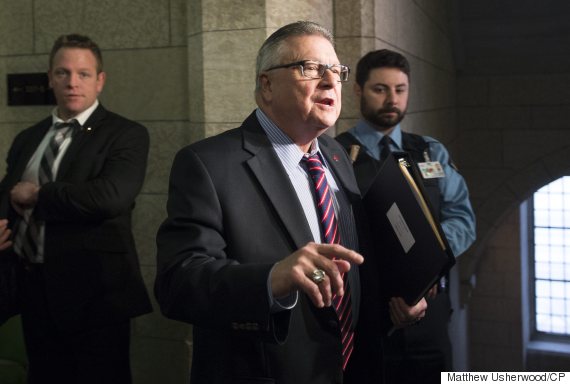 The Canadian Press 09/01/2016 – The government has pledged to ensure all Canadian Security Intelligence Service warrants respect the Charter of Rights and Freedoms. That would roll back new provisions allowing CSIS to disrupt terror plots through tactics that breach the charter as long as a judge approves. It has also committed to creating a special committee of parliamentarians to keep an eye on national security operations. Organizations including Amnesty International Canada and the Ottawa-based International Civil Liberties Monitoring Group have urged the Liberals to go further by implementing neglected 2006 recommendations on comprehensive security review from the inquiry into the overseas torture of Maher Arar. Read more
The Canadian Press 09/01/2016 – The government has pledged to ensure all Canadian Security Intelligence Service warrants respect the Charter of Rights and Freedoms. That would roll back new provisions allowing CSIS to disrupt terror plots through tactics that breach the charter as long as a judge approves. It has also committed to creating a special committee of parliamentarians to keep an eye on national security operations. Organizations including Amnesty International Canada and the Ottawa-based International Civil Liberties Monitoring Group have urged the Liberals to go further by implementing neglected 2006 recommendations on comprehensive security review from the inquiry into the overseas torture of Maher Arar. Read more
Canada’s no-fly list is ‘very mysterious’ and leaves targets little recourse, say critics
 CBC news 06/01/2016 – The ICLMG, which considers the no-fly list “an unconstitutional program,” started tracking how many people felt they were mistakenly or unfairly targeted by a watch list in 2008. It published a report of its findings in February 2010, but the organization still receives stories of airport and border-crossing troubles, said national co-ordinator Monia Mazigh. “It seems like in the past months we are receiving more stories like that of people who think that they are on a no-fly list, or have been prevented to enter the United States, or who have been harassed at the border,” she said. […] Mazigh said it’s “very unlikely” the government would remove a name from the list. “There is nothing really that people can do,” she said. Which is why it’s all the more important for the government to be more transparent about the process of how people’s names end up on the list, she said, so that they can better challenge that decision. Read more
CBC news 06/01/2016 – The ICLMG, which considers the no-fly list “an unconstitutional program,” started tracking how many people felt they were mistakenly or unfairly targeted by a watch list in 2008. It published a report of its findings in February 2010, but the organization still receives stories of airport and border-crossing troubles, said national co-ordinator Monia Mazigh. “It seems like in the past months we are receiving more stories like that of people who think that they are on a no-fly list, or have been prevented to enter the United States, or who have been harassed at the border,” she said. […] Mazigh said it’s “very unlikely” the government would remove a name from the list. “There is nothing really that people can do,” she said. Which is why it’s all the more important for the government to be more transparent about the process of how people’s names end up on the list, she said, so that they can better challenge that decision. Read more
Vie privée 20.15 – Interview
Vie privée 15/11/2015 – Listen to the interview given by our National Coordinator, Monia Mazigh, to the radio program Vie privée 20.15 on November 15th, on the no-fly list and other violations of human rights and civil liberties in the context of the war on terror. Listen to the interview (in French only)
Canadian Mining Puts Lives and Democracy at Risk in the Americas – Report
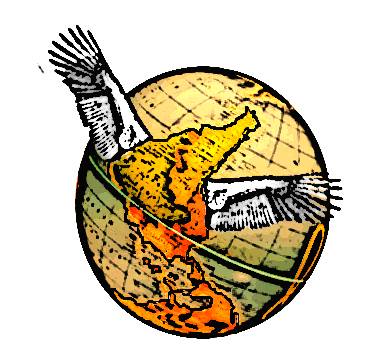 Upside Down World 24/09/2015 – MiningWatch Canada and the International Civil Liberties Monitoring Group released a report today that squarely links Canadian mining interests throughout the Americas with intensifying repression and violence against mining-affected communities. ‘In the National Interest? Criminalization of Land and Environment Defenders in the Americas’ provides evidence from five countries that illustrates how the Canadian government and Canadian mining companies have helped turn the law against individuals and groups fighting for their water, lands, livelihoods and ways of life. The report argues that the model of industrial mineral extraction that Canada promotes abroad is informed by deregulation of the extractive sector at home and a colonialist past and present that — with renewed fervour in recent years — views those who speak out as a threat to the national interest and hence a target for spy agencies, tax audits, funding cuts, and gratuitous policing. “This is nowhere more explicit than with the adoption of the Anti-Terrorism Act 2015, which gives enhanced powers to Canadian intelligence agencies and redefines security to include preventing interference with anything designated as part of the economic or financial stability of Canada, sending a clear signal to Indigenous peoples and environmental groups defending land and the environment,” says Roch Tassé, former National Coordinator of the ICLMG. Read more
Upside Down World 24/09/2015 – MiningWatch Canada and the International Civil Liberties Monitoring Group released a report today that squarely links Canadian mining interests throughout the Americas with intensifying repression and violence against mining-affected communities. ‘In the National Interest? Criminalization of Land and Environment Defenders in the Americas’ provides evidence from five countries that illustrates how the Canadian government and Canadian mining companies have helped turn the law against individuals and groups fighting for their water, lands, livelihoods and ways of life. The report argues that the model of industrial mineral extraction that Canada promotes abroad is informed by deregulation of the extractive sector at home and a colonialist past and present that — with renewed fervour in recent years — views those who speak out as a threat to the national interest and hence a target for spy agencies, tax audits, funding cuts, and gratuitous policing. “This is nowhere more explicit than with the adoption of the Anti-Terrorism Act 2015, which gives enhanced powers to Canadian intelligence agencies and redefines security to include preventing interference with anything designated as part of the economic or financial stability of Canada, sending a clear signal to Indigenous peoples and environmental groups defending land and the environment,” says Roch Tassé, former National Coordinator of the ICLMG. Read more
Government launches deportation proceedings against Harkat
 Ottawa Citizen 18/09/2015 – Late last month, almost four weeks into the federal election campaign, Harkat received an official letter from the CBSA informing him that the first step in his deportation process had begun. “He was totally devastated,” Harkat’s wife, Sophie, said in an interview. “That big grey cloud he’s had over his head for 13 years, it just got a lot darker.” Harkat said her husband had hoped the government wouldn’t pursue his deportation. “How big a threat can he be if they wait 15 months to issue this letter?” Two years ago, an electronic tracking bracelet was removed from Harkat’s leg and his release conditions relaxed to allow him to travel outside of Ottawa, use a mobile phone and an Internet-connected computer. Monia Mazigh, national co-ordinator of the International Civil Liberties Monitoring Group, said the move to deport Harkat comes at an odd time: with an election in full swing and with no certainty about what party will form the next government. “We see this as a very, very dangerous move,” said Mazigh, who argued that Canada should not deport someone if there is even the slightest possibility that they will be mistreated or tortured. Read more
Ottawa Citizen 18/09/2015 – Late last month, almost four weeks into the federal election campaign, Harkat received an official letter from the CBSA informing him that the first step in his deportation process had begun. “He was totally devastated,” Harkat’s wife, Sophie, said in an interview. “That big grey cloud he’s had over his head for 13 years, it just got a lot darker.” Harkat said her husband had hoped the government wouldn’t pursue his deportation. “How big a threat can he be if they wait 15 months to issue this letter?” Two years ago, an electronic tracking bracelet was removed from Harkat’s leg and his release conditions relaxed to allow him to travel outside of Ottawa, use a mobile phone and an Internet-connected computer. Monia Mazigh, national co-ordinator of the International Civil Liberties Monitoring Group, said the move to deport Harkat comes at an odd time: with an election in full swing and with no certainty about what party will form the next government. “We see this as a very, very dangerous move,” said Mazigh, who argued that Canada should not deport someone if there is even the slightest possibility that they will be mistreated or tortured. Read more
Group wants Harper to help Salim Alaradi, man held in U.A.E.
The Canadian Press 07/08/2015 – The case caught the attention of several organizations, including Amnesty International Canada, the International Civil Liberties Monitoring Group and the Libyan Canadian Community Organization, who are among those who’ve 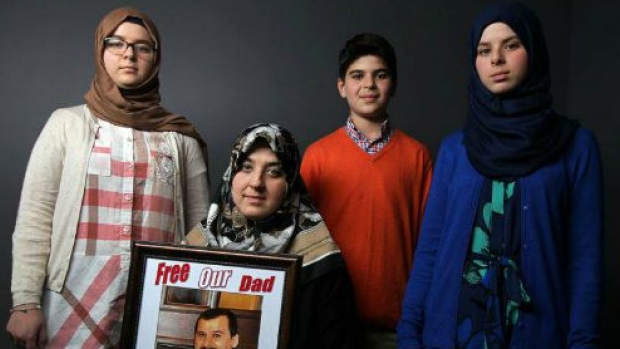 asked Harper to act for Alaradi. “Your intervention is critical in ensuring that Mr. Alaradi’s human rights will be respected and upheld,” their letter said. “It is vital that Canada demand that he be released unless he is charged immediately with a recognizable criminal offence and brought promptly to trial in fair proceedings.” When asked about Alaradi’s case, the Department of Foreign Affairs only said that consular services were being provided to a Canadian detained in the U.A.E. and that “senior Canadian officials” were in contact with the “appropriate authorities” in that country. The reason the groups addressed their letter to Harper, and not the foreign affairs minister or others in government, was because they believe a top-level intervention is needed in the case, said Monia Mazigh, national co-ordinator of the International Civil Liberties Monitoring Group. “I think Canada does not really want to rock the boat and that’s been a kind of a pattern in many cases of Canadians detained abroad,” she said. “We’re asking the prime minister to take this case and to do something concrete.” Read more
asked Harper to act for Alaradi. “Your intervention is critical in ensuring that Mr. Alaradi’s human rights will be respected and upheld,” their letter said. “It is vital that Canada demand that he be released unless he is charged immediately with a recognizable criminal offence and brought promptly to trial in fair proceedings.” When asked about Alaradi’s case, the Department of Foreign Affairs only said that consular services were being provided to a Canadian detained in the U.A.E. and that “senior Canadian officials” were in contact with the “appropriate authorities” in that country. The reason the groups addressed their letter to Harper, and not the foreign affairs minister or others in government, was because they believe a top-level intervention is needed in the case, said Monia Mazigh, national co-ordinator of the International Civil Liberties Monitoring Group. “I think Canada does not really want to rock the boat and that’s been a kind of a pattern in many cases of Canadians detained abroad,” she said. “We’re asking the prime minister to take this case and to do something concrete.” Read more
Opponents position Bill C-51 as election issue
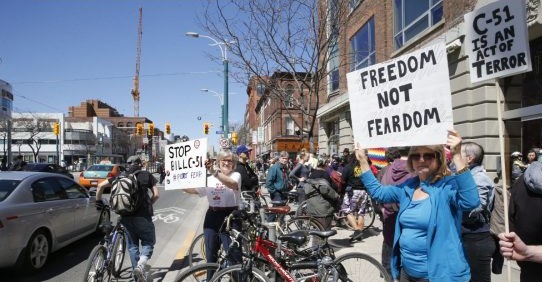 The Toronto Star 18/04/2015 – Opponents of Bill C-51 are playing the long game. Armed with signs and flyers, about 50 demonstrators gathered outside the downtown Toronto offices of Liberal MP Adam Vaughan on Saturday to protest the Conservatives’ far-reaching anti-terrorism bill, which would expand police powers and give more muscle to Canada’s spy agency. They are urging Vaughan and other Liberals to abandon their stated support of the bill and “reject fear,” as one sign read, by voting against C-51, which they believe infringes on the Charter of Rights and Freedoms. But with the odds stacked against them, they say they are looking beyond the outcome of the vote next week, when the bill is due to return to the floor of the House of Commons, to the upcoming federal election. […] There were representatives from the Law Union of Ontario, the Idle No More movement, the Ottawa-based International Civil Liberties Monitoring Group and CUPE 3902, the union representing academic workers at the University of Toronto. Read more
The Toronto Star 18/04/2015 – Opponents of Bill C-51 are playing the long game. Armed with signs and flyers, about 50 demonstrators gathered outside the downtown Toronto offices of Liberal MP Adam Vaughan on Saturday to protest the Conservatives’ far-reaching anti-terrorism bill, which would expand police powers and give more muscle to Canada’s spy agency. They are urging Vaughan and other Liberals to abandon their stated support of the bill and “reject fear,” as one sign read, by voting against C-51, which they believe infringes on the Charter of Rights and Freedoms. But with the odds stacked against them, they say they are looking beyond the outcome of the vote next week, when the bill is due to return to the floor of the House of Commons, to the upcoming federal election. […] There were representatives from the Law Union of Ontario, the Idle No More movement, the Ottawa-based International Civil Liberties Monitoring Group and CUPE 3902, the union representing academic workers at the University of Toronto. Read more
Au pays de la terreur, l’État est roi
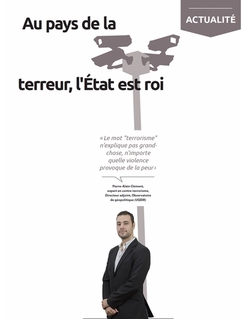 L’itinéraire 01/04/2015 – « C-51, c’est juste du théâtre politique ! », s’insurge Roch Tassé, le coordonnateur de la Coalition pour la surveillance des libertés civiles. Sur papier, la loi prévoit d’alourdir les peines, de généraliser les moyens de contrôle et de faciliter les arrestations préventives en même temps que les détentions passeront de 72 h à 7 jours. « Comme le gouvernement l’a martelé, les États-Unis et la France vont plus loin en matière de contrôle et surveillance des populations. Mais ce qui nous a été présenté comme un retard est plutôt un progrès du point de vue des libertés », défend Pierre-Alain Clément, chercheur à la chaire Raoul-Dandurand de l’UQÀM. Dans les faits, avec C-51, un ensemble d’infractions seront désormais traitées comme des activités reliées au terrorisme. Un concept pour le moins large et ambigu qui ouvrirait la porte à la loi de l’arbitraire. « La nouvelle loi permettrait de faire des arrestations préventives sur la simple base qu’un policier pourrait soupçonner que vous pourriez commettre un crime », déplore M. Tassé en insistant sur le i du conditionnel. Read more
L’itinéraire 01/04/2015 – « C-51, c’est juste du théâtre politique ! », s’insurge Roch Tassé, le coordonnateur de la Coalition pour la surveillance des libertés civiles. Sur papier, la loi prévoit d’alourdir les peines, de généraliser les moyens de contrôle et de faciliter les arrestations préventives en même temps que les détentions passeront de 72 h à 7 jours. « Comme le gouvernement l’a martelé, les États-Unis et la France vont plus loin en matière de contrôle et surveillance des populations. Mais ce qui nous a été présenté comme un retard est plutôt un progrès du point de vue des libertés », défend Pierre-Alain Clément, chercheur à la chaire Raoul-Dandurand de l’UQÀM. Dans les faits, avec C-51, un ensemble d’infractions seront désormais traitées comme des activités reliées au terrorisme. Un concept pour le moins large et ambigu qui ouvrirait la porte à la loi de l’arbitraire. « La nouvelle loi permettrait de faire des arrestations préventives sur la simple base qu’un policier pourrait soupçonner que vous pourriez commettre un crime », déplore M. Tassé en insistant sur le i du conditionnel. Read more
Three hearings on C-51 would have done the trick
Behind the Numbers 01/04/2015 – Opposition efforts to remove or amend this and surrounding sections on CSIS’s new powers to disrupt, to take out the ability to request permission from a judge to breach someone’s Charter rights and to specifically prohibit CSIS from detaining people in their duties, were shot down one by one last night. The Department of Justice lawyer suggested any change in this language would undermine the purpose of the Act.
“Existing measures have already led to serious violations of the rights of innocent people and the government now wants to introduce new measures notwithstanding the fact that it has not yet implemented the necessary oversight and review mechanisms to protect Canadians,” says Roch Tassé, national co-ordinator of the International Civil Liberties Monitoring Group, one of several human rights and civil liberties advocates to endorse a statement demanding the government repeal C-51.
“The measures introduced in Bill C-51 greatly increase the potential for further national security abuses,” he adds. “Before introducing such drastic new measures, the government needs to demonstrate that existing legislation is insufficient and must implement the type of robust and comprehensive oversight and review mechanisms proposed by Justice O’Connor who presided over the Arar Inquiry, as well as create opportunities for greater parliamentary oversight.” Read more
Government plans four amendments to soften anti-terror Bill C-51
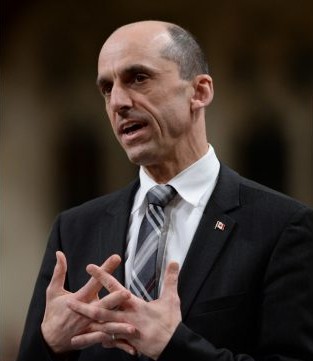 The Toronto Star 30/03/2015 – As the Conservative government gets set to unveil a handful of amendments to its sweeping proposed anti-terrorism legislation, it slammed critics including the Canadian Bar Association as lacking credibility. […] The B.C. group joined Amnesty International Canada, the Canadian Civil Liberties Association, the Canadian Muslim Lawyers Association, the International Civil Liberties Monitoring Group, La Ligue des Droits et Libertés, and the National Council of Canadian Muslims in a joint statement Monday that called for the anti-terror bill to be withdrawn. Amnesty’s Canadian head, Alex Neve, said the bill should not give “legislated power to CSIS to violate the Charter of Rights” and requiring prior judicial authorization for such breaches is merely an attempt to offer “a sheen of legitimacy” to a bad bill. Read more
The Toronto Star 30/03/2015 – As the Conservative government gets set to unveil a handful of amendments to its sweeping proposed anti-terrorism legislation, it slammed critics including the Canadian Bar Association as lacking credibility. […] The B.C. group joined Amnesty International Canada, the Canadian Civil Liberties Association, the Canadian Muslim Lawyers Association, the International Civil Liberties Monitoring Group, La Ligue des Droits et Libertés, and the National Council of Canadian Muslims in a joint statement Monday that called for the anti-terror bill to be withdrawn. Amnesty’s Canadian head, Alex Neve, said the bill should not give “legislated power to CSIS to violate the Charter of Rights” and requiring prior judicial authorization for such breaches is merely an attempt to offer “a sheen of legitimacy” to a bad bill. Read more
C-51 aurait plombé le mouvement étudiant, selon Gabriel Nadeau-Dubois
 La Presse 17/03/2015 – Si le projet de loi antiterroriste avait été en vigueur pendant le printemps étudiant, les opposants à la hausse des frais de scolarité auraient-ils défié en si grand nombre le règlement municipal P-6, qui force les organisations voulant prendre la rue à fournir leur itinéraire aux autorités? Le coordonnateur national de la Coalition pour la surveillance internationale des libertés civiles, Roch Tassé, en doute. La crainte de se voir accoler une étiquette de terroriste aurait probablement refroidi les ardeurs de nombre d’entre eux, croit-il. Et c’est sans compter que les protestataires ayant pris part à des actions plus vigoureuses comme le blocage de l’accès au port de Montréal ou au pont Jacques-Cartier auraient pu se retrouver avec de sérieuses accusations criminelles sur les bras, avance M. Tassé. «Ce sont deux infrastructures fédérales qui sont importantes pour l’économie du pays. Dans ces deux cas, on pourrait oser croire que le texte de loi actuel pourrait s’appliquer», a-t-il souligné en entrevue téléphonique. Les définitions contenues dans C-51 stipulent que le fait d’entraver la capacité du gouvernement à assurer et la «stabilité économique du Canada», et «le fonctionnement d’infrastructures essentielles», figurent parmi les activités portant atteinte à la sécurité du pays.
La Presse 17/03/2015 – Si le projet de loi antiterroriste avait été en vigueur pendant le printemps étudiant, les opposants à la hausse des frais de scolarité auraient-ils défié en si grand nombre le règlement municipal P-6, qui force les organisations voulant prendre la rue à fournir leur itinéraire aux autorités? Le coordonnateur national de la Coalition pour la surveillance internationale des libertés civiles, Roch Tassé, en doute. La crainte de se voir accoler une étiquette de terroriste aurait probablement refroidi les ardeurs de nombre d’entre eux, croit-il. Et c’est sans compter que les protestataires ayant pris part à des actions plus vigoureuses comme le blocage de l’accès au port de Montréal ou au pont Jacques-Cartier auraient pu se retrouver avec de sérieuses accusations criminelles sur les bras, avance M. Tassé. «Ce sont deux infrastructures fédérales qui sont importantes pour l’économie du pays. Dans ces deux cas, on pourrait oser croire que le texte de loi actuel pourrait s’appliquer», a-t-il souligné en entrevue téléphonique. Les définitions contenues dans C-51 stipulent que le fait d’entraver la capacité du gouvernement à assurer et la «stabilité économique du Canada», et «le fonctionnement d’infrastructures essentielles», figurent parmi les activités portant atteinte à la sécurité du pays.
L’une de ses principales dispositions prévoit par ailleurs que plusieurs ministères fédéraux pourront partager avec les agences comme le Service canadien du renseignement de sécurité (SCRS) les informations qu’ils détiennent sur les citoyens canadiens. Selon une source au sein du mouvement étudiant, l’agence d’espionnage canadienne suivait de très près les opposants à la hausse des frais de scolarité. «Avant, pendant et après» le conflit, «au moins 20» étudiants ont été rencontrés par des agents du SCRS, a confié cette source. Si la loi antiterroriste que caresse le gouvernement conservateur avait alors été en place, l’agence aurait pu puiser dans une mine d’informations personnelles actuellement confinées dans les dossiers de différents ministères fédéraux. «On aurait pu demander l’historique de voyage d’un individu, son rapport d’impôt, ses dossiers médicaux si possible», a expliqué M. Tassé. «Il n’y aurait pas de limites, il y a 17 ministères qui peuvent partager l’information», a-t-il poursuivi. Le ministre Blaney a soutenu la semaine passée que les agences sécuritaires ne feraient pas grand cas de manifestations déclarées illégales par les autorités municipales comme P-6 et qu’elles ne partageraient «pas nécessairement» les informations recueillies à l’occasion de ces événements. Invité à commenter les exemples spécifiques du blocage d’un port ou d’un pont, son bureau s’est contenté de réitérer par courriel, lundi soir, que «C-51 vise les terroristes, pas des manifestants». Aux yeux de Roch Tassé, la parole de l’élu conservateur ne suffit pas, même en présumant de la «bonne foi» du gouvernement en place: il faut que les balises soient clairement établies dans le texte de loi, qui lui seul garantit le respect des protections constitutionnelles, insiste-t-il. Read more
First Nations vow legal challenge of anti-terror bill
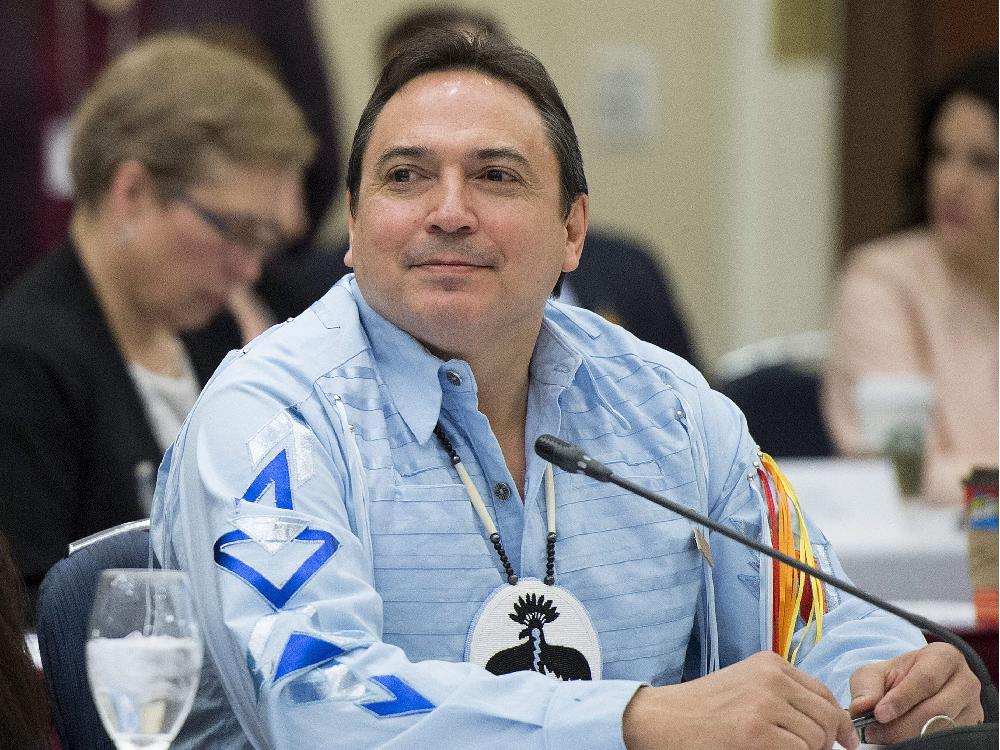 Ottawa Citizen 12/03/2015 – Paul Champ, of the International Civil Liberties Monitoring Group and a former Crown prosecutor: The bill “confers extraordinary powers on security agency to violate the human rights of Canadians and ‘disrupt’ their lives, all in secret,” he said. “The (1977-81) McDonald Commission (into RCMP wrongdoing) called these sorts of measures ‘dirty tricks,’ but this bill goes much farther.”
Ottawa Citizen 12/03/2015 – Paul Champ, of the International Civil Liberties Monitoring Group and a former Crown prosecutor: The bill “confers extraordinary powers on security agency to violate the human rights of Canadians and ‘disrupt’ their lives, all in secret,” he said. “The (1977-81) McDonald Commission (into RCMP wrongdoing) called these sorts of measures ‘dirty tricks,’ but this bill goes much farther.”
“Strict controls on the activities of security intelligence agents is essential in a democracy for two critical reasons: their activities routinely intrude upon or impinge on the private lives and civil liberties of Canadians – it’s inherent to the work; and they carry out this sensitive work in almost complete secrecy.” Read more
Roch Tassé and Nicole Fillion: Defending the right to defend rights
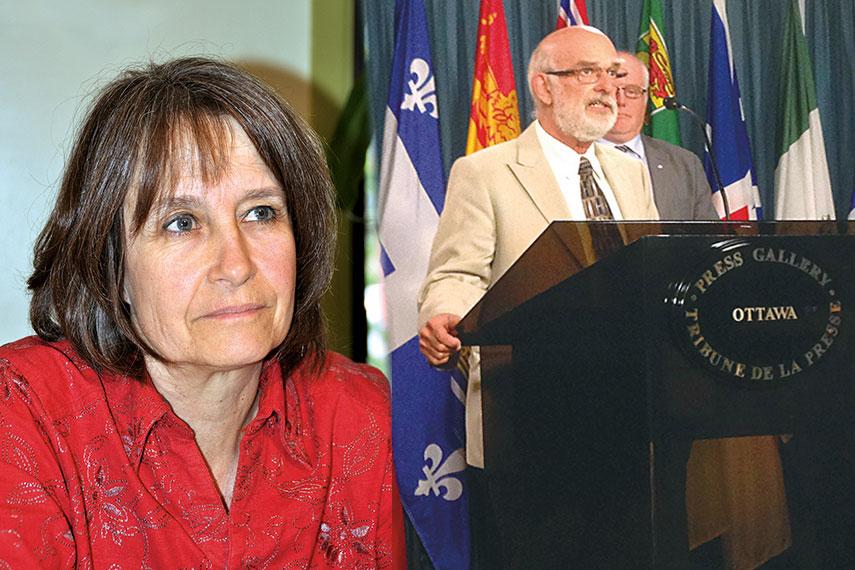 Inter Pares 11/03/2015 – Interview with Roch Tassé of the International Civil Liberties Monitoring Group (ICLMG) and Nicole Filion of the Ligue des droits et libertés (LDL)
Inter Pares 11/03/2015 – Interview with Roch Tassé of the International Civil Liberties Monitoring Group (ICLMG) and Nicole Filion of the Ligue des droits et libertés (LDL)
Inter Pares: Roch, could you share your concerns about the current context?
Roch Tassé: As we see it, this is the culmination of a process in Canada. Over the last ten years, but especially over the last two or three years, political discourse in the government here has changed. It is beginning to sound very much like what we have heard in Latin America over the last decade – an attempt to delegitimize all dissent towards the state. We have seen this in the natural resource sector in Latin America, where Canadian companies are operating projects. Laws are criminalizing legitimate opposition to these projects. Latin American governments have characterized dissidents as extremists. In some cases, they have even labeled them terrorists and used old anti-terrorist laws, as in Chile, to criminalize individuals.
Over the last two or three years in Canada, we have heard the same argument used in RCMP reports, in annual reports from the Canadian Security Intelligence Service (CSIS), and in the policy statement from Public Safety Canada released three years ago under Vic Toews, all using the same type of language found in Latin America. That is to say, dissenters are referred to as extremists. In the environmental movement, for example, extremists could potentially resort to civil disobedience strategies, or even terrorism. So the discourse in government documents tries to associate dissent with terrorism in a fairly categorical manner. After two years of this shift in discourse, we are now facing legislation that enshrines it in law. The process is nearly complete. Read more
CSEC, mass surveillance and Bill C-51: Interview with our Communications and Research Coordinator, Anne Dagenais Guertin
CIBL reçoit 04/03/2015 – CIBL 101,5 La radio citoyenne de Montréal, en collaboration avec des organismes du milieu, présente une émission différente chaque semaine avec une même priorité: mieux informer le citoyen montréalais. Le premier mercredi du mois, CIBL reçoit La solidarité en action en collaboration avec Alternatives. Des membres d’Alternatives se joignent à l’équipe de CIBL pour faire la lumière sur des dossiers chauds qui mobilisent les communautés d’ici et d’ailleurs, comme l’exploitation des ressources naturelles, le réchauffement climatique, etc.
On March 4, 2015, La solidarité en action interviewed ICLMG’s Communications and Research Coordinator, Anne Dagenais Guertin, on the activities of the Communications Security Establishment of Canada (CSEC), mass surveillance and the potential dangerous impacts of Bill C-51.
Listen to the podcast, from 21:00 to 35:00:
Bill C-51 Showdown – Radio interview with our National Coordinator Roch Tassé
From The Margins 02/03/2015 – Canada’s proposed new Anti-Terrorism Act, 2015, introduced as the now infamous Bill C-51, may be a game changer in curtailing civil liberties of those who dissent too strongly against whatever the government may deem as key to their economic strategy; in other words, it looks to target not just what most people may think of as terrorism, but move the targets beyond that range. This is the fear of indigenous communities, opponents of the fossil fuel economy, the labour movement, and many other activists, all who may be targeted by the Bill’s machinations. Concerns abound, from the proposed new powers of the Canadian Security and Intelligence Service (Canada’s spy agency) to violate Charter rights based on suspicions of what they deem to be terrorism / perceived activities that undermine the security of Canada … to concerns over increased powers of preemptive detention (based on suspicions of future crimes) … and on the list goes.
On this show, these are the issues that will be dissected. I have a conversation with Roch Tasse, National Coordinator of the International Civil Liberties Monitoring Group, who will elaborate on and explain major concerns with this Bill. Following that, you’ll hear from Jim Emberger, Spokesperson for the NB Anti Shale Gas Alliance, who see themselves, other environmentalists and many dissenters in general as being targeted on account of Bill C-51 and ominous reports from the RCMP. Listen to the podcast
The misuses of national security: An interview with human rights defender Roch Tassé
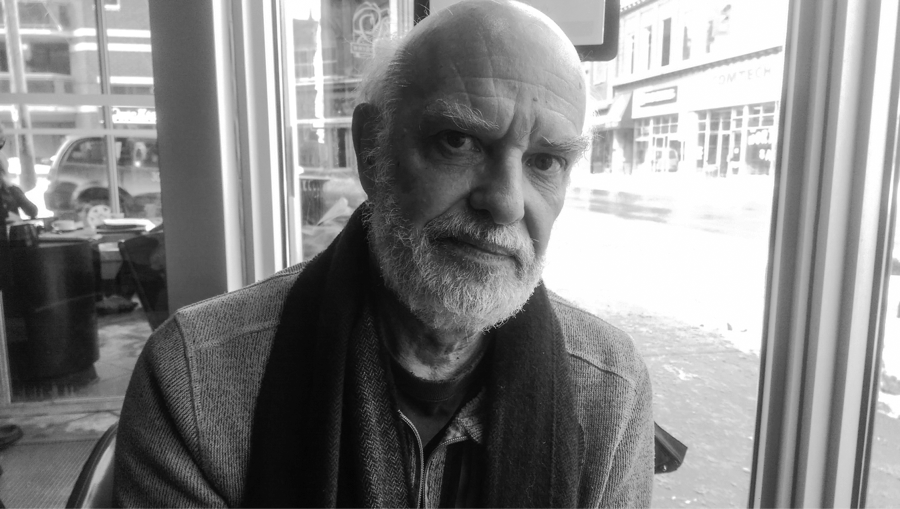 The Monitor 01/03/2015 – In July, after nearly a half-century of defending human rights and civil liberties in Canada and abroad, Roch Tassé will retire, leaving his current post as co-ordinator of the International Civil Liberties Monitoring Group (ICLMG), which he has held since its creation in 2001.
The Monitor 01/03/2015 – In July, after nearly a half-century of defending human rights and civil liberties in Canada and abroad, Roch Tassé will retire, leaving his current post as co-ordinator of the International Civil Liberties Monitoring Group (ICLMG), which he has held since its creation in 2001.
The Franco-Ontarian began his life in activism as a social worker and community organizer in Ottawa’s eastern townships, spending four years in the 1970s with the federally sponsored Company of Young Canadians, a creation of the Trudeau government “to co-opt the activism of the radicals in the late 1960s,” he jokes over a coffee in early February. After the project was disbanded, Roch became the editor of a newspaper serving the francophone community outside of Quebec, where he worked until 1985. That was the year he took responsibility for Inter Pares’s Central America program, which brought him to Nicaragua, El Salvador, Guatemala and eventually Chiapas, Mexico where civil wars had displaced entire communities and state repression was the norm. With a network of NGOs, Roch took part in UN-brokered peace negotiations in the late-1980s that saw the return of refugees, and the reconciliation of warring factions, among them the Contras and Sandinistas in Nicaragua. Read more
Troubled times ahead with new anti-terror legislation
 By Matthew Behrens, rabble.ca 16/02/2015 – Even though the government must know that sections of its legislation may eventually fall victim to a Charter of Rights and Freedoms court challenge, Bill C-51 will nonetheless be a hugely effective tool of repression and control. The mere possibility of charges being laid will have a major chilling effect on whole communities and, especially, community media outlets that might report on home country conflicts in a manner that might conflict with Canada’s foreign policy objectives. There is certainly precedent for this concern. As the International Civil Liberties Monitoring Group reported in a 2003 report, In the Shadow of the Law, there had been “hundreds” of instances where people in Canada “are being visited for interviews by security forces without warrants, and taken away for interrogation. Although the full extent of Bill C-36 [so-called ‘anti-terror’ legislation hurriedly passed by Parliament in 2001] was not implemented in these cases, it has been used as a threat to ‘encourage’ voluntary interviews by citing the risk of preventative detention allowed under the Act. Victims of such police conduct have been afraid to come forward publicly for fear of further retaliation.” Read more
By Matthew Behrens, rabble.ca 16/02/2015 – Even though the government must know that sections of its legislation may eventually fall victim to a Charter of Rights and Freedoms court challenge, Bill C-51 will nonetheless be a hugely effective tool of repression and control. The mere possibility of charges being laid will have a major chilling effect on whole communities and, especially, community media outlets that might report on home country conflicts in a manner that might conflict with Canada’s foreign policy objectives. There is certainly precedent for this concern. As the International Civil Liberties Monitoring Group reported in a 2003 report, In the Shadow of the Law, there had been “hundreds” of instances where people in Canada “are being visited for interviews by security forces without warrants, and taken away for interrogation. Although the full extent of Bill C-36 [so-called ‘anti-terror’ legislation hurriedly passed by Parliament in 2001] was not implemented in these cases, it has been used as a threat to ‘encourage’ voluntary interviews by citing the risk of preventative detention allowed under the Act. Victims of such police conduct have been afraid to come forward publicly for fear of further retaliation.” Read more
Lutte antiterroriste: deux juges mettent Ottawa en garde
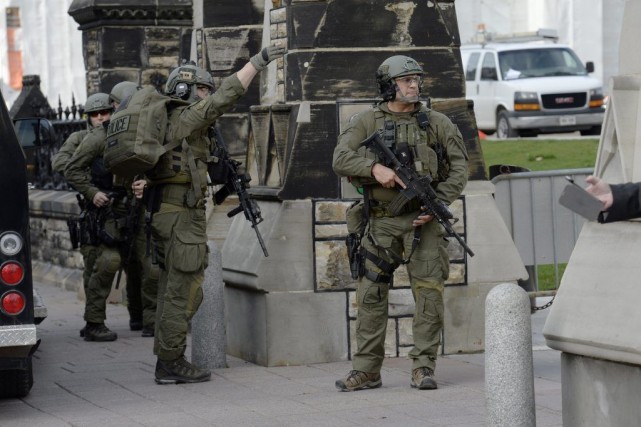 By Laura-Julie Perreault, La Presse 31/10/2014 – Le coordonnateur national de la Coalition pour la surveillance internationale des libertés civiles, Roch Tassé, croit que l’inaction du gouvernement canadien après la commission Arar est une insulte aux citoyens.
By Laura-Julie Perreault, La Presse 31/10/2014 – Le coordonnateur national de la Coalition pour la surveillance internationale des libertés civiles, Roch Tassé, croit que l’inaction du gouvernement canadien après la commission Arar est une insulte aux citoyens.
«Il y a eu deux commissions [sur les droits de la personne et la sécurité nationale], on a dépensé des millions, mais rien n’a changé. La principale recommandation de la commission Arar était de mettre en place un organisme qui serait le chien de garde de la GRC et des services canadiens de renseignement. Non seulement ça n’a pas été fait, mais il y a aujourd’hui moins de surveillance de leur travail qu’avant», a dit M. Tassé en marge de la conférence. Read more
Khadr: Misguided security laws take a human toll
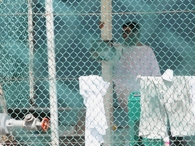 By Omar Khadr, Ottawa Citizen 28/10/2014 – “Ten years ago the Canadian government established a judicial inquiry into the case of Maher Arar. That inquiry, over the course of more than two years of ground-breaking work, examined how Canada’s post-Sept. 11 security practices led to serious human rights violations, including torture. At that same time, 10 years ago and far away from a Canadian hearing room, I was mired in a nightmare of injustice, insidiously linked to national security. I have not yet escaped from that nightmare. As Canada once again grapples with concerns about terrorism, my experience stands as a cautionary reminder. Security laws and practices that are excessive, misguided or tainted by prejudice can have a devastating human toll. A conference Wednesday in Ottawa, convened by Amnesty International, the International Civil Liberties Monitoring Group and the University of Ottawa, will reflect on these past 10 years of national security and human rights. I will be watching, hoping that an avenue opens to leave my decade of injustice behind.” Read more
By Omar Khadr, Ottawa Citizen 28/10/2014 – “Ten years ago the Canadian government established a judicial inquiry into the case of Maher Arar. That inquiry, over the course of more than two years of ground-breaking work, examined how Canada’s post-Sept. 11 security practices led to serious human rights violations, including torture. At that same time, 10 years ago and far away from a Canadian hearing room, I was mired in a nightmare of injustice, insidiously linked to national security. I have not yet escaped from that nightmare. As Canada once again grapples with concerns about terrorism, my experience stands as a cautionary reminder. Security laws and practices that are excessive, misguided or tainted by prejudice can have a devastating human toll. A conference Wednesday in Ottawa, convened by Amnesty International, the International Civil Liberties Monitoring Group and the University of Ottawa, will reflect on these past 10 years of national security and human rights. I will be watching, hoping that an avenue opens to leave my decade of injustice behind.” Read more
Ottawa ne devrait pas criminaliser l’apologie du terrorisme
 By Hélène Buzetti, Le Devoir 25/10/2014 – “Mme Zwibel fait valoir qu’il serait en outre très difficile de tracer les pourtours du type de discours jugé inacceptable. C’est aussi l’avis de Rock Tassé, le coordonnateur national de la Coalition pour la surveillance internationale des libertés civiles. « Quand le journaliste Glenn Greenwald, celui qui a travaillé avec Edward Snowden, écrit que le Canada doit s’attendre à être une cible puisqu’il est en guerre au Moyen-Orient depuis 13 ans, est-ce que ce serait considéré comme l’apologie du terrorisme ?, demande M. Tassé. Quand quelqu’un tenterait d’expliquer pourquoi des Palestiniens posent des actes terroristes en Israël, est ce que ce serait considéré comme une apologie ? Quand on essayerait de comprendre les causes profondes, les root cause, du terrorisme, est-ce que ce serait de l’apologie ? Et qu’en est-il de la liberté de la presse ? Un article qui tenterait d’expliquer le terrorisme serait-il perçu comme une apologie ? Sans compter que cela pose la question de la définition même de ce qu’est le terrorisme…»” Article only accessible to members
By Hélène Buzetti, Le Devoir 25/10/2014 – “Mme Zwibel fait valoir qu’il serait en outre très difficile de tracer les pourtours du type de discours jugé inacceptable. C’est aussi l’avis de Rock Tassé, le coordonnateur national de la Coalition pour la surveillance internationale des libertés civiles. « Quand le journaliste Glenn Greenwald, celui qui a travaillé avec Edward Snowden, écrit que le Canada doit s’attendre à être une cible puisqu’il est en guerre au Moyen-Orient depuis 13 ans, est-ce que ce serait considéré comme l’apologie du terrorisme ?, demande M. Tassé. Quand quelqu’un tenterait d’expliquer pourquoi des Palestiniens posent des actes terroristes en Israël, est ce que ce serait considéré comme une apologie ? Quand on essayerait de comprendre les causes profondes, les root cause, du terrorisme, est-ce que ce serait de l’apologie ? Et qu’en est-il de la liberté de la presse ? Un article qui tenterait d’expliquer le terrorisme serait-il perçu comme une apologie ? Sans compter que cela pose la question de la définition même de ce qu’est le terrorisme…»” Article only accessible to members
Stephen Harper, Khaled Al-Qazzaz needs your help
 The Toronto Star 15/07/2014 – To The Right Honourable Stephen Harper, Prime Minister of Canada: We, the undersigned, are calling upon you as concerned Canadian citizens and organizations to use the full power of your office to demand the immediate release of Canadian permanent resident Khaled Al-Qazzaz who has been illegally detained in Egypt for over 365 days without charge and is in present danger of suffering a heart attack. He should have been promptly charged with a recognizable criminal offence or released. One year is most certainly not prompt. His illegal detention was, in fact, recently extended by an Egyptian court. Your intervention is critical in securing his immediate release and safe return home to Canada. Read more
The Toronto Star 15/07/2014 – To The Right Honourable Stephen Harper, Prime Minister of Canada: We, the undersigned, are calling upon you as concerned Canadian citizens and organizations to use the full power of your office to demand the immediate release of Canadian permanent resident Khaled Al-Qazzaz who has been illegally detained in Egypt for over 365 days without charge and is in present danger of suffering a heart attack. He should have been promptly charged with a recognizable criminal offence or released. One year is most certainly not prompt. His illegal detention was, in fact, recently extended by an Egyptian court. Your intervention is critical in securing his immediate release and safe return home to Canada. Read more
Al-Qazzaz jailed in Egypt: Prominent Canadians urge PM to intervene
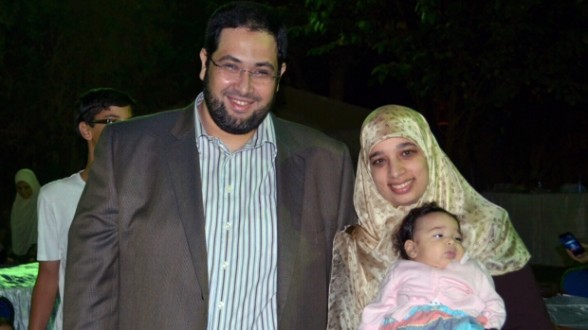 IQRA.ca 15/07/2014 – Today, prominent Canadians stood alongside Canadian Sarah Attia in a press conference at Parliament Hill and presented an open letter to Prime Minister Stephen Harper about the situation of Khaled Al-Qazzaz.
IQRA.ca 15/07/2014 – Today, prominent Canadians stood alongside Canadian Sarah Attia in a press conference at Parliament Hill and presented an open letter to Prime Minister Stephen Harper about the situation of Khaled Al-Qazzaz.
RochTasse, Alex Neve, and Monia Mazigh, signatories of the letter, each shared aspects of the letter and all urged Prime Minister Harper to intervene and end the ordeal that Khaled, Sarah and their four children have lived through for the last 11 months.
“Thank you to the many Canadian lawyers, academics, authors, and activist [signatories] for your support and for standing alongside my family to call for an end to this injustice” said Sarah Attia. The names of the 129 leading Canadians and 6 organizations who signed the letter can be found on the campaign web page. Read more
Mobilisation massive contre la surveillance
 Le Devoir 15/05/2014 – À problème sournois, réponse massive. Un vaste groupe de scientifiques, universitaires et défenseurs des libertés civiles au pays se prépare à dévoiler dans les prochains jours une déclaration commune appelant le gouvernement fédéral à une plus grande retenue en matière de surveillance numérique des citoyens, mais aussi à la mise en place de balises plus claires et transparentes en la matière. Baptisé « Déclaration d’Ottawa sur la surveillance de masse au Canada », le document, dont Le Devoir a pris connaissance, réclame également une mise à jour des lois protégeant la vie privée, lois que les vies numériques sont en train d’éroder.
Le Devoir 15/05/2014 – À problème sournois, réponse massive. Un vaste groupe de scientifiques, universitaires et défenseurs des libertés civiles au pays se prépare à dévoiler dans les prochains jours une déclaration commune appelant le gouvernement fédéral à une plus grande retenue en matière de surveillance numérique des citoyens, mais aussi à la mise en place de balises plus claires et transparentes en la matière. Baptisé « Déclaration d’Ottawa sur la surveillance de masse au Canada », le document, dont Le Devoir a pris connaissance, réclame également une mise à jour des lois protégeant la vie privée, lois que les vies numériques sont en train d’éroder.
Alors que le gouvernement fait face à de nouvelles critiques après l’introduction dans un projet de loi omnibus sur le budget — le C-31 — une disposition facilitant le transfert de données personnelles, sans mandat d’un tribunal, entre l’Agence de revenu et les forces policières, les signataires de cette déclaration n’appellent à rien de moins qu’à la fin immédiate de cette pratique décriée depuis plusieurs années. « Tous les changements législatifs susceptibles de toucher l’information, le droit à la vie privée et à la liberté doivent être présentés, justifiés et débattus dans la transparence, écrivent-ils en substance. Aucun de ces changements, affectant l’encadrement de la vie privée, ne doit être enchâssé dans des projets de loi omnibus ou des règlements liés à d’autres sujets. »
Le sociologue David Lyon, titulaire de la Chaire de recherche et d’études sur la surveillance de l’Université Queen’s, est l’un des signataires de cette déclaration, aux côtés d’Open Media, de l’International Civil Liberties Monitoring Group et de l’Association canadienne des libertés civiles — entre autres. Il estime qu’un tel virage est nécessaire, pas seulement pour redonner confiance aux citoyens dans les institutions publiques, mais également pour s’assurer de ne pas bâtir aujourd’hui une société dans laquelle nous n’allons pas vouloir vivre demain. Read more
Ottawa Statement on Mass Surveillance in Canada
Mohamed Harkat could remain in ‘immigration limbo’ for years
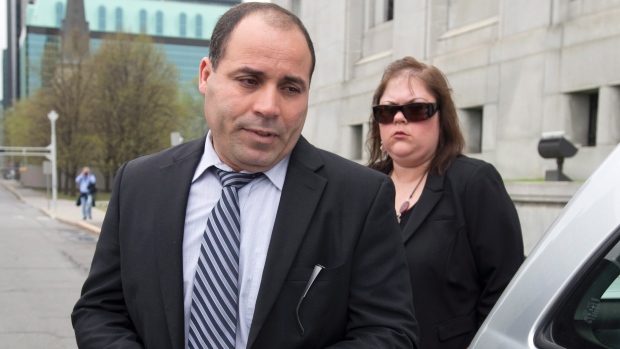 CBC News 15/05/2014 – If Harkat’s application to stay is rejected, he could challenge the decision by way of judicial review in Federal Court. But he would have to allege there was some kind of procedural irregularity in the decision.
CBC News 15/05/2014 – If Harkat’s application to stay is rejected, he could challenge the decision by way of judicial review in Federal Court. But he would have to allege there was some kind of procedural irregularity in the decision.
“It’s very hard to actually challenge the merits,” Aiken said.
If the judge believed a procedural error had occurred, the case could be bounced back and forth between the Federal Court and the Immigration Department for an extended period of time, Aiken said. From there, it’s possible the case could make its way to the Federal Court of Appeal and finally the Supreme Court of Canada. But Aiken, who was counsel for the Canadian Council for Refugees and International Civil Liberties Monitoring Group, which intervened in the Harkat case, said Harkat will not have endless routes of redress. Read more
Column: Don’t care about surveillance? You’re probably white and middle class
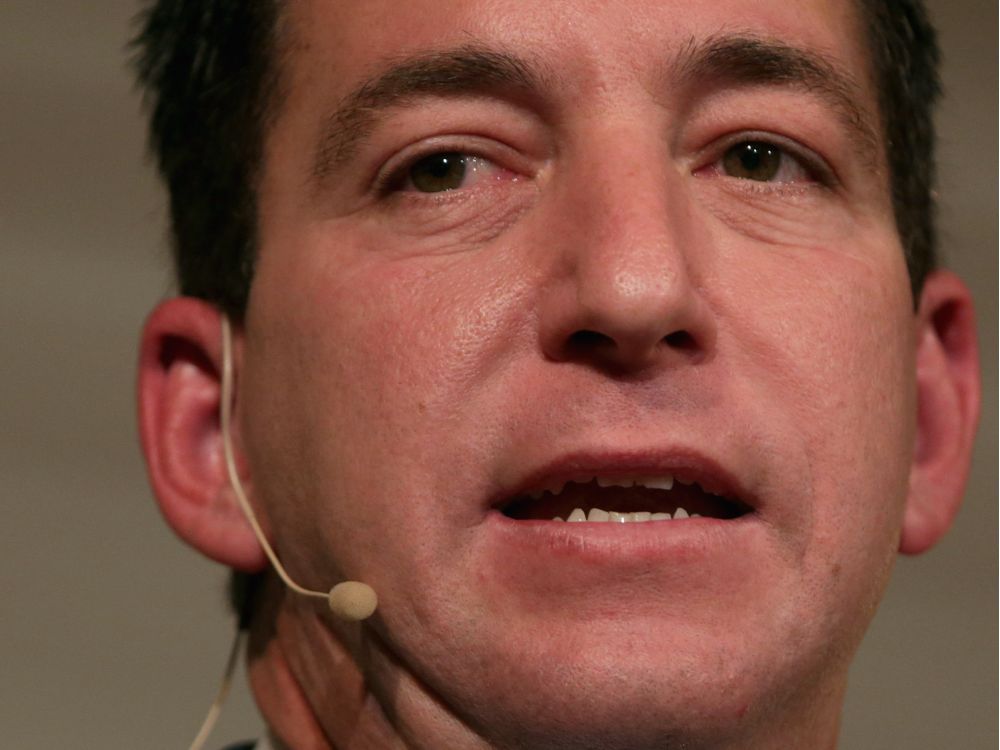 Ottawa Citizen 15/05/2014 – It’s no surprise that minorities are fearful of authority when they are the most targeted and least able to protect themselves. A study from The Pew Internet and American Life Project found that African-Americans and Hispanics with Internet access were more concerned about online privacy than white people.
Ottawa Citizen 15/05/2014 – It’s no surprise that minorities are fearful of authority when they are the most targeted and least able to protect themselves. A study from The Pew Internet and American Life Project found that African-Americans and Hispanics with Internet access were more concerned about online privacy than white people.
While privileged populations often laud surveillance measures as a way to fight terrorism, minorities are burdened by the results. Ask the Middle Eastern man with a beard who gets treated like Maher Arar at the border about his thoughts on privacy. And government infringement is only getting worse. The International Civil Liberties Monitoring Group (ICLMG) issued a report that describes how the more than 17 border control programs now in place are disproportionately aimed at certain ethnic groups.
From a social justice perspective, we should care that fellow Canadians are being targeted. But there’s also a more selfish reason. As government spying becomes more sinister, privilege is not a get-out-of-surveillance-free card. The “I-have-nothing-to-fear” defence should be qualified with “until I don’t.” Government has a nasty habit of extending its reach over time. That’s a reality none of us should hide from. Read more
Mohamed Harkat “dévasté”
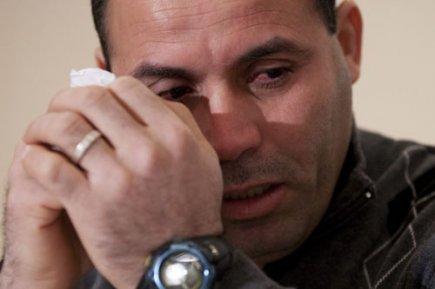 Le Journal de Montréal 14/05/2014 – Le Conseil canadien pour les réfugiés (CCR) et la Coalition pour la surveillance internationale des libertés civiles (CSILC) se sont dits déçus du jugement de la Cour suprême dans l’affaire Harkat.
Le Journal de Montréal 14/05/2014 – Le Conseil canadien pour les réfugiés (CCR) et la Coalition pour la surveillance internationale des libertés civiles (CSILC) se sont dits déçus du jugement de la Cour suprême dans l’affaire Harkat.
Selon ces deux organisations, le jugement maintient «un processus fondamentalement injuste s’appuyant sur des preuves secrètes pour décider d’expulser un non-citoyen, potentiellement vers un risque de torture.»
«Le CCR et la CSILC regrettent que cette décision affirme l’inégalité de la protection des droits fondamentaux offerte aux non-citoyens. Lorsque ces droits sont en jeu pour les citoyens, comme dans les procédures pénales, nous ne tolérons pas l’utilisation de preuves secrètes. Les non-citoyens méritent une chance égale de connaître les preuves utilisées contre eux, et d’y répondre», précisent le CCR et la CSILC dans un communiqué, tout en relevant que la Cour «ne s’est pas prononcée sur les aspects discriminatoires de ces dispositions». Read more
La Cour suprême maintient le certificat de sécurité contre Harkat
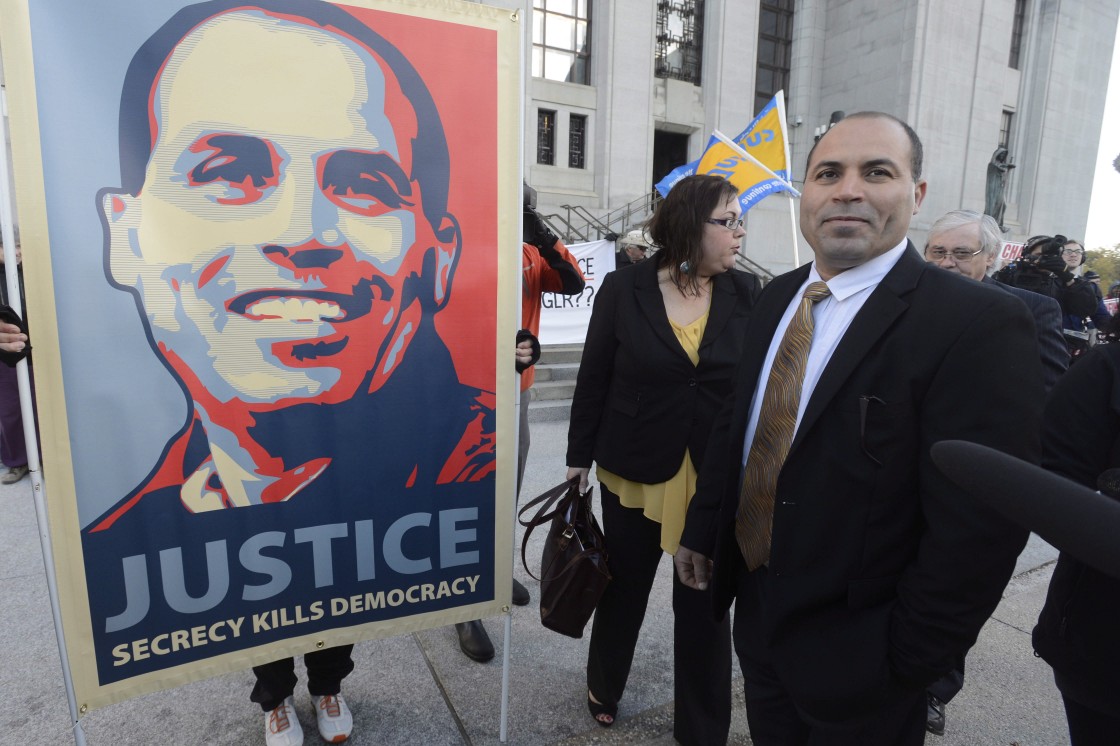 La Presse 14/05/2014 – Le Conseil canadien pour les réfugiés (CCR) et la Coalition pour la surveillance internationale des libertés civiles (CSILC) se sont dits conjointement déçus, mercredi, de la décision de la Cour suprême, «qui maintient un processus fondamentalement injuste s’appuyant sur des preuves secrètes pour décider d’expulser un non-citoyen, potentiellement vers un risque de torture». Les organismes considèrent que cela démontre l’inégalité de la protection des droits fondamentaux offerte aux non-citoyens du Canada.
La Presse 14/05/2014 – Le Conseil canadien pour les réfugiés (CCR) et la Coalition pour la surveillance internationale des libertés civiles (CSILC) se sont dits conjointement déçus, mercredi, de la décision de la Cour suprême, «qui maintient un processus fondamentalement injuste s’appuyant sur des preuves secrètes pour décider d’expulser un non-citoyen, potentiellement vers un risque de torture». Les organismes considèrent que cela démontre l’inégalité de la protection des droits fondamentaux offerte aux non-citoyens du Canada.
«Lorsque ces droits sont en jeu pour les citoyens, comme dans les procédures pénales, nous ne tolérons pas l’utilisation de preuves secrètes. Les non-citoyens méritent une chance égale de connaître les preuves utilisées contre eux, et d’y répondre», ont-ils indiqué dans un communiqué commun. Read more
Supreme Court upholds security certificates
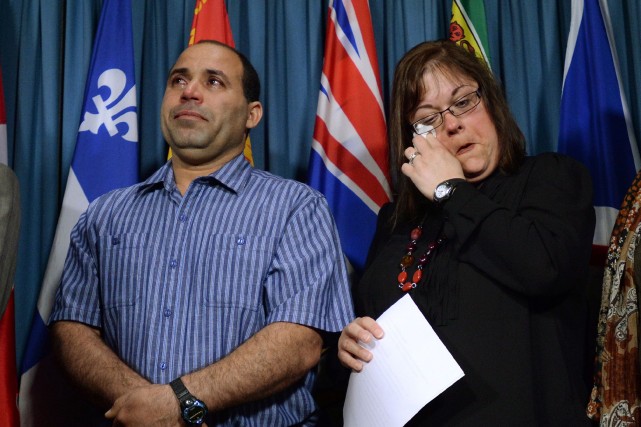 Globe and Mail 14/05/2014 – Canada’s top court has upheld a tough anti-terrorism law aimed at deporting foreign suspects, ruling that its saving grace is the ability of judges to keep an eye out for unfairness.
Globe and Mail 14/05/2014 – Canada’s top court has upheld a tough anti-terrorism law aimed at deporting foreign suspects, ruling that its saving grace is the ability of judges to keep an eye out for unfairness.
“The discretion granted to designated judges is the crucial ingredient that allows the proceedings to remain fair from beginning to end,” Chief Justice Beverley McLachlin wrote for a unanimous court decision about the federal security certificate system.
Public Safety Minister Steven Blaney expressed satisfaction with the overall ruling, but the Canadian Council for Refugees and the International Civil Liberties Monitoring Group said it leaves in place a fundamentally unfair process that relies on secret evidence. Read more
Une bourse pour un étudiant engagé
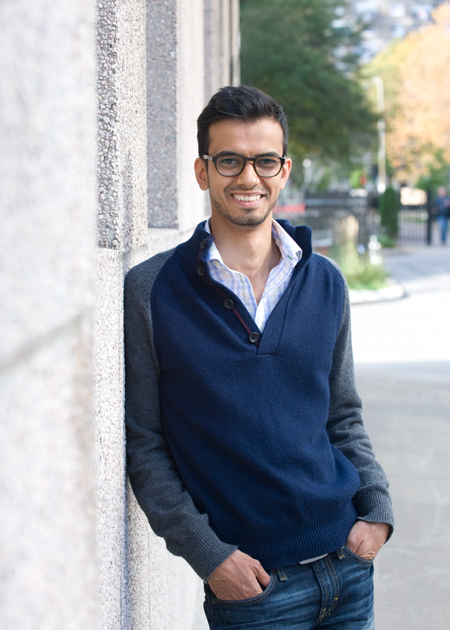 Droit-Inc 17/04/2014 – Le Département des sciences juridiques de l’université du Québec à Montréal (UQAM) a décerné, le 14 avril dernier, la bourse Juanita Westmoreland-Traoré à Sameer Zuberi, étudiant au baccalauréat en droit à l’UQAM. Cette bourse, d’un montant de 3000$, devra lui servir à utiliser sa formation comme un outil de changement au service de la communauté. Elle est décernée en l’honneur de Juanita Westmoreland-Traoré, juge retraitée de la Cour du Québec, qui a joué un rôle important dans la promotion des droits de la personne, de la justice sociale et du droit à l’égalité. Elle est la première femme noire à avoir accédé à la magistrature au Québec et à avoir été doyenne d’une faculté de droit au Canada, celle de l’Université de Windsor. Sameer Zuberi, a obtenu en 2004 un baccalauréat en mathématiques de l’Université Concordia. Il est membre actif du Forum musulman canadien et de la Coalition pour la surveillance internationale des libertés civiles. Read more
Droit-Inc 17/04/2014 – Le Département des sciences juridiques de l’université du Québec à Montréal (UQAM) a décerné, le 14 avril dernier, la bourse Juanita Westmoreland-Traoré à Sameer Zuberi, étudiant au baccalauréat en droit à l’UQAM. Cette bourse, d’un montant de 3000$, devra lui servir à utiliser sa formation comme un outil de changement au service de la communauté. Elle est décernée en l’honneur de Juanita Westmoreland-Traoré, juge retraitée de la Cour du Québec, qui a joué un rôle important dans la promotion des droits de la personne, de la justice sociale et du droit à l’égalité. Elle est la première femme noire à avoir accédé à la magistrature au Québec et à avoir été doyenne d’une faculté de droit au Canada, celle de l’Université de Windsor. Sameer Zuberi, a obtenu en 2004 un baccalauréat en mathématiques de l’Université Concordia. Il est membre actif du Forum musulman canadien et de la Coalition pour la surveillance internationale des libertés civiles. Read more
Êtes-vous préoccupés par les atteintes aux libertés civiles?
 L’Express de Toronto 21/01/2014 – Créée à la suite des attentats terroristes de septembre 2001 aux États-Unis, cette Coalition pour la surveillance internationale des libertés civiles regroupe une quarantaine d’organismes non gouvernementaux, syndicats, associations professionnelles, groupes confessionnels, organisations environnementales, de protection des droits humains et des libertés civiles, ainsi que des groupes représentant des communautés immigrantes et réfugiées au Canada. Chaque semaine, la Coalition diffuse gratuitement, par Internet, sa Revue de l’actualité, une rétrospective des nouvelles importantes concernant la sécurité nationale, la lutte contre le terrorisme et d’autres questions connexes. Si les atteintes aux libertés civiles vous préoccupent, vous avez intérêt à demander à recevoir cette documentation hebdomadaire. Read more
L’Express de Toronto 21/01/2014 – Créée à la suite des attentats terroristes de septembre 2001 aux États-Unis, cette Coalition pour la surveillance internationale des libertés civiles regroupe une quarantaine d’organismes non gouvernementaux, syndicats, associations professionnelles, groupes confessionnels, organisations environnementales, de protection des droits humains et des libertés civiles, ainsi que des groupes représentant des communautés immigrantes et réfugiées au Canada. Chaque semaine, la Coalition diffuse gratuitement, par Internet, sa Revue de l’actualité, une rétrospective des nouvelles importantes concernant la sécurité nationale, la lutte contre le terrorisme et d’autres questions connexes. Si les atteintes aux libertés civiles vous préoccupent, vous avez intérêt à demander à recevoir cette documentation hebdomadaire. Read more
The Human Cost of Killer Drones
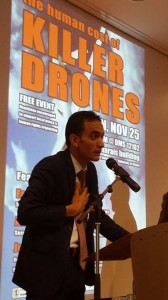 Muslim Link 08/12/2013 – The Desmarais building at the University of Ottawa was the site for a moving presentation on November 25 about drone aircraft and the frightening toll they are taking on the civilian populations in Yemen, Pakistan, and other nations. About two hundred people attended the presentation and many more listened in and participated online. Organized by the Canadian Peace Alliance, the Ottawa Peace Assembly, and the International Civil Liberties Monitoring Group (ICMLG), the talk took place at the Human Rights Research and Education Centre.
Muslim Link 08/12/2013 – The Desmarais building at the University of Ottawa was the site for a moving presentation on November 25 about drone aircraft and the frightening toll they are taking on the civilian populations in Yemen, Pakistan, and other nations. About two hundred people attended the presentation and many more listened in and participated online. Organized by the Canadian Peace Alliance, the Ottawa Peace Assembly, and the International Civil Liberties Monitoring Group (ICMLG), the talk took place at the Human Rights Research and Education Centre.
Farea Al-Muslimi, a Yemeni youth activist and writer, was the keynote speaker for the evening. Al Muslimi is the son of farmers in a rural, mountainous section of Yemen called Wasab, 200 kilometers south of the nation’s capital, Sana’a. Due to his tireless crusade against the use of armed drones, and his recent testimony in Washington where he lobbied against drone use, Al-Muslimi has come to be known as “the man who made Obama admit the use of drones.” Read more
Know your government!
By Gerry Caplan, rabble.ca 16/09/2013 – I’ve often referred in these columns to some of my reliable authorities — the Canadian Centre for Policy Alternatives, the Rideau Institute, The Daily Show — but let me introduce here three others that I find indispensable. In no particular order: Anyone apprehensive about how our liberties are being eroded before our very eyes — secret surveillance, the punishment of dissent — should not miss the weekly News Digest issued by the International Civil Liberties Monitoring Group. Despite its name, the ICLMG is an all-Canadian coalition of 38 national civil society organizations that focuses both on Canada and elsewhere. The digest publishes “news articles, events, calls to action and much more regarding national security, anti-terrorism, civil liberties and other issues related to the mandate and concerns of ICLMG and its member organizations.” The 38 members are a Who’s Who of progressive, activist Canada, and among them they represent just about every decent tendency in the country, including representatives of Muslims, Jews and Christians, trade unions, students, profs, lawyers, NGOs, refugees, environmentalists and any other virtuous groups you can think of. When Harperland compiles its “enemies list,” it surely includes most of the 38 — a badge of honour by any reckoning. Read more
Civil liberties, pro-democracy, privacy rights, and open Internet groups call for answers on secret government spying program
![]() rabble.ca 11/06/2013 – A group of organizations focused on civil liberties, pro-democracy, privacy rights, and open access to the Internet have joined to together to demand answers and immediate action from the government after it was revealed that a secretive government agency has been spying on the telephone and Internet activities of individuals, including law-abiding Canadians. The organizations speaking out today include the BC Freedom of Information and Privacy Association (BCFIPA), Council of Canadians, International Civil Liberties Monitoring Group, Leadnow, OpenMedia.ca, Privacy & Access Council of Canada, the Rocky Mountain Civil Liberties Association, and the Samuelson-Glushko Canadian Internet Policy and Public Interest Clinic (CIPPIC). OpenMedia.ca worked with many of these same organizations to host the StopSpying.ca campaign that successfully defeated the government’s online spying bill C-30. Read more
rabble.ca 11/06/2013 – A group of organizations focused on civil liberties, pro-democracy, privacy rights, and open access to the Internet have joined to together to demand answers and immediate action from the government after it was revealed that a secretive government agency has been spying on the telephone and Internet activities of individuals, including law-abiding Canadians. The organizations speaking out today include the BC Freedom of Information and Privacy Association (BCFIPA), Council of Canadians, International Civil Liberties Monitoring Group, Leadnow, OpenMedia.ca, Privacy & Access Council of Canada, the Rocky Mountain Civil Liberties Association, and the Samuelson-Glushko Canadian Internet Policy and Public Interest Clinic (CIPPIC). OpenMedia.ca worked with many of these same organizations to host the StopSpying.ca campaign that successfully defeated the government’s online spying bill C-30. Read more
CPAC Revue Politique on Bill S-7
 CPAC 24/04/2013 – Pierre Donais welcomes MPs from the three main parties in the House of Commons for a discussion on topics highlighted in Parliament today. The International Civil Liberties Monitoring Group has once again asked federal MPs to reject Bill S-7, which deals with the fight against terrorism. Roch Tassé, the national coordinator, explains his organization’s objections to this legislation. Watch the interview
CPAC 24/04/2013 – Pierre Donais welcomes MPs from the three main parties in the House of Commons for a discussion on topics highlighted in Parliament today. The International Civil Liberties Monitoring Group has once again asked federal MPs to reject Bill S-7, which deals with the fight against terrorism. Roch Tassé, the national coordinator, explains his organization’s objections to this legislation. Watch the interview
Other interviews on Bill S-7:
- April 24, 2013 – Interview for CTV News (TV)
- April 24, 2013 – Interview for Humber College Community Radio in Toronto (Radio)
- April 30, 2013 – Interview for the OPIRG Root Radio show on CKCU 93.1 FM (Radio)
Critics say biometric borders threaten civil liberties
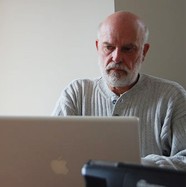 Capital News Online 01/02/2013 – A new biometric system designed to screen temporary residents entering Canada has come under fire from the NDP and activists who warn that data-sharing with the U.S. threatens civil liberties and signals a dystopic future. “If you’ve never committed a crime, you have the right under the Charter to be anonymous from the state, unless you’re doing an operation that requires a permit, like driving a car,” says Roch Tassé, coordinator of the Ottawa-based International Civil Liberties Monitoring Group, a coalition that includes Amnesty International and other human rights groups. Read more
Capital News Online 01/02/2013 – A new biometric system designed to screen temporary residents entering Canada has come under fire from the NDP and activists who warn that data-sharing with the U.S. threatens civil liberties and signals a dystopic future. “If you’ve never committed a crime, you have the right under the Charter to be anonymous from the state, unless you’re doing an operation that requires a permit, like driving a car,” says Roch Tassé, coordinator of the Ottawa-based International Civil Liberties Monitoring Group, a coalition that includes Amnesty International and other human rights groups. Read more
Harkat’s press conference on Parliament Hill
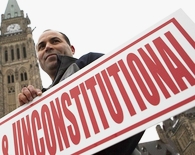 YouTube 10/12/2012 – Today marks the 10th anniversary of Mohamed Harkat’s arrest under a security certificate. Ironically, it is also International Human Rights Day. ICLMG was on Parliament Hill with Mohamed Harkat, his family, Hilary Homes from Amnesty International, Ihsaan Gardee from CAIR-CAN, Randall Garrison, the NDP Public Safety critic and Elizabeth May, leader of the Green Party to denounce the security certificate regime and demand that this human rights violation stops. Watch the video
YouTube 10/12/2012 – Today marks the 10th anniversary of Mohamed Harkat’s arrest under a security certificate. Ironically, it is also International Human Rights Day. ICLMG was on Parliament Hill with Mohamed Harkat, his family, Hilary Homes from Amnesty International, Ihsaan Gardee from CAIR-CAN, Randall Garrison, the NDP Public Safety critic and Elizabeth May, leader of the Green Party to denounce the security certificate regime and demand that this human rights violation stops. Watch the video
Travellers faced rude officers, incorrect accusations by border employees
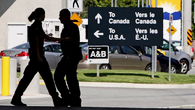 The Canadian Press 04/09/2012 – Roch Tasse, the national co-ordinator of ICLMG, said the complaints system should be shifted to an independent agency and more complete descriptions provided to the public. “Surely there’s enough information in the system, or there should be if there’s not, to show you’re not the same person,” he said in an interview. “What are the odds that you have the same birth date, live in the same city … I don’t know why we have those incidents.” Tasse said his group’s reviews of border incidents two years ago showed more serious incidents and he questions if the internal review system is effective. “We’re dealing here with an internal complaints system, not an independent body. So regardless of the content and the outcome, this is an agency investigating itself following complaints,” he said. Read more
The Canadian Press 04/09/2012 – Roch Tasse, the national co-ordinator of ICLMG, said the complaints system should be shifted to an independent agency and more complete descriptions provided to the public. “Surely there’s enough information in the system, or there should be if there’s not, to show you’re not the same person,” he said in an interview. “What are the odds that you have the same birth date, live in the same city … I don’t know why we have those incidents.” Tasse said his group’s reviews of border incidents two years ago showed more serious incidents and he questions if the internal review system is effective. “We’re dealing here with an internal complaints system, not an independent body. So regardless of the content and the outcome, this is an agency investigating itself following complaints,” he said. Read more
Notes detail Canada-U.S. plan to track refugees, travellers
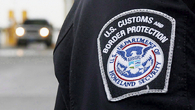 The Canadian Press 11/07/2012 – Canada and the U.S. have appreciably different ways of dealing with some kinds of refugees, said Roch Tasse of the Ottawa-based International Civil Liberties Monitoring Group. “This raises flags as to what they will agree on down the road,” Tasse said in an interview. “We know that the Safe Third Country Agreement is already problematic. There are people who would be eligible in Canada that are not eligible in the U.S. But, because they arrived through the U.S., (they) are refused into Canada, and the U.S. deals with them the way they want.” The two countries will also begin automatically sharing information by 2014 about people booted out for criminal behaviour. Read more
The Canadian Press 11/07/2012 – Canada and the U.S. have appreciably different ways of dealing with some kinds of refugees, said Roch Tasse of the Ottawa-based International Civil Liberties Monitoring Group. “This raises flags as to what they will agree on down the road,” Tasse said in an interview. “We know that the Safe Third Country Agreement is already problematic. There are people who would be eligible in Canada that are not eligible in the U.S. But, because they arrived through the U.S., (they) are refused into Canada, and the U.S. deals with them the way they want.” The two countries will also begin automatically sharing information by 2014 about people booted out for criminal behaviour. Read more
Activists demand the abolition of security certificates
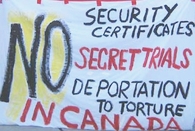 Prism Magazine 16/02/2012 – Human rights activists, joined by the Green Party Leader Elizabeth May, announce at a press conference that was held on Parliament Hill their opposition to the continued use of security certificate cases in Canada. In attendance were: Matthew Behrens, Human Rights Activist, Alex Neve, Secretary General of Amnesty International Canada, Roch Tasse, ICLMG Coordinator, Nour El-Kadri, VP of the Canadian Arab Federation, and Elizabeth May, Leader of the Green Party. Watch the video
Prism Magazine 16/02/2012 – Human rights activists, joined by the Green Party Leader Elizabeth May, announce at a press conference that was held on Parliament Hill their opposition to the continued use of security certificate cases in Canada. In attendance were: Matthew Behrens, Human Rights Activist, Alex Neve, Secretary General of Amnesty International Canada, Roch Tasse, ICLMG Coordinator, Nour El-Kadri, VP of the Canadian Arab Federation, and Elizabeth May, Leader of the Green Party. Watch the video
Canada : La police pourra épier les internautes sans mandat
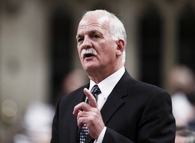 Le Devoir 15/02/2012 – Les défenseurs des libertés civiles craignent ce projet de loi. «Ça semble assez inoffensif comme ça, mais ça vient décupler les capacités des instances gouvernementales pour surveiller les individus, résume Roch Tassé, coordonnateur de la Coalition pour la surveillance internationale des libertés civiles. Le niveau de protection de la vie privée est moins élevé dans ce cadre que dans celui qui régit la surveillance des conversations téléphoniques. Cela va permettre à des services de renseignement d’aller à la pêche [à l’information]. On pourrait s’en servir pour espionner des journalistes et leurs sources, pour faire la cartographie des relations d’un individu, et ce, sans supervision judiciaire…» Read more
Le Devoir 15/02/2012 – Les défenseurs des libertés civiles craignent ce projet de loi. «Ça semble assez inoffensif comme ça, mais ça vient décupler les capacités des instances gouvernementales pour surveiller les individus, résume Roch Tassé, coordonnateur de la Coalition pour la surveillance internationale des libertés civiles. Le niveau de protection de la vie privée est moins élevé dans ce cadre que dans celui qui régit la surveillance des conversations téléphoniques. Cela va permettre à des services de renseignement d’aller à la pêche [à l’information]. On pourrait s’en servir pour espionner des journalistes et leurs sources, pour faire la cartographie des relations d’un individu, et ce, sans supervision judiciaire…» Read more
Frontière canado-américaine: inquiétudes pour la protection de la vie privée
 La Presse 08/12/2011 – Des groupes de défense des libertés civiles s’inquiètent au plus haut point des implications du plan de périmètre de sécurité présenté hier par les gouvernements canadien et américain. «On n’a jamais vu, dans une seule annonce, une érosion aussi grande et aussi globale des normes historiques et des protections que l’on connaît selon nos normes canadiennes», a dénoncé Roch Tassé, porte-parole de la Coalition pour la surveillance internationale des libertés civiles. Read more
La Presse 08/12/2011 – Des groupes de défense des libertés civiles s’inquiètent au plus haut point des implications du plan de périmètre de sécurité présenté hier par les gouvernements canadien et américain. «On n’a jamais vu, dans une seule annonce, une érosion aussi grande et aussi globale des normes historiques et des protections que l’on connaît selon nos normes canadiennes», a dénoncé Roch Tassé, porte-parole de la Coalition pour la surveillance internationale des libertés civiles. Read more
La parole à Roch Tassé, coordonnateur de la CSILC
 Métro 29/01/2010 – Quelle forme prend la surveillance que vous dénoncez? On laisse des traces quand on fait des opérations bancaires. Si votre cellulaire est muni d’un GPS, on peut savoir où vous êtes. En examinant vos amis sur Facebook, on peut analyser votre réseau. Les entreprises de crédit ont l’historique de vos transactions financières; bref, on peut déterminer votre style de vie. Mais au-delà de tout ça, il existe des banques de données où on vous fiche carrément. Read more
Métro 29/01/2010 – Quelle forme prend la surveillance que vous dénoncez? On laisse des traces quand on fait des opérations bancaires. Si votre cellulaire est muni d’un GPS, on peut savoir où vous êtes. En examinant vos amis sur Facebook, on peut analyser votre réseau. Les entreprises de crédit ont l’historique de vos transactions financières; bref, on peut déterminer votre style de vie. Mais au-delà de tout ça, il existe des banques de données où on vous fiche carrément. Read more
Québec : Le permis de conduire à puce fait débat
 Codeclic.com 25/03/2009 – Nous vous en parlions avant-hier, le permis de conduire « plus » devrait être disponible dès le 1er Juin dans la province québécoise. Néanmoins, ce permis ne fait pas l’unanimité. En cause ? la puce intégrée à l’intérieur du précieux document. En effet, de nombreuses organisations militant pour la défense des consommateurs et du droit à la vie privée dénoncent les dérives que pourraient entraîner l’utilisation de la puce d’identification. Selon monsieur Roch Tassé (porte-parole de la Coalition pour la surveillance internationale des libertés civiles), « Les permis de conduire Plus ne nous protégeront pas du terrorisme, ils n’accéléreront pas la circulation aux frontières, mais ils soulèveront de graves questions quant à la protection de la vie privée. ». Le débat reste ouvert. Read more
Codeclic.com 25/03/2009 – Nous vous en parlions avant-hier, le permis de conduire « plus » devrait être disponible dès le 1er Juin dans la province québécoise. Néanmoins, ce permis ne fait pas l’unanimité. En cause ? la puce intégrée à l’intérieur du précieux document. En effet, de nombreuses organisations militant pour la défense des consommateurs et du droit à la vie privée dénoncent les dérives que pourraient entraîner l’utilisation de la puce d’identification. Selon monsieur Roch Tassé (porte-parole de la Coalition pour la surveillance internationale des libertés civiles), « Les permis de conduire Plus ne nous protégeront pas du terrorisme, ils n’accéléreront pas la circulation aux frontières, mais ils soulèveront de graves questions quant à la protection de la vie privée. ». Le débat reste ouvert. Read more


 Radio-Canada 05/04/2017 – Notre coordonnateur national, Tim McSorley, a commenté le passage en troisième lecture de C-22, un projet de loi visant la création d’un Comité de parlementaires pour surveiller la sécurité nationale et le renseignement, malgré ses nombreux défauts et lacunes. M. McSorley a été interviewé à la première chaîne de Radio-Canada pour les émissions du retour à la maison de Rimouski,
Radio-Canada 05/04/2017 – Notre coordonnateur national, Tim McSorley, a commenté le passage en troisième lecture de C-22, un projet de loi visant la création d’un Comité de parlementaires pour surveiller la sécurité nationale et le renseignement, malgré ses nombreux défauts et lacunes. M. McSorley a été interviewé à la première chaîne de Radio-Canada pour les émissions du retour à la maison de Rimouski, 